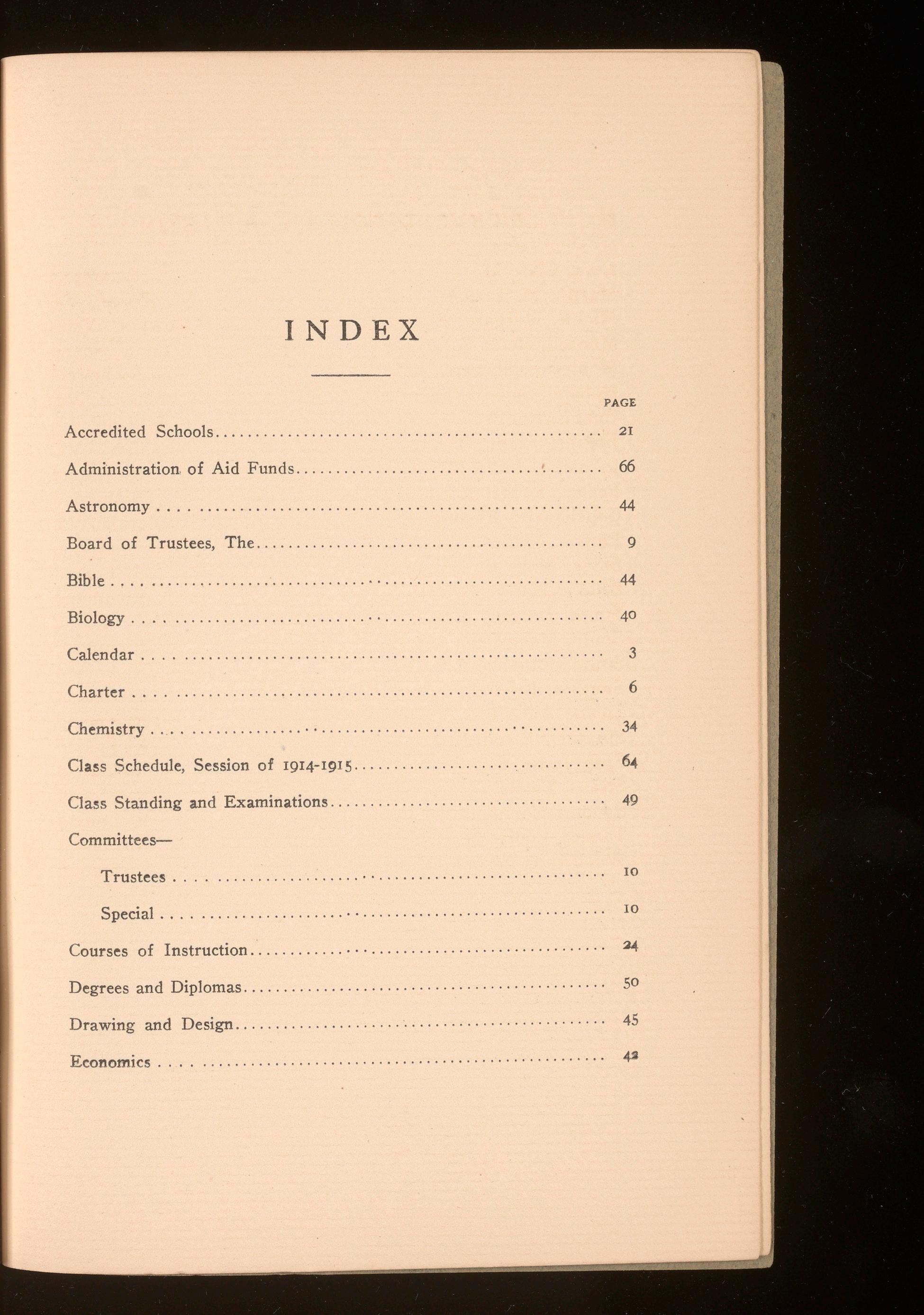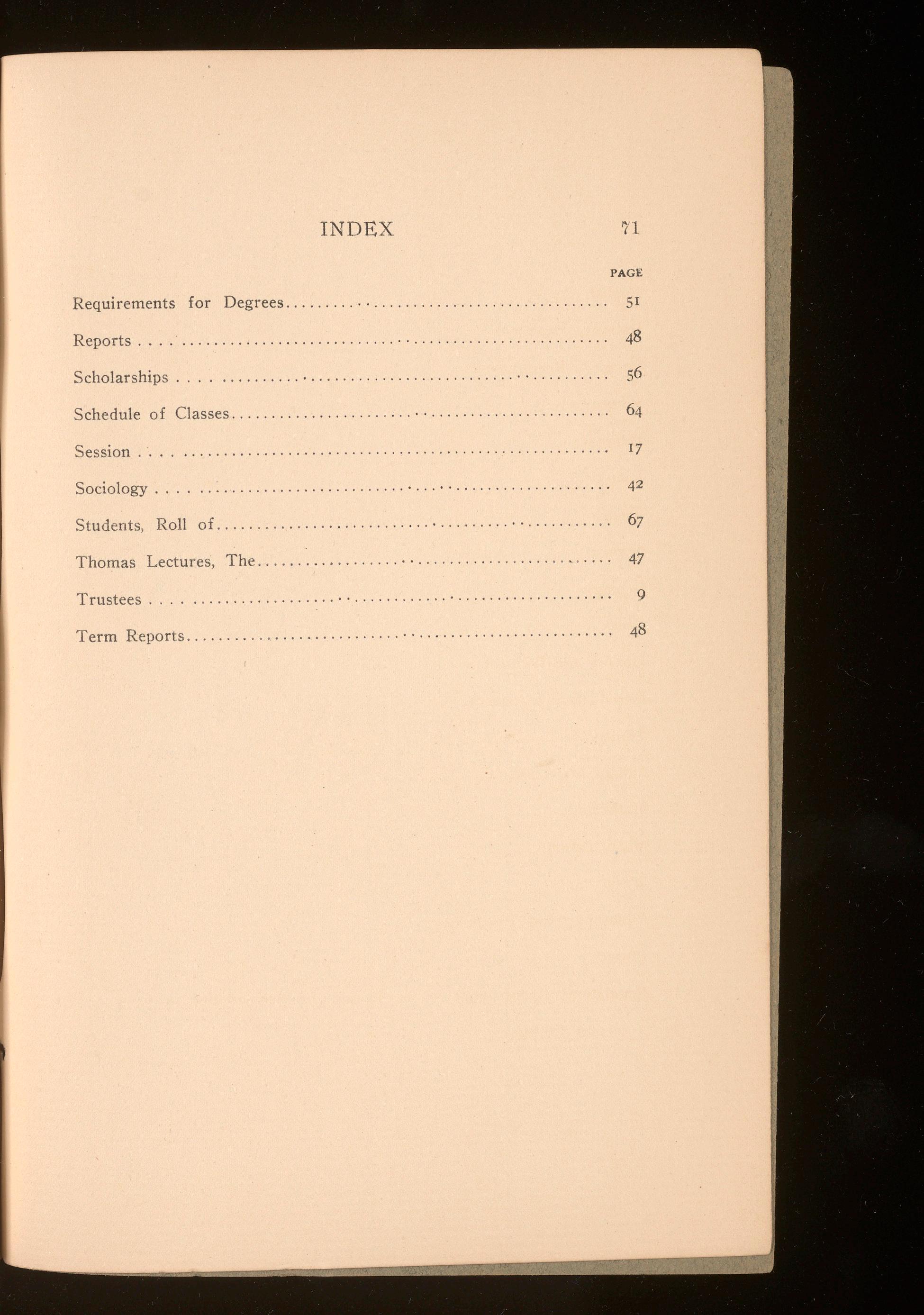
Vol. XVI MAY, 1914 No~ 1


Vol. XVI MAY, 1914 No~ 1
CONTAINING THE CATALOGUE OF WE .STHAMPTQN COLLEGE · A COLLEGE FOR WOMEN CO-ORDINATE WITH RICHMOND COLLEGE FOR MEN PUBLISHED QUARTERLY I
Entered at Postoffice at Richmond, Va;, as second-class mail, matter , j

With Announcements for the First Session, 1914-15 1914 L.
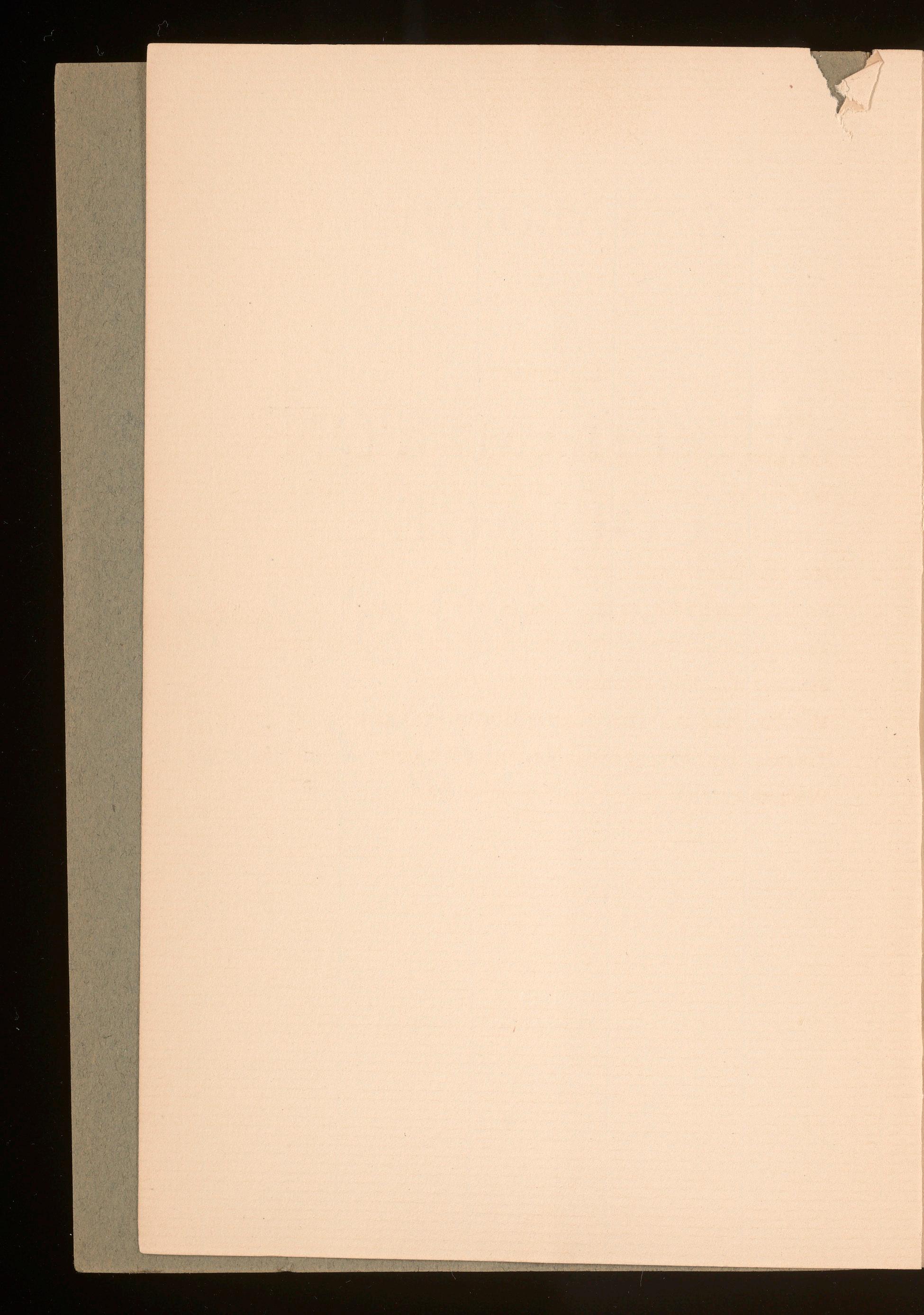

1914
Thursday, September 17th.-Opening of the Session.
Wednesday, December 23rd, 12 M.-Close of Fall Term.
1915
Monday, January 4th, 9 :00 A. M.-Beginning of Winter Term ..
Friday, March 26th, 12 M.-Close of Winter Term.
Tuesday, March 30th, 9 :00 A. M.-Beginning of Spring Term :..
Sunday, June 6th.-Commencement Sermon.
Monday, June 7th.-Exercises of Graduating Class.
Tuesday, June 8th.-Annual Meeting of Trustees.
Wednesday, June 9th.-Commencement Day.
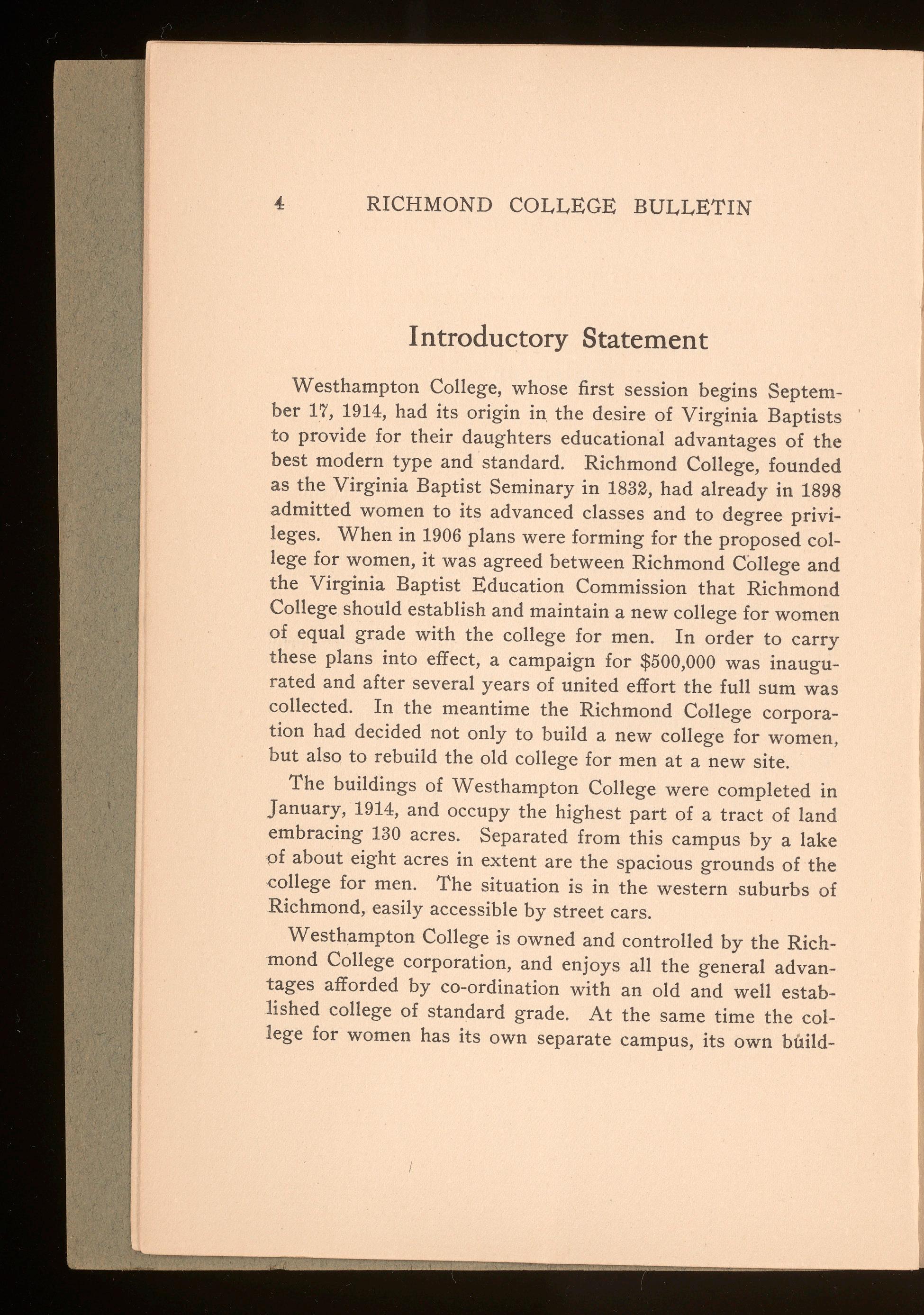
Westhampton College, whose first session begins Septem- ber 17, 1914, had its origin in. the desire of Virginia Baptists to provide for their daughters educational advantages of the best modern type and standard. Richmond College, founded as the Virginia Baptist Seminary in 1832, had already in 1898 admitted women to its advanced classes and to degree privileges. When in 1906 plans were forming for the proposed college for women, it was agreed between Richmond College and the Virginia Baptist Education Commission that Richmond College should establish and maintain a new college for women of equal grade with the college for men. In order to carry these plans into effect, a campaign for $500,000 was inaugu- rated and after several years of united effort the full sum was collected. In the meantime the Richmond College corporation had decided not only to build a new college for women, but also to rebuild the old college for men at a new site.
The buildings of Westhampton College were completed in January, 1914, and occupy the highest part of a tract of land embracing 130 acres. Separated from this campus by a lake pf about eight acres in extent are the spacious grounds of the college for men. The situation is in the western suburbs of Richmond, easily accessible by street cars.
Westhampton College is owned and controlled by the Richmond College corporation, and enjoys all the general advan- tages afforded by co-ordination with an old and well established college of standard grade. At the same time the college for women has its own separate campus, its own build-

ings, and its independent institutional life. While many professors will teach in both colleges, instruction will be altogether separate, and women will at no time be taught in classes with men. The internal administration of W esthampton College is immediately in charge of a woman dean, and both men and women teach in the faculty.
The grounds, buildings, and equipment of Westhampton College are valued at $400,000, and the college shares largely in the benefit of the million dollar endowment held by the Richmond College corporation. The buildings, of Gothic architecture, are most substantially constructed. The framework is steel set in concrete. All floors are of reinforced concrete, and partitions are of brick or hollow tile. The stairways are of steel with slate treads, the window frames of concrete stone and the sash of bronze. The appointments throughout are of the very best. Safety, health, and comfort of students have everywhere been considered.
(As amended March 3, 1914.)

Be it Resolved:
1. That there be, and is hereby established at, or near the City of Richmond, an institution of learning for the instruction of youth in the various branches of science, literature, philosophy, law, and the liberal and useful arts, which shall ,consist of two co-ordinate colleges, one for the education of men, to be known by the name of Richmond College, and the ,other for the education of women, to be known by the name of "'Westhampton College."
2. That A. R. Courtney, C.H. Ryland, H. Wythe Davis, C. T. Watkins, J. A. C. Chandler, J. Hunt Hargrave, R. H. Pitt, H. L. Schmelz, H. W. Straley, George B. West, John R. Bagby, J. J. Montague, J. M. Pilcher, C. R. Sands, George Swann, George W. Beale, J. Taylor Ellyson, John T. Griffin, T. C. Williams, Jr., B. T. Gunter, W. C. James, Armistead R. Long, A. J. Montague, R. C. Williams, W. W. Baker, J. L. Camp, Livius Lankford, A. W. Patterson, George Braxton Taylor, William L. Ball, S. C. Mitchell, T. B. McAdams, G. W. McDaniel, C. E. Nicol, W. R. Barksdale, T. S. Dunaway, I. B. Lake, C. V. Meredith, and George B. Steel, the trustees of said institution now in office, are to continue therein until their respective terms of office expire, and they and their successors are, and shall be a body corporate under the name and style of Richmond College, who shall have perpetual succession and a common seal; may sue or be sued, implead, or be impleaded; may receive and hold property for the benefit
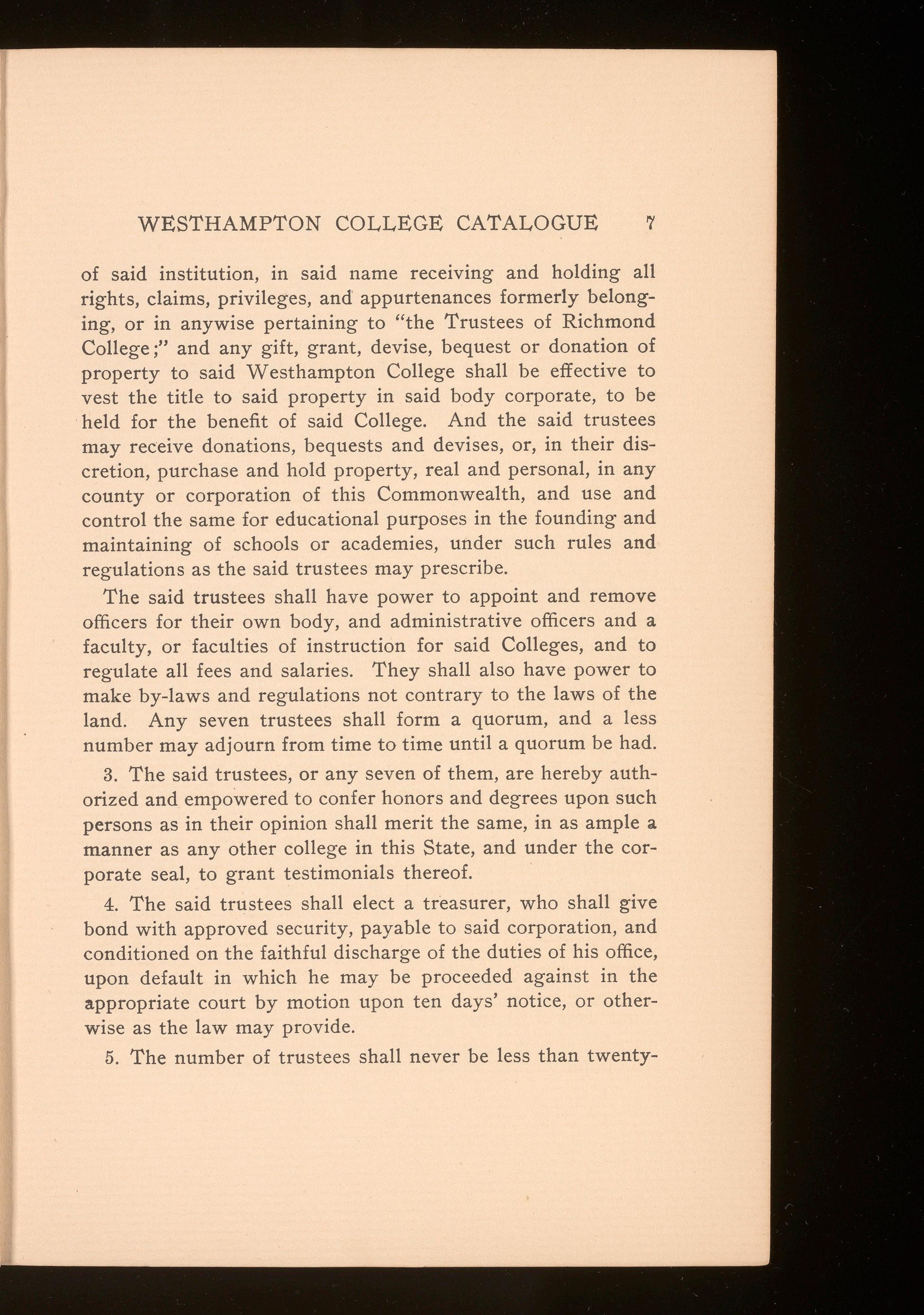
of said institution, in said name receiving and holding all rights, claims, privileges, and appurtenances formerly belonging, or in anywise pertaining to "the Trustees of Richmond College;" and any gift, grant, devise, bequest or donation of property to said Westhampton College shall be effective to vest the title to said property in said body corporate, to be held for the benefit of said College. And the said trustees may receive donations, bequests and devises, or, in their discretion, purchase and hold property, real and personal, in any county or corporation of this Commonwealth, and use and control the same for educational purposes in the founding and maintaining of schools or academies, under such rules and regulations as the said trustees may prescribe.
The said trustees shall have power to appoint and remove officers for their own body, and administrative officers and a faculty, or faculties of instruction for said Colleges, and to regulate all fees and salaries. They shall also have power to make by-laws and regulations not contrary to the laws of the land. Any seven trustees shall form a quorum, and a less number may adjourn from time to time until a quorum be had.
3. The said trustees, or any seven of them, are hereby authorized and empowered to confer honors and degrees upon such persons as in their opinion shall merit the same, in as ample a manner as any other college in this State, and under the corporate seal, to grant testimonials thereof .
4. The said trustees shall elect a treasurer, who shall give bond with approved security, payable to said corporation, and conditioned on the faithful discharge of the duties of his office, upon default in which he may be proceeded against in the appropriate court by motion upon ten days' notice, or otherwise as the law may provide.
5. The number of trustees shall never be less than twenty-
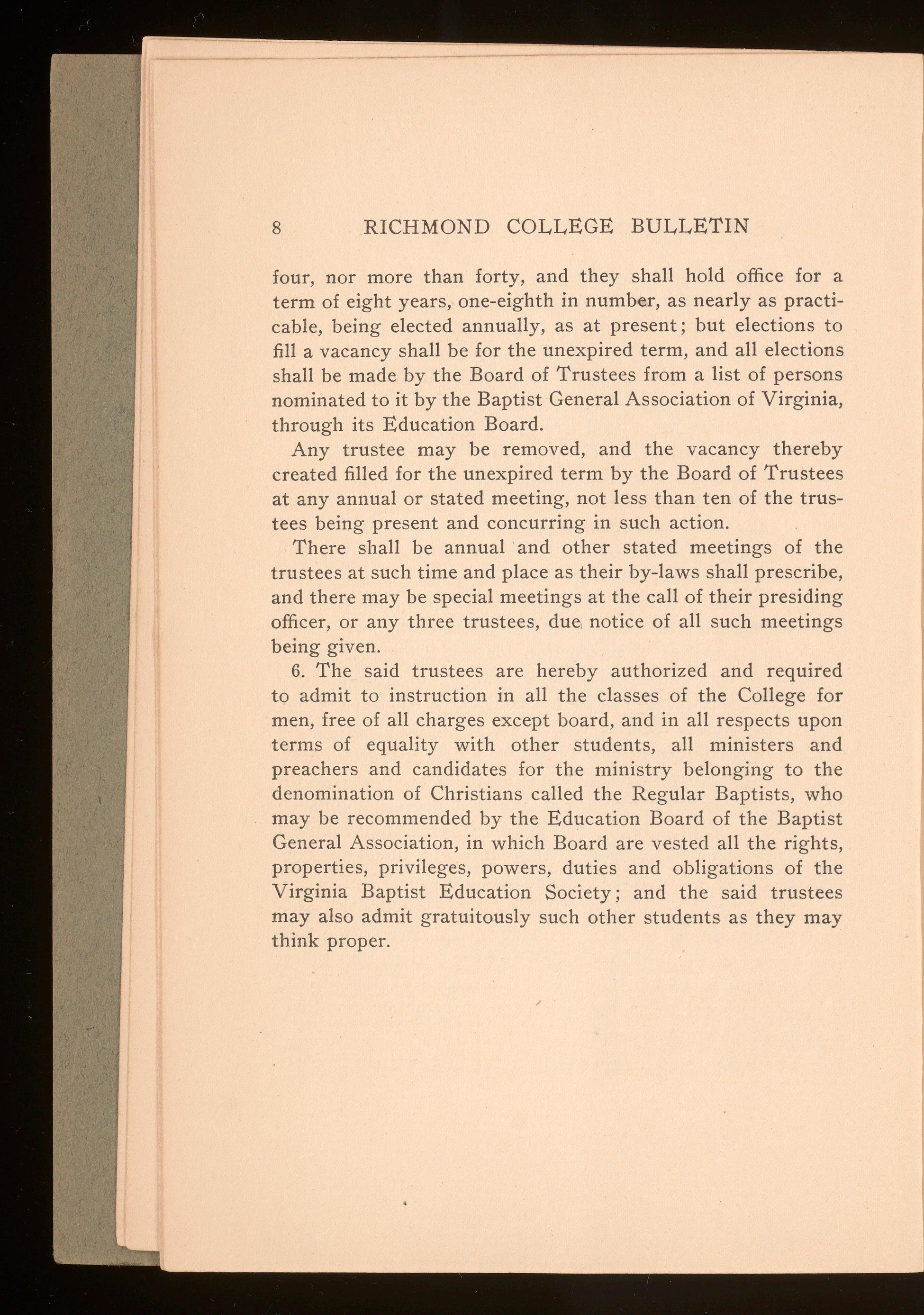
four, nor more than forty, and they shall hold office for a term of eight years, one-eighth in number, as nearly as practicable, being elected annually, as at present; but elections to fill a vacancy shall be for the unexpired term, and all elections shall be made by the Board of Trustees from a list of persons nominated to it by the Baptist General Association of Virginia, through its Education Board.
Any trustee may be removed, and the vacancy thereby created filled for the unexpired term by the Board of Trustees at any annual or stated meeting, not less than ten of the trustees being present and concurring in such action.
There shall be annual ·and other stated meetings of the trustees at such time and place as their by-laws shall prescribe, and there may be special meetings at the call of their presiding officer, or any three trustees, due , notice of all such meetings being given.
6. The said trustees are hereby authorized and required to admit to instruction in all the classes of the College for men, free of all charges except board, and in all respects upon terms of equality with other students, all ministers and preachers and candidates for the ministry belonging to the denomination of Christians called the Regular Baptists, who may be recommended by the Education Board of the Baptist General Association, in which Board are vested all the rights, properties, privileges, powers, duties and obligations of the Virginia Baptist Education Society; and the said trustees may also admit gratuitously such other students as they may think proper.
WESTHAMPTON COLLEGE CATALOGUE 9
LIEUTENANT-GOVERNOR J. TAYLOR ELLYSON
President
A. W. PATTERSON, ESQ.
Vice-President
Secretary
CLASS ONE
Term expires June, 1914.
MAJ. A. R. COURTNEY,Richmond
H. WYTHE DAVIS, M. D., Rich'd
C. H. RYLAND,D. D Richmond
C. T. WATKINS, EsQ., Richmond
]. A. C. CHANDLER,Ph. D., Rich'd
CLASS THREE
Term expires June, 1916.
JNo. R. BAGBY,D. D .... Ballsville
J. J. MoNTAGUE,EsQ., Richmond
J. M. PILCHER,D. D., Petersburg
C. R. SANDS,EsQ ...... Richmond
PROF. GEO. SWANN..... Powhatan
CLASS FIVE
Term expires June, 1918.
B. T. GUNTER,EsQ ...... Accomac
W. C. }AMES,D. D ..... Richmond
A. R. LoNG, EsQ ...... Lynchburg
A. J. MONTAGUE,LL. D., Rich'd
R. C. WILLIAMS, EsQ Richmond
CLASS SEVEN
Term expires June, 1920.
REV. WM. L. BALL..... Richmond
S. C. MITCHELL, Ph. D., Rich'd
T .B. McADAMS, EsQ., Richmond
G. W. McDANIEL, D. D., Rich'd
C. E. NICOL, EsQ ..... Alexandria
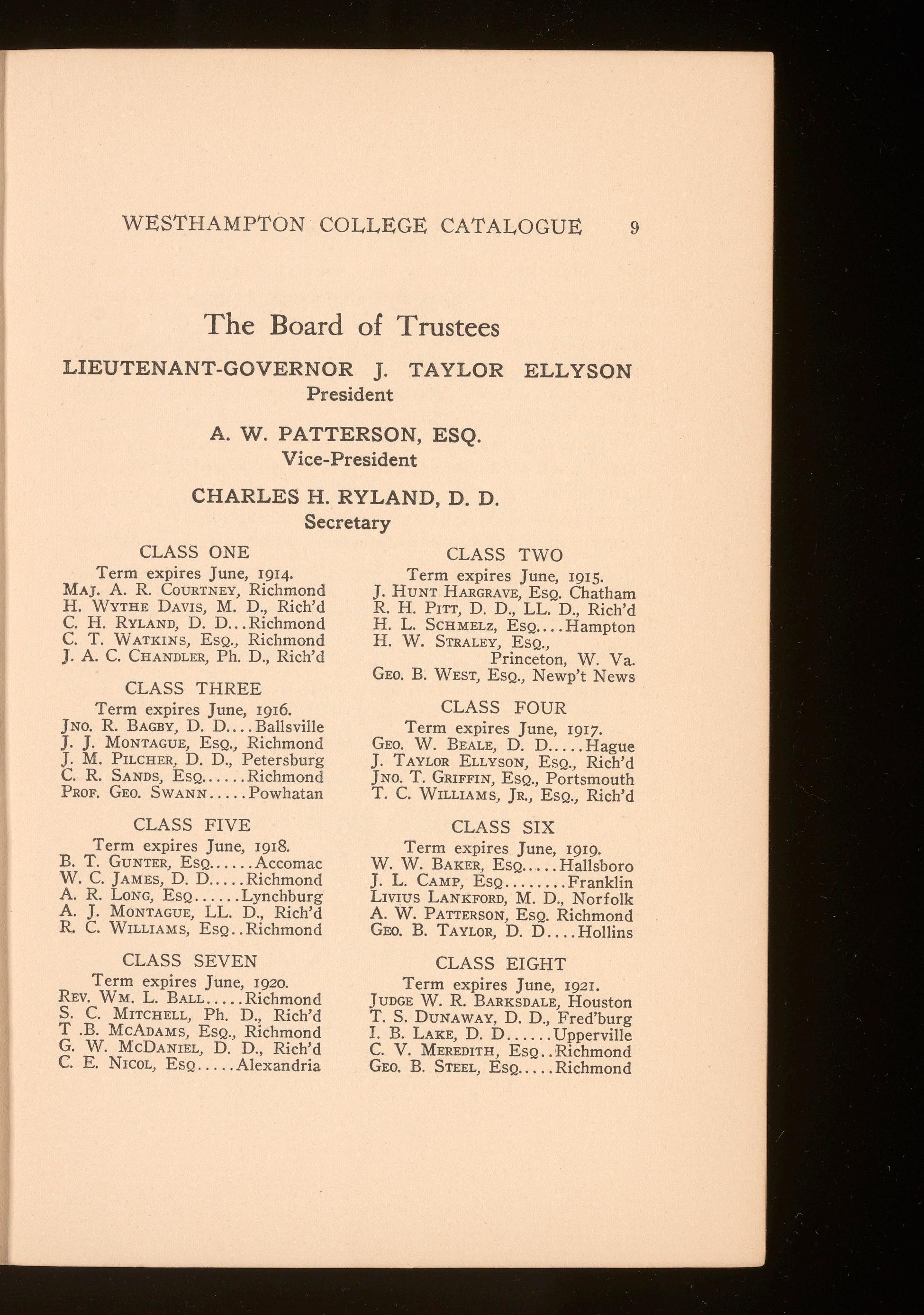
CLASS TWO
Term expires June, 1915.
J. HUNT HARGRAVE,EsQ. Chatham
R. H. P1TT, D. D., LL. D., Rich'd
H. L. SCHMELz,EsQ .... Hampton
H. W. STRALEY,EsQ., Princeton, W. Va.
GEo. B. WEST, EsQ., Newp't News
CLASS FOUR
Term expires June, 1917.
GEo. W. BEALE, D. D ..... Hague
J. TAYLORELLYSON,EsQ., Rich'd
]No. T. GRIFFIN,EsQ., Portsmouth
T. C. WILLIAMS,JR., EsQ., Rich'd
CLASS SIX
Term expires June, 1919.
W. W. BAKER,EsQ ..... Hallsboro
J. L. CAMP, EsQ Franklin L1vrns LANKFORD,M. D., Norfolk
A. W. PATTERSON,EsQ. Richmond
Goo. B. TAYLOR,D. D .... Hollins
CLASS EIGHT
Term expires June, 1921.
JUDGEw. R. BARKSDALE,Houston
T. S. DUNAWAY,D. D., Fred'burg
I. B. LAKE, D. D ...... Upperville
C. V. MEREDITH,EsQ Richmond
GEO. B. STEEL,EsQ..... Richmond

lNSTRUCTION.-G.W. McDaniel, J. M. Pilcher, W. L. Ball, A. J. Montague, W. C. James, A. R. Long, G. B. Taylor, J. A. C. Chandler, S. C. Mitchell.
LAW ScHooL.-A. W. Patterson, T. C. Williams, Jr., C. V. Meredith, B. T. Gunter.
LIBRARY.-A. J. Montague, S C. Mitchell, George B. Steel, Professors Metcalf and Anderson
FINANCE.-T. C. Williams, Jr., A. W. Patterson, T. B. McAdams, H. L. Schmelz, J. L. Camp, R. C. Williams.
GROUNDSAND BurLDINGs.-J. J. Montague, W. W. Baker, Conway R. Sands, W. L. Ball, R. C. Williams, C. T. Watkins.
Arn FUNDS (Scholarships and Donations).-R. H. Pitt, J. H. Hargrave, G. W. McDaniel, A. R. Long, G. W. Beale .
ENDOWMENT.-H.W. Straley, G. B. West, W.W. Baker, J. H. Hargrave, J. T. Griffin, R. C. Williams.
AcADEMIEs.-W. R. Barksdale, C. E. Nicol, George Swann, Livius Lankford, G. B. Taylor. NOMINATIONOF NEW TRUSTEEs.-W. C. James, A. W. Patterson, R. H. Pitt, J. A. C. Chandler. NoMINATIONFOR HONORARYDEGREEs.-G. W. Beale, I. B. Lake, J. H. Hargrave, T. S. Dunaway, R. E. Loving.
The By-Laws provide that the President of the Trustees and the Secretary shall be members of all the above committees, and have equal privileges with other members; and that the President of the College shall be ex-officio a member of all except Nomination of New Trustees.
PRUDENTIALCoMMITTEE.-J. Taylor Ellyson, F. W. Boatwright, J. A. C. Chandler, S. C. Mitchell, W. C. James, J. C. Metcalf, May L. Kellee. NEW BurLDINGs.-J. Taylor Ellyson, F. W. Boatwright, A. W. Pattersofl, R H. Pitt, T. B. McAdams, C. T. Watkins.
F. W. BOATWRIGHT,President. J. C. METCALF , Dean of Richmond Colleg·e. MAY L. KELLER,Dean of Westhampton College.
C. H. RYLAND,Secretary and Librarian. B. WEST TABB,Treasurer and Registrar.
WESTHAMPTON COLLEGE CATALOGUE 11
FREDERICK WILLIAM BOATWRIGHT
President
MAY LANSFIELD KELLER, Ph. D.
DEAN AND PROFESSOROF ENGLISH
A. B. Goucher College, 1898; Graduate Student, University of Chicago, 1900; Holder of Fellowship of Goucher College, 1901-02; Graduate Student, Universities of Berlin and Heidelberg, 1901-04; Ph. D. Heidelberg, 1904; Instructor in English, Wells College, 1905-07; Associate Professor of English, Goucher College, 1907-14.
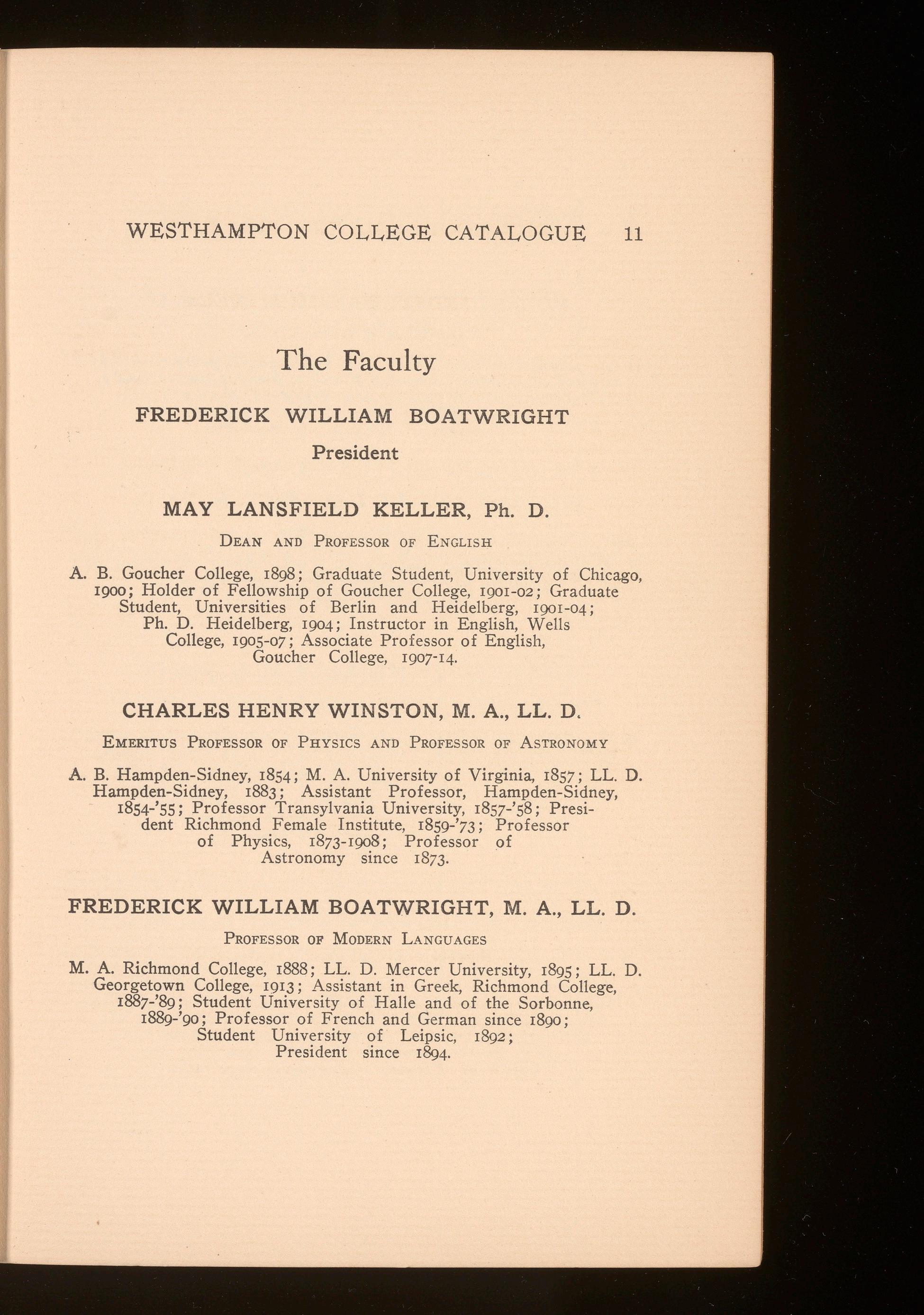
HENRY WINSTON, M. A., LL. D.
EMERITUSPROFESSOROF PHYSICS AND PROFESSOROF ASTRONOMY
A. B. Hampden-Sidney, 1854; M. A. University of Virginia, 1857; LL D. Hampden-Sidney, 1883; Assistant Professor, Hampden-Sidney, 1854-'55; Professor Transylvania University, 1857-'58; President Richmond Female Institute, 1859-'73; Professor of Physics, 1873-1908; Professor of Astronomy since 1873.
FREDERICK WILLIAM BOATWRIGHT, M. A., LL. D.
PROFESSOROF MODERNLANGUAGES
M. A. Richmond College, 1888; LL. D. Mercer University, 1895; LL . D. Georgetown College, 1913; Assistant in Greek, Richmond College, 1887-'89; Student University of Halle and of the Sorbonne, 1889-'90; Professor of French and German since 1890; Student University of Leipsic, 1892; President since 1894.
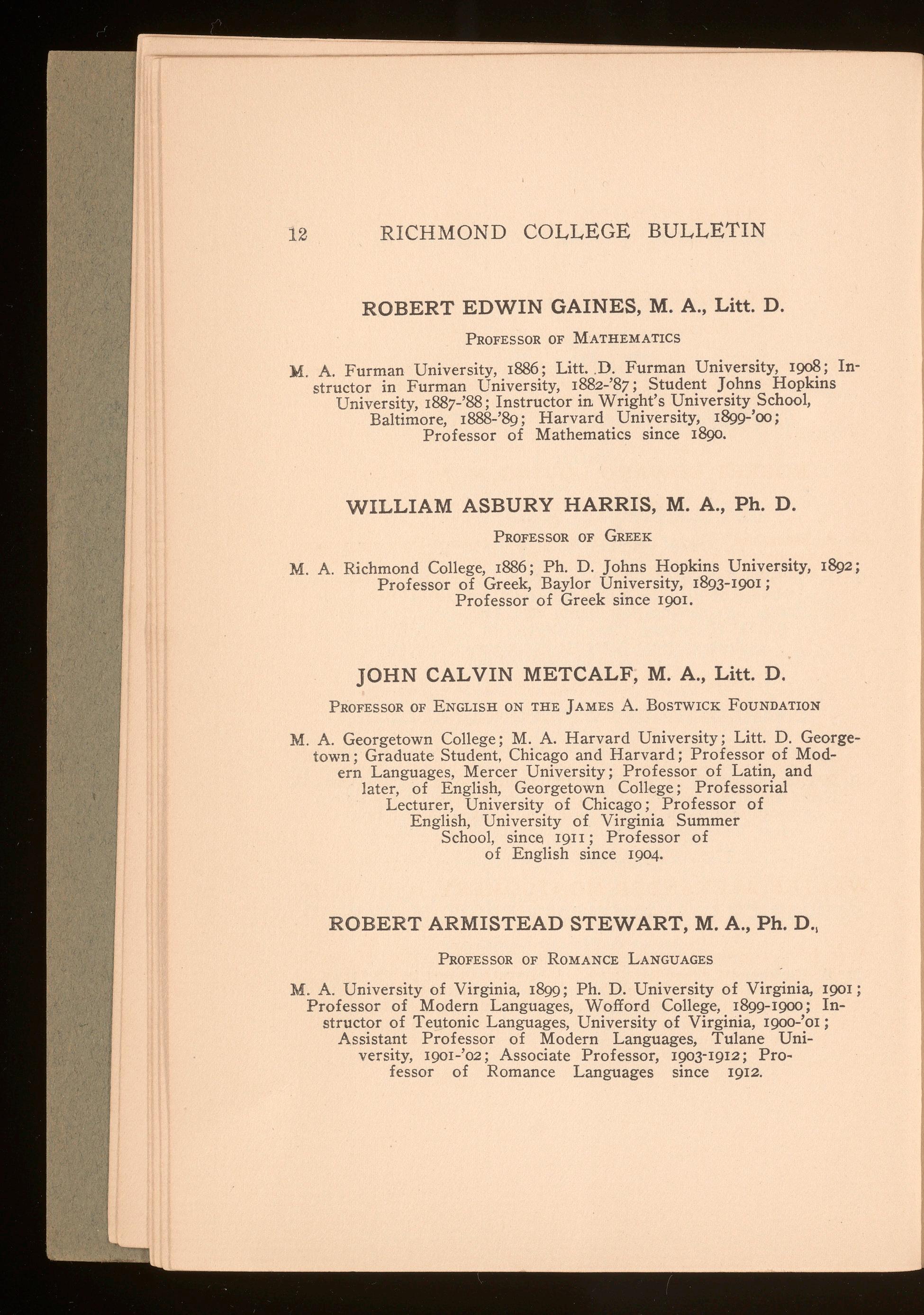
PROFESSOR OF MATHEMATICS
:M. A. Furman University, 1886; Litt D. Furman University, 19()8; Instructor in Furman University, 1882-'87; Student Johns Hopkins University, 1887-'88; Instructor in Wright's University School, Baltimore, 1888-'89; Harvard University, 1899-'oo; Professor of Mathematics since 18go.
PROFESSOR OF GREEK
M. A. Richmond College, 1886; Ph. D. Johns Hopkins University, 1892; Professor of Greek, Baylor University, 1893-1901; Professor of Greek since 1901.
PROFESSOR OF ENGLISH ON THE JAMES A. BOSTWICK FOUNDATION
M. A. Georgetown College; M. A. Harvard University; Litt. D. Georgetown; Graduate Student, Chicago and Harvard; Professor of Modem Languages, Mercer University; Professor of Latin, and later, of English, Georgetown College; Professorial Lecturer, University of Chicago; Professor of English, University of Virginia Summer School, sincti 19n; Professor of of English since 1904.
PROFESSOR OF ROMANCE LANGUAGES
M . A. University of Virginia, 1899; Ph. D. University of Virginia, 1901; Professor of Modem Languages, Wofford College, 1899-1900; Instructor of Teutonic Languages, University of Virginia, 1900-'01 ; Assistant Professor of Modern Languages, Tulane University, 1901-'02; Associate Professor, 1903-1912; Professor of Romance Languages since 1912.
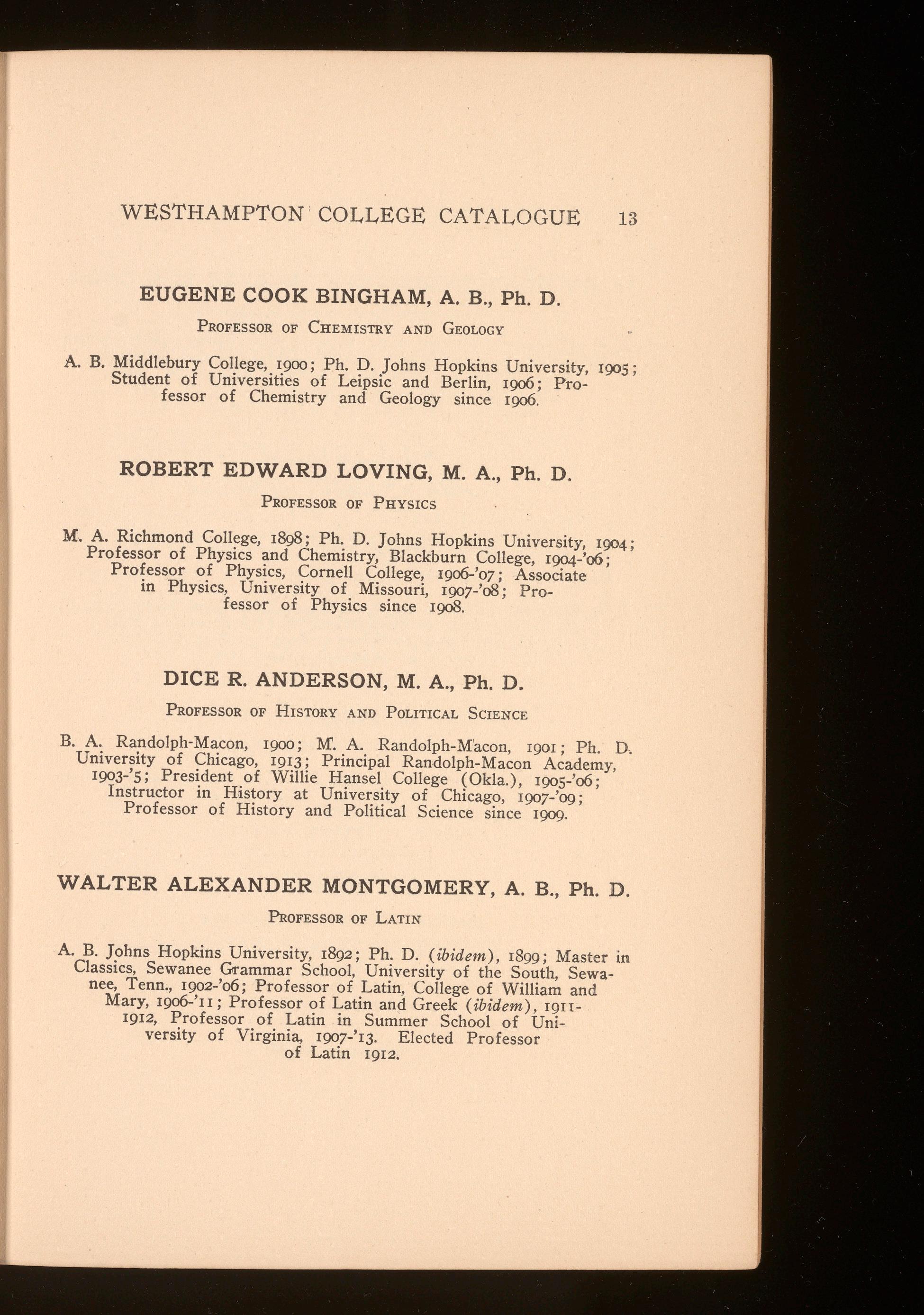
PROFESSOR OF CHEMISTRY AND GEOLOGY
A. B. Middlebury College, 1900; Ph. D. Johns Hopkins University, 1905; Student of Universities of Leipsic and Berlin, 1go6; Professor of Chemistry and Geology since 1900.
PROFESSOR OF PHYSICS
M. A. Richmond College, 18g8; Ph. D. Johns Hopkins University, 1904; Professor of Physics and Chemistry, Blackburn College, 1904-'o6; Professor of Physics, Cornell College, 19o6-'07; Associate in Physics, University of Missouri, 1907-'o8; Professor of Physics since 1go8.
PROFESSOR OF HISTORY AND POLITICAL SCIENCE
B. A. Randolph-Macon, 1900; M'. A. Randolph-M'acon, 1901; Ph. D. University of Chicago, 1913; Principal Randolph-Macon Academy, 1903-'5; President of Willie Hansel College (Okla.), 1905-'o6; Instructor in History at University of Chicago, 1907-'og; Professor of History and Political Science since 1909.
PROFESSOR OF LATIN
A. B. Johns Hopkins University, 18g2; Ph. D. (ibidem), 1899; Master in Classics, Sewanee Grammar School, University of the South, Sewa- nee, Tenn., 1902-'o6; Professor of Latin, College of William and Mary, 19o6-'u; Professor of Latin and Greek (ibidem), 19u1912, Professor of Latin in Summer School of University of Virginia, 1907-'13. Elected Professor of Latin 1912.

ASSOCIATE PROFESSOR OF BIOLOGY
A. B. Middlebury College, 1907; Vice-Principal Spring Valley Regent High School, Spring Valley, N. Y., 1907-'08; Rhodes Scholar in Oxford University, 19o8-'n; B. A. Oxon , 19n, M. A., 1914; Professor Natural Science, Shorter College, 19n-'12; Associate Professor of Biology since 1912.
*--------
PROFESSOR OF ECONOMICS AND SOCIOLOGY
PROFESSOR OF PHILOSOPHY ON THE JAMES THOMAS, JR., FOUNDATION
B. A. Richmond College, 1907; B. D. Crozer Theological Seminary, 1910; Ph. D. University of Pennsylvania, 19n ; Professor of Philosophy, Hampden-Sidney College, 19u-'13; Professor of Philosophy since 1913.
INSTRUCTOR IN DRAWING
B. S. Virginia Military Institute, 1900; S . B. E. E. Massachusetts Institute of Technology, 1903; Instructor in Physics and Electricity Virginia Mechanics Institute since 1903; Instructor in Drawing since 1904.
ASSOCIATE PROFESSOR OF CHEMISTRY
A. B. Lebanon Valley College, 1906; Ph. D. Columbia University, 1914; Professor of Physics and Chemistry Lebanon Valley College, 1907-10; Instructor in Analytical Chemistry Columbia University, 1913-14.
* To be appointed.

ASSOCIATE PROFESSOR OF LATIN AND GREEK
B. A. Richmond College, 18g8; M. A. ibid., 1899; A. M. Harvard Uni- versity, 1905; Instructor in Latin in High Schools, 1899-1904; Principal Welsh Neck (S. C.) High School, 19o6-o8; Instructor in Latin, Richmond Academy, 1909-14.
ASSOCIATE PROFESSOR OF ENGLISH
B. A Richmond College, 19o6, M. A. ibid., 1908; M. A. Harvard University, 1913; Instructor in English, Richmond Academy, 1906-u and 1913-14.
PROFESSOR OF GERMAN
ASSOCIATE PROFESSOR OF MATHEMATICS AND PHYSICS
INSTRUCTOR IN MATHEMATICS
INSTRUCTOR IN FRENCH AND SPANISH
INSTRUCTOR IN BIOLOGY
PROFESSOR OF EDUCATION AND PHILOSOPHY
ASSISTANT I:NSTRUCTOR IN ECONOMICS
* To be appointed.

*--------
INSTRUCTOR IN HISTORY AND POLITICAL SCIENCE
*--------
INSTRUCTOR IN DOMESTIC SCIENCE
*--------
INSTRUCTION IN ExPRESSION AND PHYSICAL CULTURE
*--------
INSTRUCTOR IN BIBLE
*--------
DIRECTOR OF MUSIC
*--------
ASSISTANT IN Music
*--------
ASSISTANT IN Music
LIBRARIAN AND CURATOR
* To be appointed.

The next session opens Thursday, September 17, 1914, and continues thirty-eight weeks. The session closes June 9, 1915. Students are urged to be present on the opening day of the session.
For admission to Westhampton College the general conditions are as follows :
I. The applicant must be at least sixteen years of age.
II. The applicant should present a certificate of honorable dismissal from the last school attended, or other sufficient evidence of good character.
III. The applicant must give proof of adequate preparation to profit by the work offered in college classes. This preparation may be established by: 1. A written examination. 2. A certificate from an- accredited preparatory school. 3. Faculty permission to register as a special student.
The requirements for admission are stated in units. A unit is the equivalent of five recitation periods a week during a full school year of an accepted preparatory school above the grammar grade.
For admission to full standing as candidate for a degree fifteen units are required, of which se-yen are specified and eight are optional. The specified units are as follows:
For the eight optional units the candidate may offer any of the work that is listed as acceptable for entrance.
For admission to conditional standing as a candidate for a degree, twelve units are required, with the condition that the remaining three are to be made up within two years.
The following statement indicates the amount of preparation expected in each subject:
1. English.-Three units; all required.
The English requirements consist of two parts:
(a) English Grammar and Rhetoric, including Grammar, Analysis, Punctuation, Paragraphing and Composition.
(b) The reading course and the course in special study and practice adopted by the Association of Colleges and Preparatory Schools of the Southern States.
The following are the courses assigned by the Association for entrance requirements in English:
for 1914 and 1915.
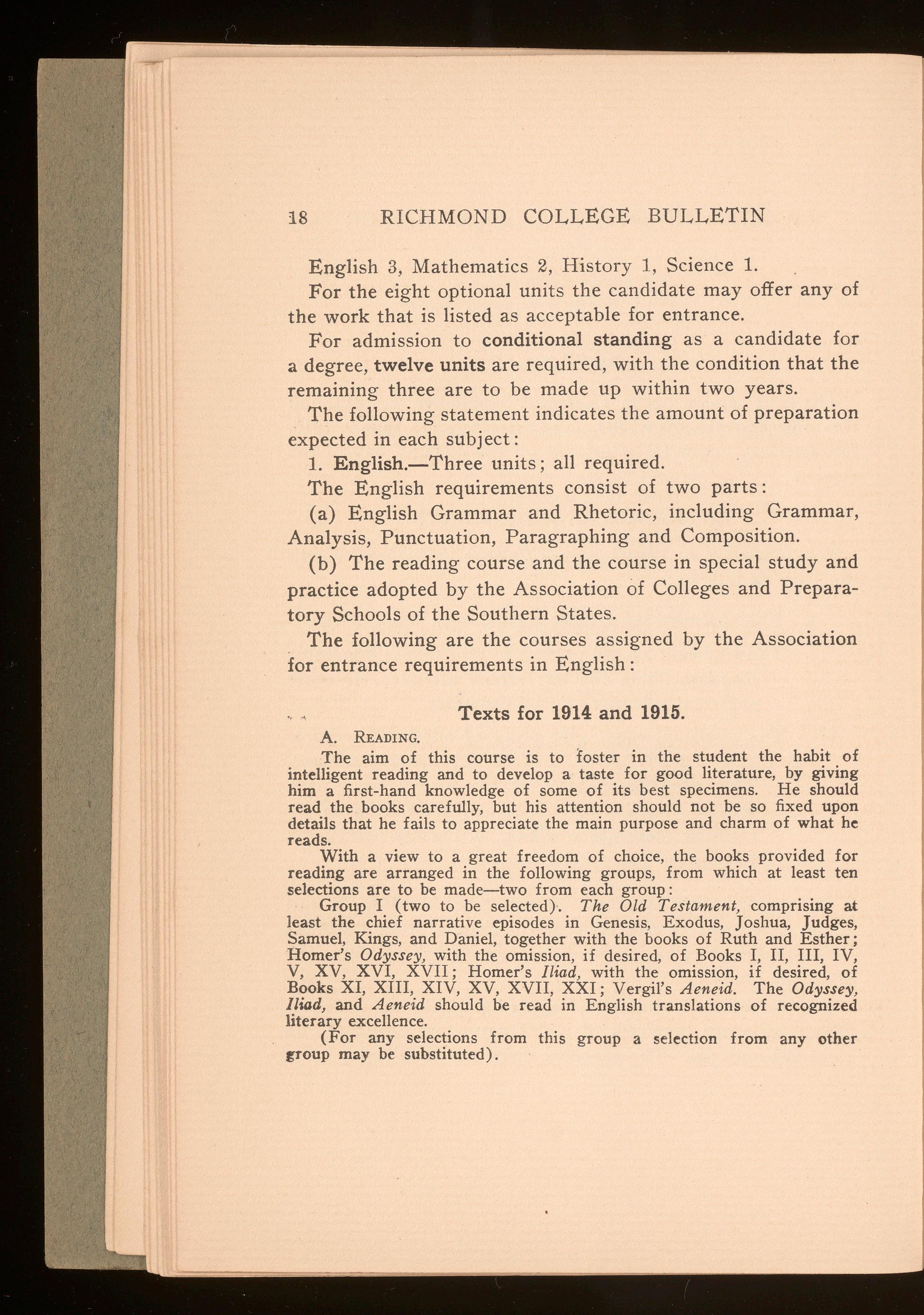
A. READING.
The aim of this course is to toster in the student the habit of intelligent reading and to develop a taste for good literature, by giving him a first-hand knowledge of some of its best specimens. He should read the books carefully, but his attention should not be so fixed upon details that he fails to appreciate the main purpose and charm of what he reads.
With a view to a great freedom of choice, the books provided for reading are arranged in the following groups, from which at least ten selections are to be made-two from each group :
Group I (two to be selected). The Old Testament, comprising at least the chief narrative episodes in Genesis, Exodus, Joshua, Judges, Samuel, Kings, and Daniel, together with the books of Ruth and Esther; Homer's Odyssey, with the omission, if desired, of Books I, II, III, IV, V, XV, XVI, XVII; Homer's Iliad, with the omission, if desired, of B?oks XI, XIII,_ XIV, XV, XVII, XXI; Vergil's Aeneid. The Odyssey, Iliad, and Aeneid should be read in English translations of recognized literary excellence.
(For any selections from this group a selection from any other group may be substituted).
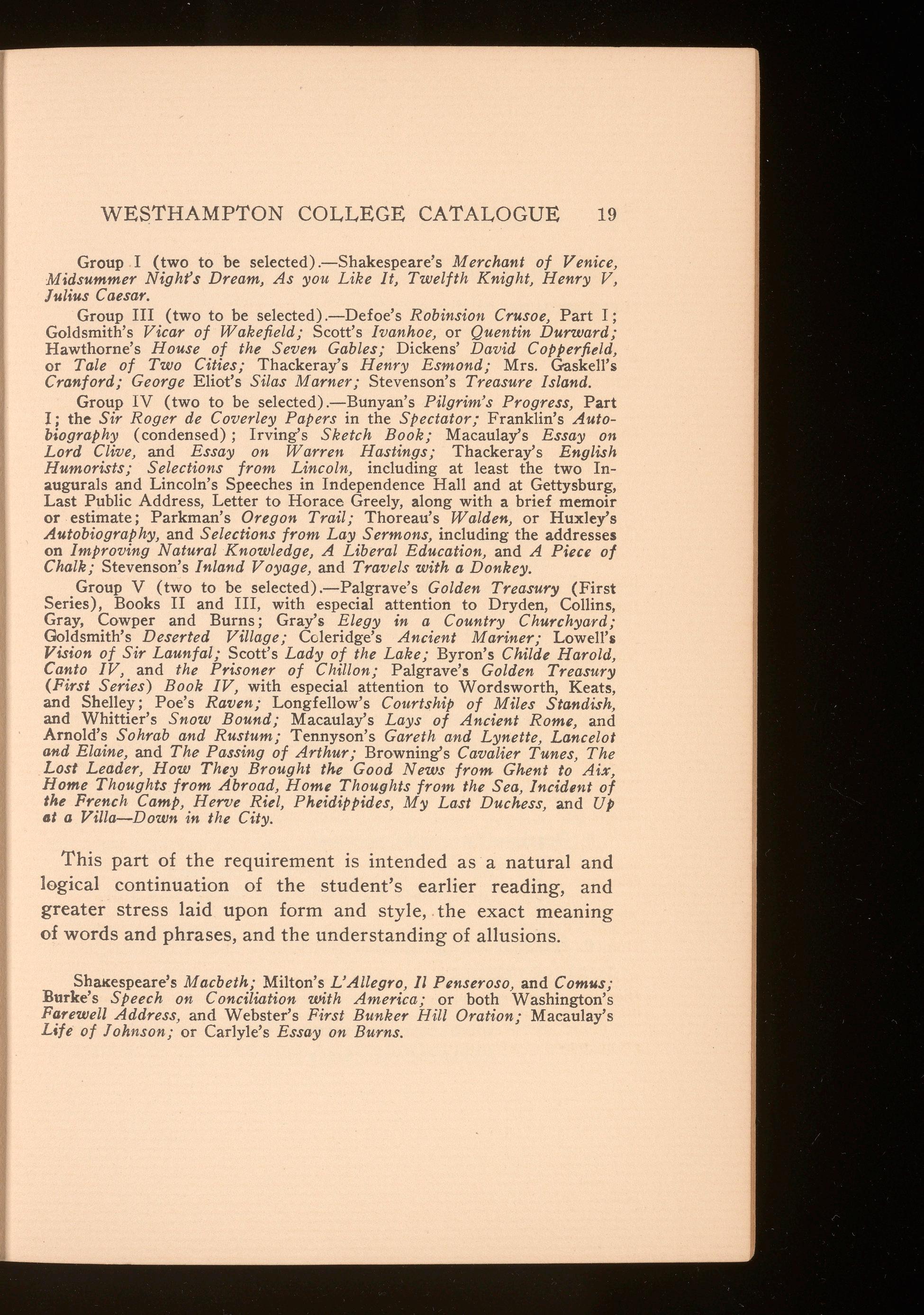
Group I ( two to be selected) .-Shakespeare's Merchant of Venice, Midsummer Night's Dream, As you Like It, Twelfth Knight, Henry V, Julius Caesar.
Group III (two to be selected) .-Defoe's Robinsion Crusoe, Part I; Goldsmith's Vicar of Wakefield; Scott's Ivanhoe, or Quentin Durward; Hawthorne's House of the Seven Gables; Dickens' David Copperfield, or Tale of Two Cities; Thackeray's Henry Esmond; Mrs. Gaskell's Cranford; George Eliot's Silas Marner; Stevenson's Treasure Island.
Group IV (two to be selected).-Bunyan's Pilgrim's Progress, Part I; the Sir Roger de Coverley Papers in the Spectator; Franklin's Autobiography (condensed); Irving's Sketch Book; Macaulay's Essay on Lord Clive, and Essay on Warren Hastings; Thackeray's English Humorists; Selections from Lincoln, including at least the two Inaugurals and Lincoln's Speeches in Independence Hall and at Gettysburg, Last Public Address, Letter to Horace Greely, along with a brief memoir or estimate; Parkman's Oregon Trail; Thoreau's Walden, or Huxley's Autobiography, and Selections from Lay Sermons, including the addresses on Improving Natural Knowledge, A Liberal Education, and A Piece of Chalk; Stevenson's Inland Voyage, and Travels with a Donkey.
Group V (two to be selected).-Palgrave's Golden Treasury (First Series), Books II and III, with especial attention to Dryden, Collins, Gray, Cowper and Burns; Gray's Elegy in a Country Churchyard; Goldsmith's Deserted Village; Coleridge's Ancient Mariner; Lowell', Vision of Sir Launfal; Scott's Lady of the Lake; Byron's Childe Harold, Canto IV, and the Prisoner of Chillon; Palgrave's Golden Treasury (First Series) Book IV, with especial attention to Wordsworth, Keats, and Shelley; Poe's Raven; Longfellow's Coi,rtship of Miles Standish, and Whittier's Snow Bound; Macaulay's Lays of Ancient Rome, and Arnold's Sohrab and Rustum; Tennyson's Gareth and Lynette, Lancelot and Elaine, and The Passing of Arthur; Browning's Cavalier Tunes, The Lost Leader, How They Brought the Good News from Ghent to Aix, Home Thoughts from Abroad, Home Thoughts from the Sea, Incident of the French Camp, Herve Riel, Pheidippides, My Last Duchess, and Up at a Villa-Down in the City.
This part of the requirement is intended as a natural and logical continuation of the student's earlier reading, and greater stress laid upon form and style, .the exact meaning of words and phrases, and the understanding of allusions.
Shrucespeare's Macbeth; Milton's L'Allegro, ll Penseroso, and Camus; Burke's Speech on Conciliation with America; or both Washington's Farewell Address, and Webster's First Bunker Hill Oration; Macaulay's Life of l ohnson; or Carlyle's Essay on Burns.
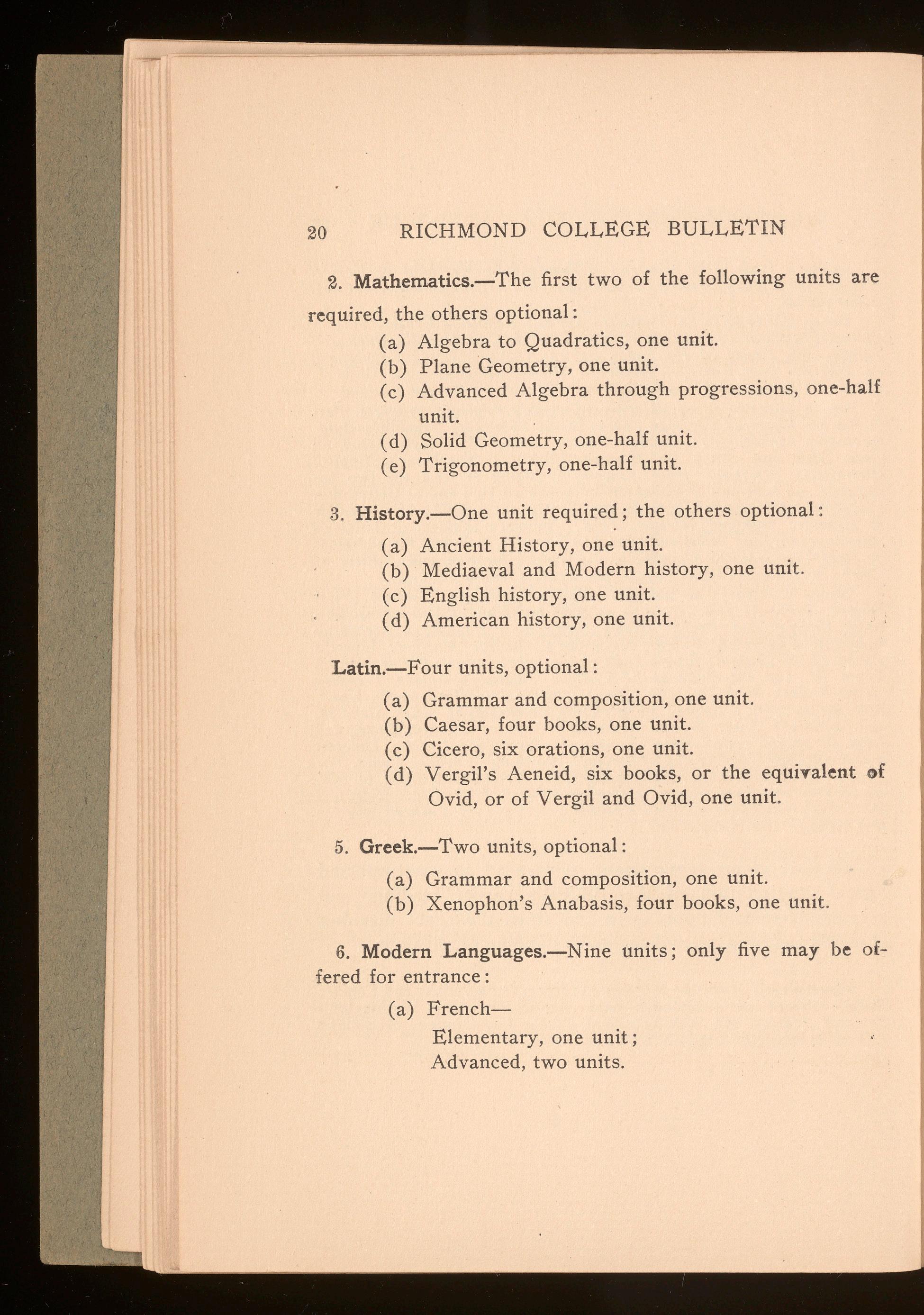
2. Mathematics.-The first two of the following units are required, the others optional:
(a) Algebra to Quadratics, one unit.
(b) Plane Geometry, one unit.
(c) Advanced Algebra through progressions, one-half unit.
( d) Solid Geometry, one-half unit.
( e) Trigonometry, one-half unit.
3. History.-One unit required; the others optional:
(a) Ancient History, one unit.
(b) Mediaeval and Modern history, one unit.
( c) English history, one unit.
( d) American history, one unit.
Latin.-Four units, optional:
(a) Grammar and composition, one unit.
(b) Caesar, four books, one unit.
( c) Cicero, six orations, one unit.
(d) Vergil's Aeneid, six books, or the equinlent c,f Ovid, or of Vergil and Ovid, one unit .
5. Greek.-Two units, optional :
(a) Grammar and composition, one unit.
(b) Xenophon's Anabasis, four books, one unit .
6. Modern Languages.-Nine units; only five may be offered for entrance:
(a) FrenchElementary, one unit; Advanced, two units.

(b) GermanElementary, one unit; Advanced, two units.
(
c) SpanishElementary, one unit; Advanced, two units.
7. Science.-Six units; one unit required.
(a) Physical Geography, one unit.
(b) Physics, one unit.
(
c) Chemistry, one unit.
(d) Manual Arts, one unit.
(e) Botany, one-half unit.
{f) Physiology, one-half unit.
(g) Mechanical Drawing, one-half unit.
(h) Zoology, one-half unit.
In subjects which imply laboratory work, such as Physics and Chemistry, two hours of laboratory work are estimated as the equivalent of one hour of recitation. The candidate's laboratory note-book must be submitted for inspection.
In making up the points required for an academic degree no credits can be counted that have already been granted among the requirements for admission fulfilled by the candidate.
When an academy or high school furnishes evidence to the President of the College that it gives thorough college preparatory training to its students, it may be included in the list of accredited schools. A certificate of its principal filled out on a form provided by the College will then be accepted as a KUarantee of the fulfilment of satisfactory entrance require-
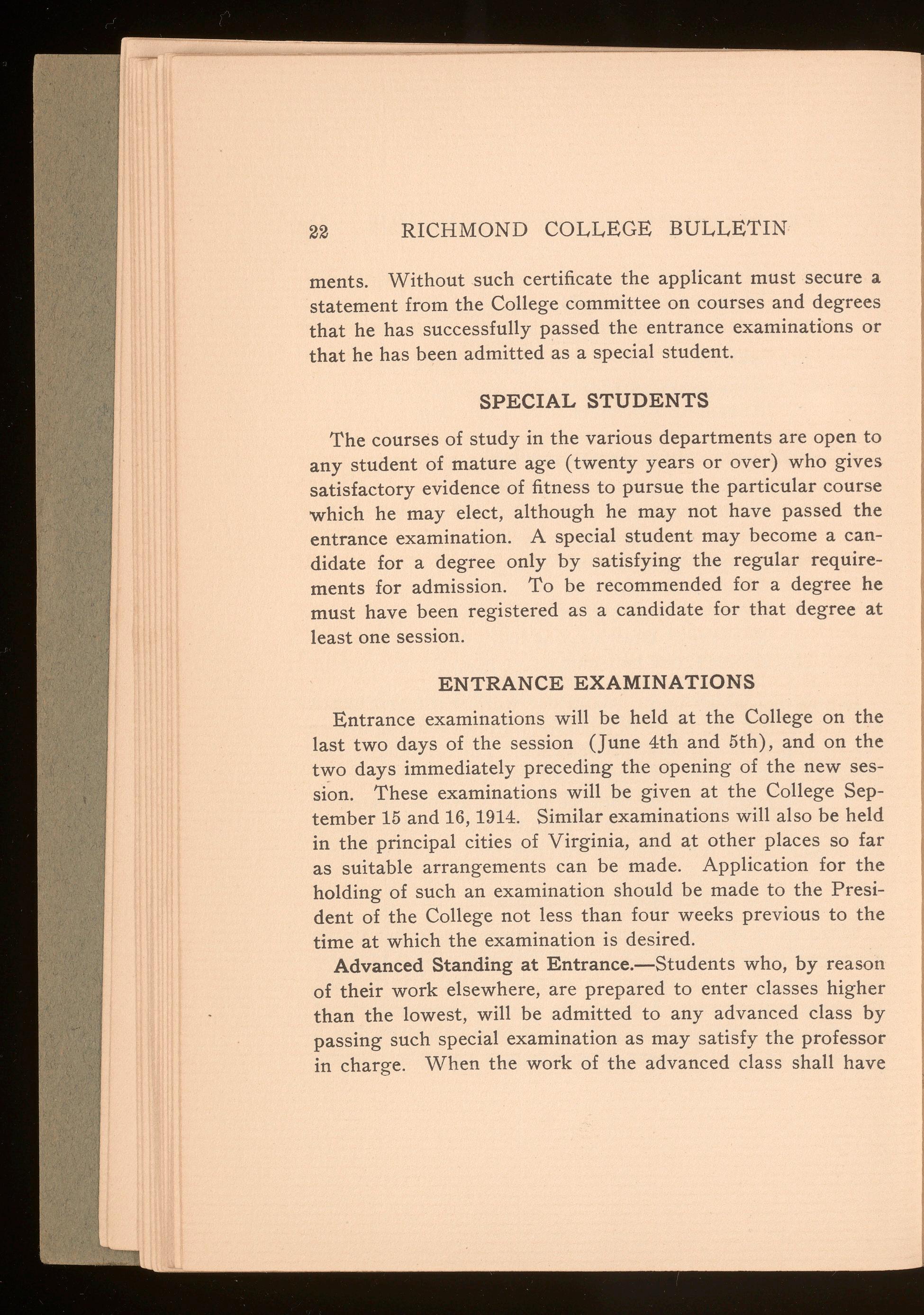
ments. Without such certificate the applicant must secure a statement from the College committee on courses and degrees that he has successfully passed the entrance examinations or that he has been admitted as a special student.
The courses of study in the various departments are open to any student of mature age (twenty years or over) who gives satisfactory evidence of fitness to pursue the particular course which he may elect, although he may not have passed the entrance examination. A special student may become a candidate for a degree only by satisfying the regular requirements for admission. To be recommended for a degree he must have been registered as a candidate for that degree at least one session
Entrance examinations will be held at the College on the last two days of the session (June 4th and 5th), and on the two days immediately preceding the opening of the new session. These examinations will be given at the College September 15 and 16, 1914. Similar examinations will also be held in the principal cities of Virginia, and at other places so far as suitable arrangements can be made . Application for the holding of such an examination should be made to the President of the College not less than four weeks previous to the time at which the examination is desired.
Advanced Standing at Entrance.-Students who, by reason of their work elsewhere, are prepared to enter classes higher than the lowest , will be admitted to any advanced class by passing such special examination as may satisfy the professor in charge. When the work of the advanced class shall have
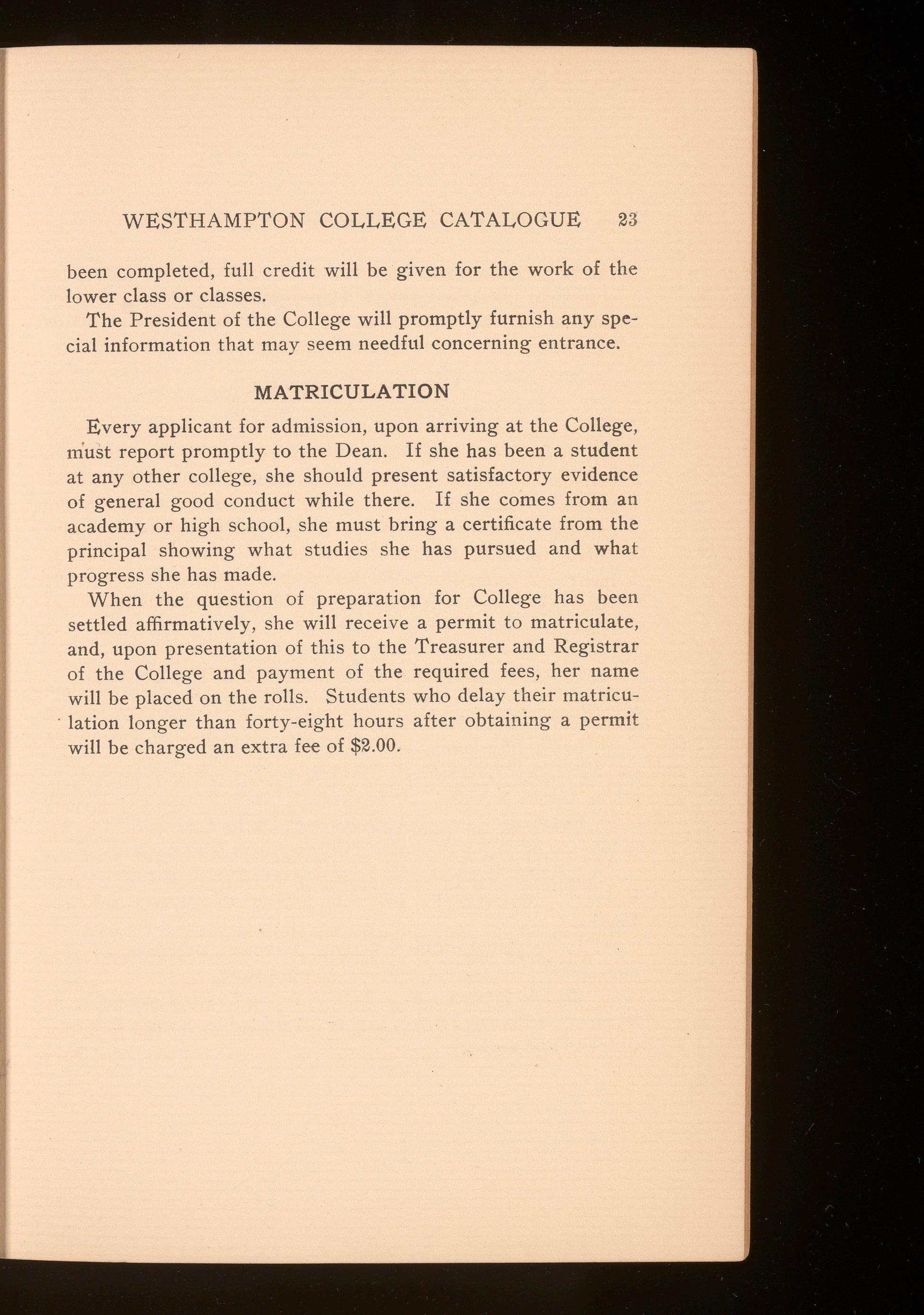
been completed, full credit will be given for the work of the lower class or classes.
The President of the College will promptly furnish any special information that may seem needful concerning entrance.
Every applicant for admission, upon arriving at the College, niust report promptly to the Dean. If she has been a student at any other college, she should present satisfactory evidence of general good conduct while there. If she comes from an academy or high school, she must bring a certificate from the principal showing what studies she has pursued and what progress she has made.
When the question of preparation for College has been settled affirmatively, she will receive a permit to matriculate, and, upon presentation of this to the Treasurer and Registrar of the College and payment of the required fees, her name will be placed on the rolls. Students who delay their matriculation longer than forty-eight hours after obtaining a permit will be charged an extra fee of $2.00.
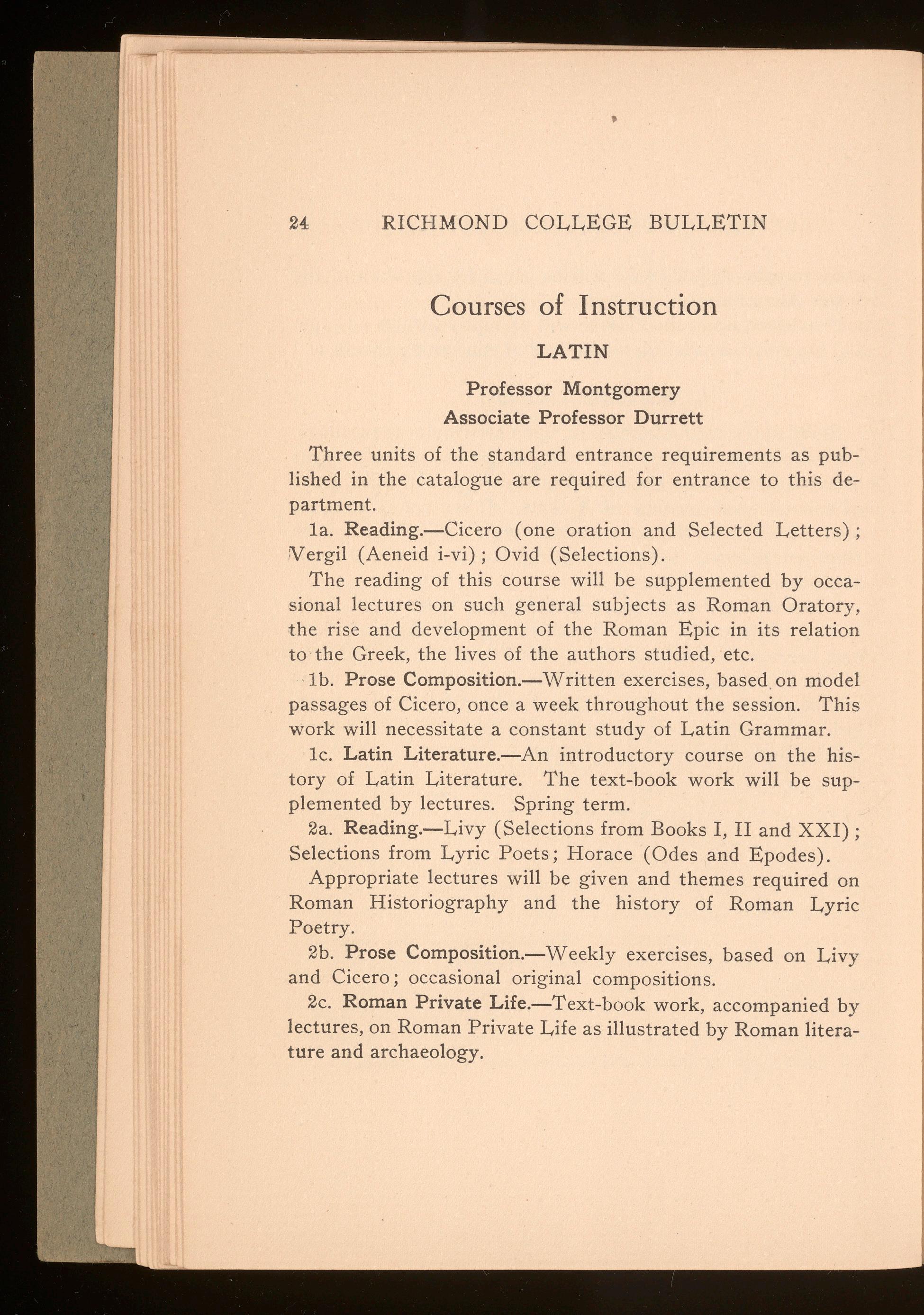
Professor Montgomery
Associate Professor Durrett
Three units of the standard entrance requirements as published in the catalogue are required for entrance to this department.
la. Reading.-Cicero (one oration and Selected Letters); iVergil (Aeneid i-vi); Ovid (Selections).
The reading of this course will be supplemented by occasional lectures on such general subjects as Roman Oratory, the rise and development of the Roman Epic in its relation to the Greek, the lives of the authors studied, etc.
, lb. Prose Composition.-Written exercises, based on model passages of Cicero, once a week throughout the session. This work will necessitate a constant study of Latin Grammar.
le. Latin Literature.-An introductory course on the history of Latin Literature. The text-book work will be supplemented by lectures. Spring term.
2a. Reading.-Livy (Selections from Books I, II and XXI); Selections from Lyric Poets; Horace (Odes and Epodes). Appropriate lectures will be given and themes required on Roman Historiography and the history of Roman Lyric Poetry.
2b. Prose Composition.-W eekly exercises, based on Livy and Cicero; occasional original compositions.
2c. Roman Private Life.-Text-book work, accompanied by lectures, on Roman Private Life as illustrated by Roman literature and archaeology.

3a. Reading.-Tacitus (Germania and Agricola); Pliny ( Selected Letters) ; Juvenal and Horace ( Select Satires) ; Martial (Select Epigrams); Plautus (Manaechmi); Terence ( Self Tormentor).
The reading will be supplemented by lectures on Roman Historiography during the classical period of the Empire, Roman Epistolography, Biography, the rise and development of Roman Comedy, Satire, and the Epigram.
3b. Prose Composition.-The work will consist of original composition, and the translation into idiomatic Latin of typical passages of English literature, representing different subjects and different styles. From time to time the instructor will meet each student separately to criticise his work.
3c. Latin Literature.-A general survey of the classical literature of the Romans. The study of a text-book will be supplemented by appropriate lectures.
4a. Reading.-Tacitus (Dialogues de Ora tori bus)'; Cicero (Brutus); Horace and Juvenal (Selected Satires); Horace (Ars Poetica) ; Quintilian (Book X).
The reading will be supplemented by lectures on Roman Oratory, Satire, and Literary Criticism.
4b. Prose Composition.-The composition of this course will be given on the same plan as that of Course 3. The exercises will be adapted to the advancement of the individual student.
4c. Special reports on assigned topics dealing with Roman life and literature.

Professor Harris
Associate Professor Durrett
1. This class begins with the alphabet, and is occupied in securing a thorough knowledge of forms, a working vocabulary and the fundamental points of syntax. In addition, the class will be expected to read one book of the Anabasis. From the beginning of the course exactness will be insisted - upon . To enter this course some knowledge of Latin is prerequisite .
2 This class will complete the Ana basis ( four books) and will take up some other author as the needs of the class ma y indicate. Special attention will be paid to form and inflections. There will be weekly exercises in grammar and composition. As the student advances translation at sight will be emphasized.
3. This class will be subject to change as the needs of the students may dictate. The first term will be devoted t o Homer, the second to Plato, and the third to Lysias. There will be weekly exercises in composition throughout the year . Wark will be assigned for private reading on which the student will be examined . As opportunity offers there will be conferences on Greek life, mythology, history , literature an d art. At all times an effort will be made to lead the student into a keener appreciation of the genius of the Greeks , and t o cultivate a sense for their literary standards
4 . In this class the work will center around Thucydides , Demosthenes, and the drama . Wark will also be assigned fo r private reading, and English will be put into Greek either a s a set exercise or at dictation This course will be made a s general as is consistent with thoroughness. There will b e lectures on literature , grammar, and rhetoric.

Professor Stewart
Assistant Professor·-------*
1. For Beginners.-This class for beginners in French presupposes a sound knowledge of English grammar and of the elements of Latin. About three hundred pages of easy French are read. Grammar: Fraser and Squair's "Shorter French Course."
2. General Introduction to the Study of French Literature.Conversation. The course consists of (a) Composition: Text: Francois' "Advanced Prose Composition;" (b) French Literature: Text, Wells' "Modern French Literature;" ( c) Readings in French prose and poetry: Hugo's "Les Miserables" (Heath ed.) ; Daudet's "Tartarin de Tarascon ;" "French Short Stories" (Buffum) ; Canfield's "French Lyrics;" Rostand's "Cyrano de Bergerac." Critical readings and studies in Classical French Comedy. Grammar: Fraser and Squair's.
3. Advanced Course.-This class will be conducted in French and students are expected to take notes and answer questions in French.
(a) Lectures on the history of French literature from the earliest times to the present day. Text: Wright's "History of French Literature."
(b) Studies in French style, composition, etc.
( c) The reading will include selected classics of the seventeenth century, examples of Romanticism and Realism in the nineteenth century, and selections from contemporary literature.
Essays in French will be required.
*Tobe appointed.

Spanish
1. A course for beginners. Texts: Hill and Ford's Spanish Grammar; Hill's "Spanish Tales;" Padre Isla's "Gil Blas;" Alarcon's "Capitan Veneno."
2. (a) A course in Spanish composition. Text: Ford's Spanish Prose Composition."
(b) Lectures on Spanish Literature. Text: "FitzmauriceKelly's Spanish Literature."
(c) Readings in Spanish Prose and Poetry. Cervantes' "Don Quixote" (Ford); "Tres Comedias Modernas ;" selected dramas of Calderon and of Lope de Vega; N iinez de Arce's "Hoz de l,ena ;" Alarcon's "Sombrero de Tres Picos ;" Valde's "Jose;" Galdos' "Marianela;" Spanish Lyrics.
Professor Boatwright
Professor ------- *
1. A course for beginners. Bacon's German Grammar and Reader; "Till Eulenspiegel" (Betz); "Wilhelm Tell" (Schiller) ; Harris' Composition.
2. (a) Lectures on the History of German Literature. Text: Priest's "Brief History of German Literature." (b) German Grammar and Prose Composition. ( c) Critical reading of German authors. Texts: Schiller's "Maria Stuart;" Lessing's "Minna von Barnhelm ;" Goethe's "Meisterwerke" (Bernhardt); German Lyrics; Hauff's "Litchenstein."
3. This class is conducted in German and includes (a) Lectures on the History of German Literature, with special discussion of the Faust legend and similar legends of mediae-
* To be appointed.
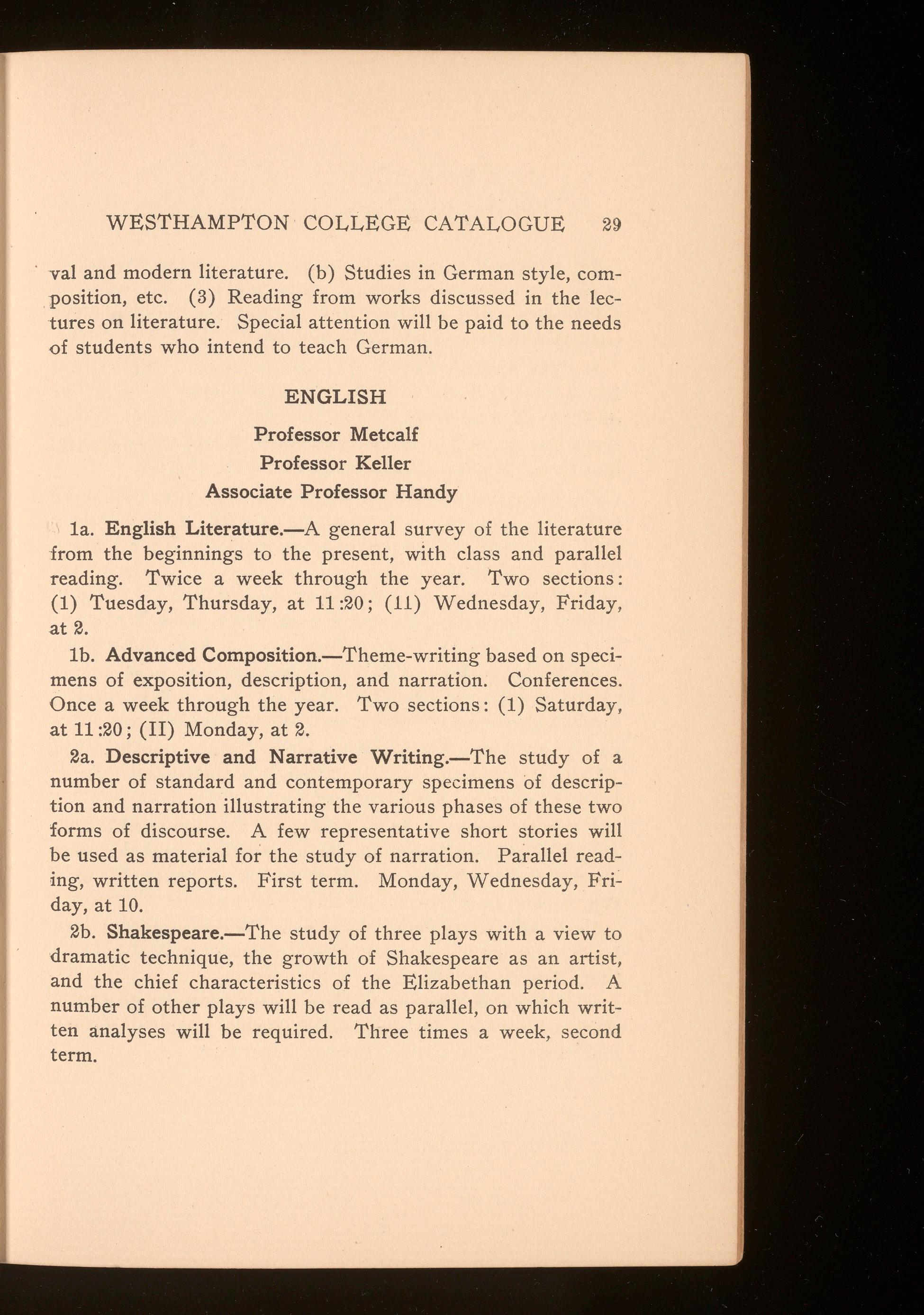
val and modern literature. (b) Studies in German style, composition, etc. (3) Reading from works discussed in the lectures on literature. Special attention will be paid to the needs of students who intend to teach German.
Professor Metcalf
Professor Keller
Associate Professor Handy
la. English Literature.-A general survey of the literature from the beginnings to the present, with class and parallel reading. Twice a week through the year. Two sections: (1) Tuesday, Thursday, at 11 :20; (11) Wednesday, Friday , at 2.
lb. Advanced Composition.-Theme-writing based on specimens of exposition, description, and narration. Conferences. Once a week through the year. Two sections: (1) Saturday, at 11 :20; (II) Monday, at 2.
2a. Descriptive and Narrative Writing.-The study of a number of standard and contemporary specimens of description and narration illustrating the various phases of these two forms of discourse. A few representative short stories will be used as material forthe study of narration. Parallel reading, written reports. First term. Monday, Wednesday, Friday, at 10.
2b. Shakespeare.-The study of three plays with a view to dramatic technique, the growth of Shakespeare as an artist, and the chief characteristics of the Elizabethan period. A number of other plays will be read as parallel, on which written analyses will be required. Three times a week, second term.
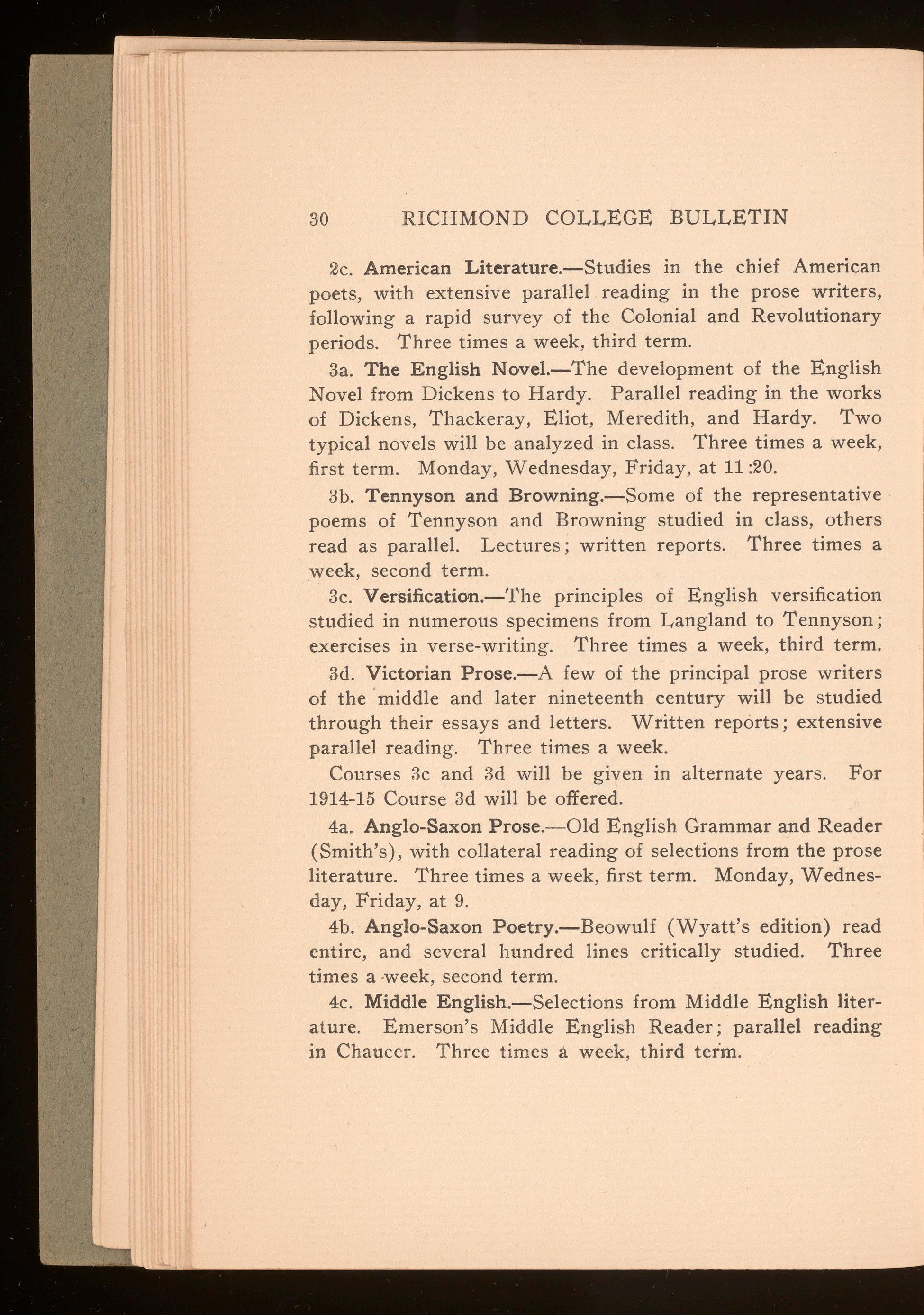
2c. American Literature.-Studies in the chief American poets, with extensive parallel reading in the prose writers, following a rapid survey of the Colonial and Revolutionary periods. Three times a week, third term.
3a. The English Novel.-The development of the English Novel from Dickens to Hardy. Parallel reading in the works of Dickens, Thackeray, Eliot, Meredith, and Hardy. Two typical novels will be analyzed in class. Three times a week, first term. Monday, Wednesday, Friday, at 11 :20.
3b. Tennyson and Browning.-Some of the representative poems of Tennyson and Browning studied in class, others read as parallel. Lectures ; written reports. Three times a week, second term.
3c. Versification.-The principles of English versification studied in numerous specimens from Langland to Tennyson; exercises in verse-writing. Three times a week, third term.
3d. Victorian Prose.-A few of the principal prose writers of the ·middle and later nineteenth century will be studied through their essays and letters. Written reports; extensive parallel reading. Three times a week.
Courses 3c and 3d will be given in alternate years. For 1914-15 Course 3d will be offered.
4a. Anglo-Saxon Prose.-Old English Grammar and Reader (Smith's), with collateral reading of selections from the prose literature. Three times a week, first term. Monday, Wednesday, Friday, at 9.
4b. Anglo-Saxon Poetry.-Beowulf (Wyatt's edition) read entire, and several hundred lines critically studied. Three times a -week, second term.
4c. Middle English.-Selections from Middle English literature. Emerson's Middle English Reader; parallel reading in Chaucer. Three times a week, third term.
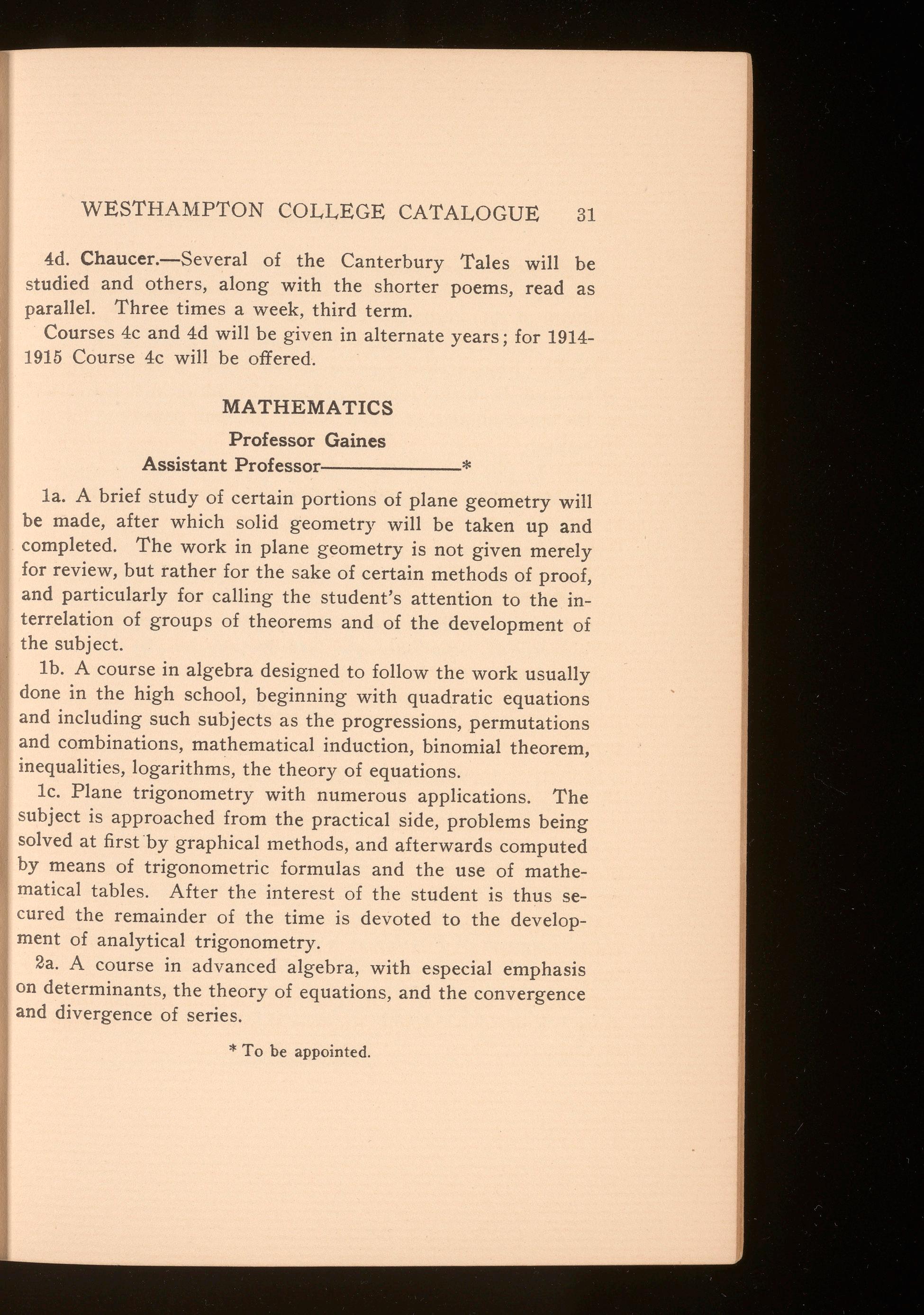
4d. Chaucer.-Several of the Canterbury Tales will be studied and others, along with the shorter poems, read as parallel. Three times a week, third term.
Courses 4c and 4d will be given in alternate years; for 19141915 Course 4c will be offered.
Professor Gaines Assistant Professor-------*
la. A brief study of certain portions of plane geometry will be made, after which solid geometry will be taken up and completed. The work in plane geometry is not given merely for review, but rather for the sake of certain methods of proof, and particularly for calling the student's attention to the interrelation of groups of theorems and of the development of the subject.
lb. A course in algebra designed to follow the work usually done in the high school, beginning with quadratic equations and including such subjects as the progressions, permutations and combinations, mathematical induction, binomial theorem, inequalities, logarithms, the theory of equations.
le. Plane trigonometry with numerous applications. The subject is approached from the practical side, problems being solved at first by graphical methods, and afterwards computed by means of trigonometric formulas and the use of mathem atical tables. After the interest of the student is thus secur ed the remainder of the time is devoted to the development of analytical trigonometry.
2a A course in advanced algebra, with especial emphasis on determinants, the theory of equations, and the convergence and divergence of series.
*Tobe appointed.
2b. Elementary analytical geometry with ·numerous illu strations of the use of graphical methods, followed by a detaile d study of the straight line and the circle.
2c. Analytical geometry continued. A study of the properties of the several species of the comic sections, followe d by a study of the general equation of the second degree an d the development of some of the general properties of th e conics.
3. In this course the entire year is given to the study of differential and integral calculus with numerous application s to problems of various kinds.
4 In this course the fall term will be given to advance d integral calculus. The work of the Winter and Spring term s will vary somewhat from year to year, but will include suc h subjects as infinite series and products, a brief course in differential equations , an introduction to the theory of functions.
Professor Loving
Assistant
Professor-------
la . Elementary General Physics.-This course covers in a n elementary way the fundamental principles of Physics, including Mechanics, Properties of Matter, Heat, Sound, Ligh t , Electricity and Magnetism. It is offered to meet the needs ( 1) of those who wish to acquire some knowledge of the simpl er phenomena of Physics as a part of a general education, an d (2) of those who may take up the study of medicine or som e related science. For admission to this course the studen t must have a knowledge of Algebra and Plane Geometry equi v-
* To be appointed

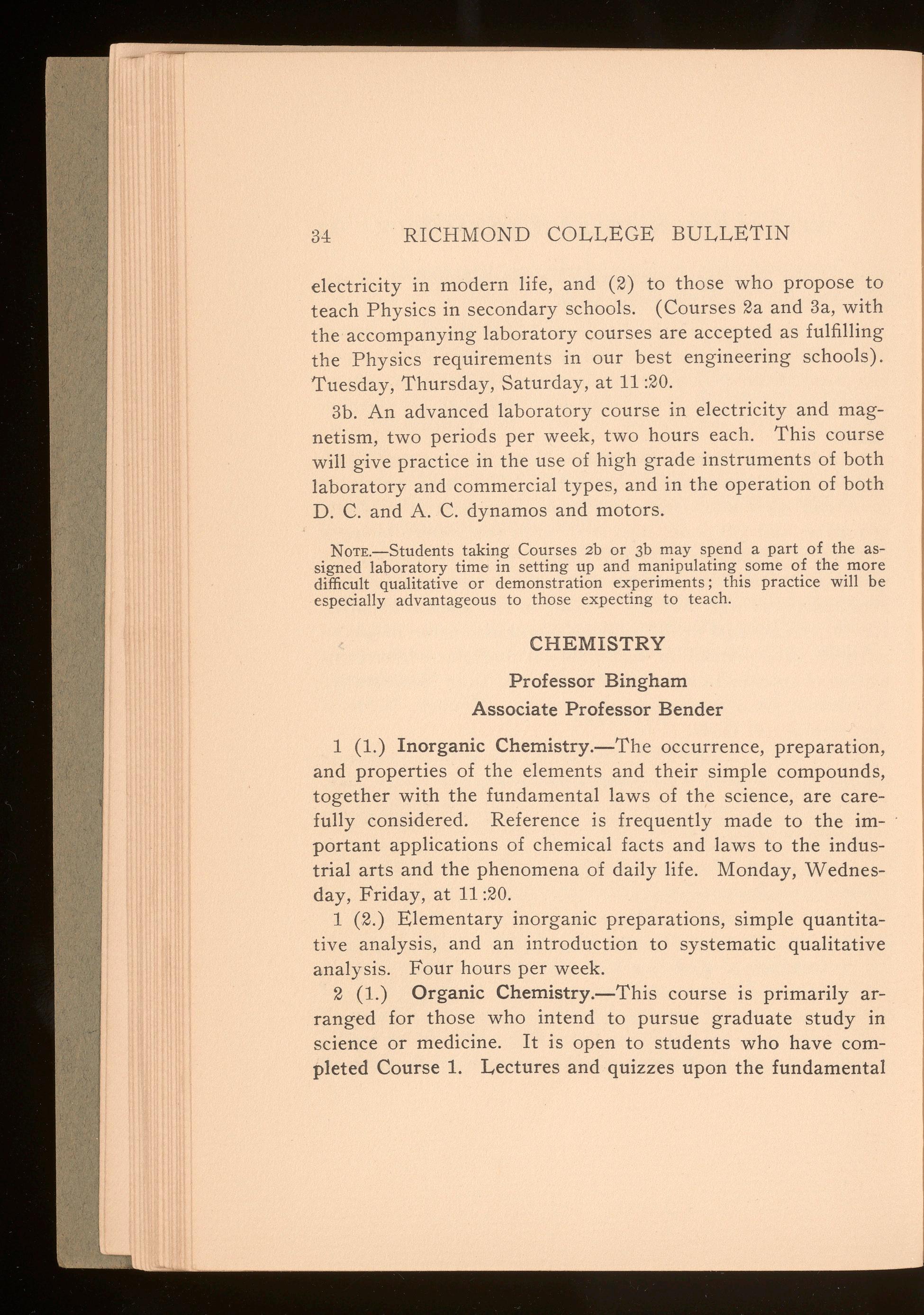
electricity in modern life, and (2) to those who propose to teach Physics in secondary schools. (Courses 2a and 3a, with the accompanying laboratory courses are accepted as fulfilling the Physics requirements in our best engineering schools). Tuesday, Thursday, Saturday, at 11 :20.
3b. An advanced laboratory course in electricity and magnetism, two periods per week, two hours each. This course will give practice in the use of high grade instruments of both laboratory and commercial types, and in the operation of both D. C. and A. C. dynamos and motors.
NoTE.-Students taking Courses 2b or 3b may spend a part of the assigned laboratory time in setting up and manipulating some of the more difficult qualitative or demonstration experiments; this practice will be especially advantageous to those expecting to teach.
Professor Bingham
Associate Professor Bender
1 (1.) Inorganic Chemistry.-The occurrence, preparation, and properties of the elements and their simple compounds, together with the fundamental laws of the science, are carefully considered. Reference is frequently made to the important applications of chemical facts and laws to the industrial arts and the phenomena of daily life. Monday, Wednesday, Friday, at 11 :20.
1 (2.) Elementary inorganic preparations, simple quantitative analysis, and an introduction to systematic qualitative analysis. Four hours per week.
2 (1.) Organic Chemistry.-This course is primarily arranged for those who intend to pursue graduate study in science or medicine. It is open to students who have completed Course 1. Lectures and quizzes upon the fundamental
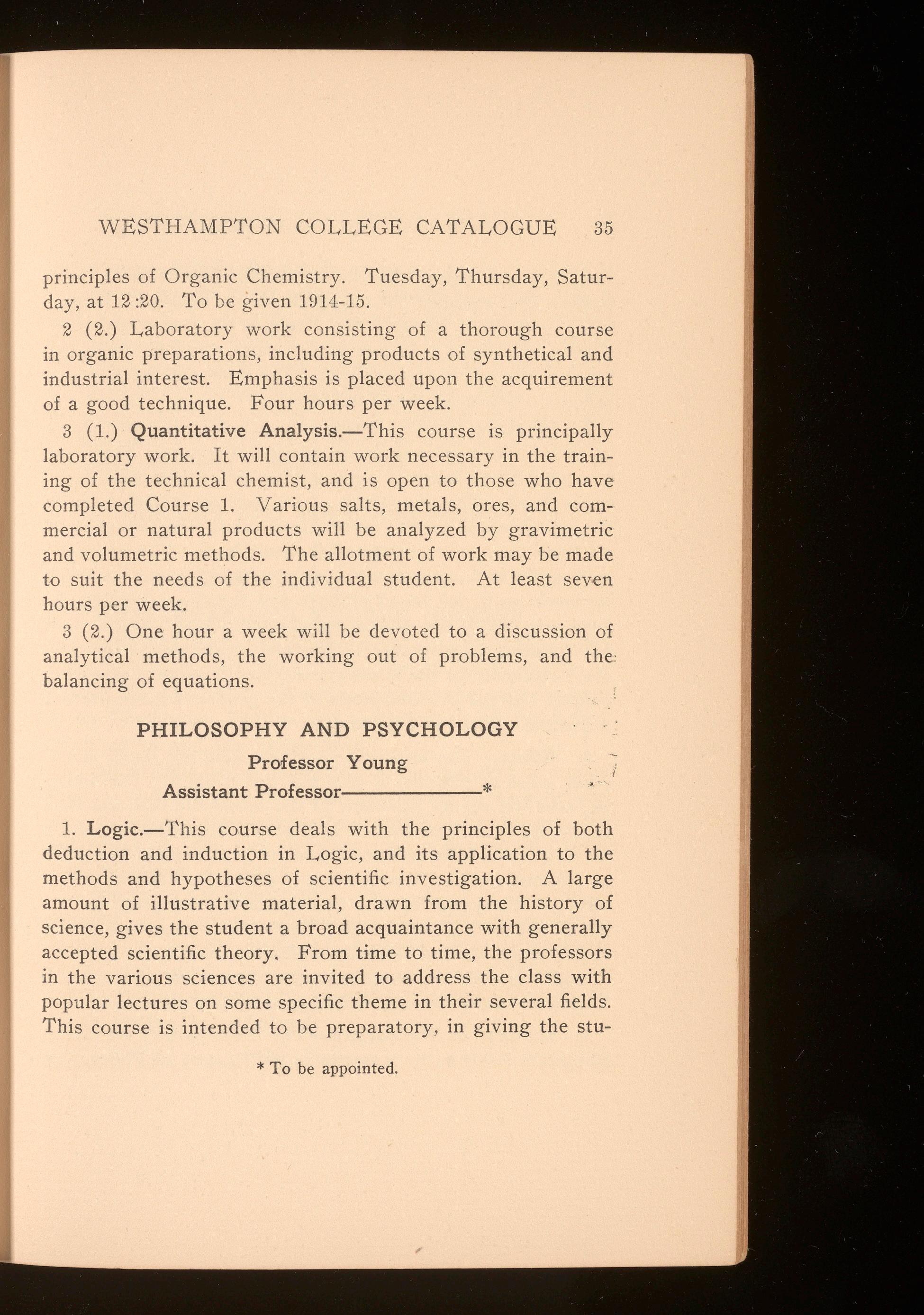
principles of Organic Chemistry. Tuesday, Thursday, Saturday, at 12 :20. To be given 1914-15.
2 (2.) Laboratory work consisting of a thorough course in organic preparations, including products of synthetical and industrial interest. Emphasis is placed upon the acquirement of a good technique. Four hours per week.
3 ( 1.) Quantitative Analysis.-This course is principally laboratory work. It will contain work necessary in the training of the technical chemist, and is open to those who have completed Course 1. Various salts, metals, ores, and commercial or natural products will be analyzed by gravimetric and volumetric methods. The allotment of work may be made to suit the needs of the individual student. At least seven hours per week.
3 (2.) One hour a week will be devoted to a discussion of analytical methods, the working out of problems, and the , balancing of equations.
Professor Young Assistant Professor-------*
1. Logic.-This course deals with the principles of both deduction and induction in Logic, and its application to the methods and hypotheses of scientific investigation. A large amount of illustrative material, drawn from the history of science, gives the student a broad acquaintance with generally accepted scientific theory. From time to time, the professors in the various sciences are invited to address the class with popular lectures on some specific theme in their several fields. This course is intended to be preparatory, in giving the stu-
* To be appointed.
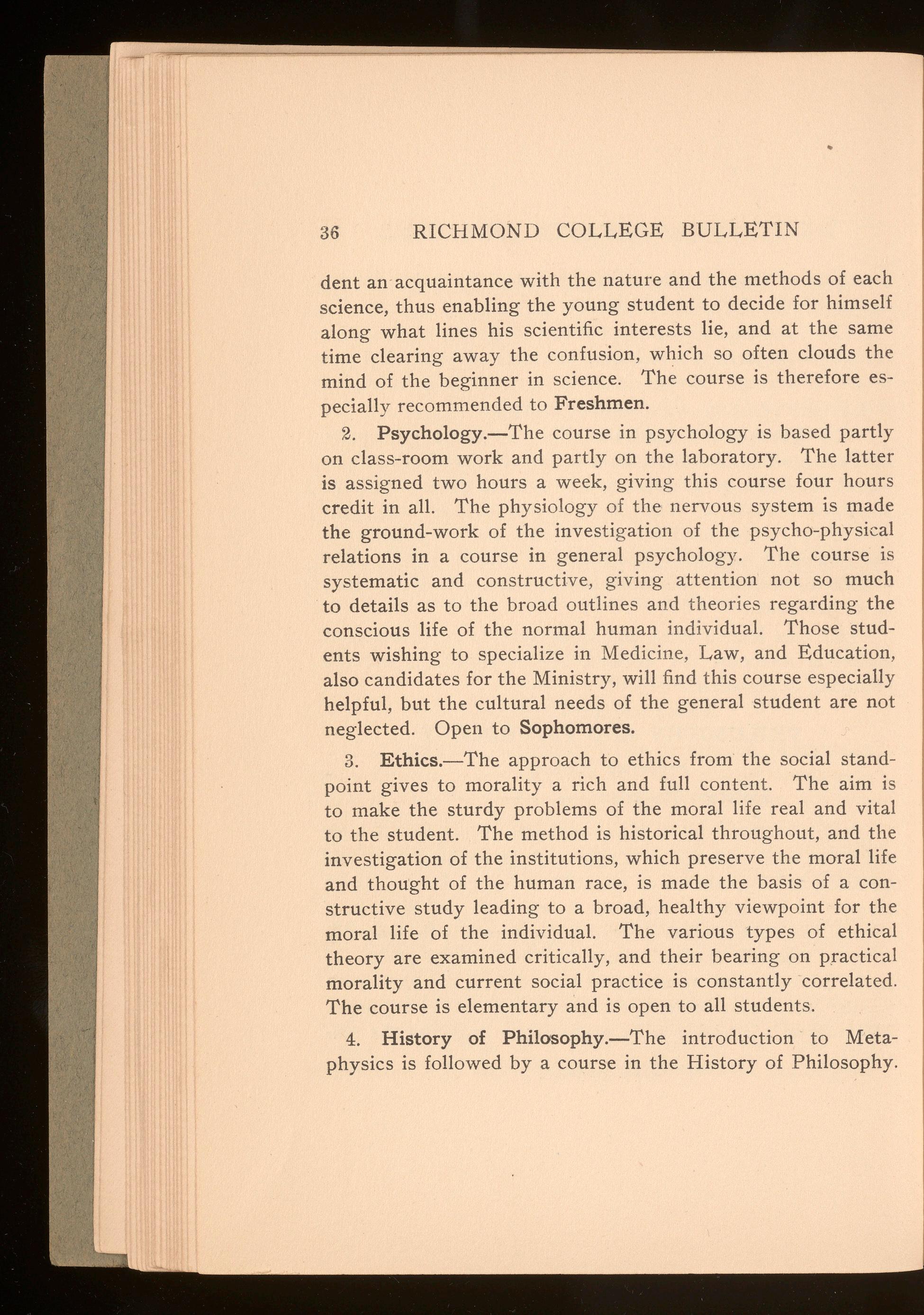
dent an acquaintance with the nature and the methods of each science, thus enabling the young student to decide for himself along what lines his scientific interests lie, and at the same time clearing away the confusion, which so often clouds the mind of the beginner in science. The course is therefore especially recommended to Freshmen.
2. Psychology.-The course in psychology is based partly on class-room work and partly on the laboratory. The latter is assigned two hours a week, giving this course four hours credit in all. The physiology of the nervous system is made the ground-work of the investigation of the psycho-physical relations in a course in general psychology. The course is systematic and constructive, giving attention not so much to details as to the broad outlines and theories regarding the conscious life of the normal human individual. Those students wishing to specialize in Medicine, Law, and Education, also candidates for the Ministry, will find this course especially helpful, but the cultural needs of the general student are not neglected. Open to Sophomores.
3. Ethics.-The approach to ethics from the social standpoint gives to morality a rich and full content. The aim is to make the sturdy problems of the moral life real and vital to the student. The method is historical throughout, and the investigation of the institutions, which preserve the moral life and thought of the human race, is made the basis of a constructive study leading to a broad, healthy viewpoint for the moral life of the individual. The various types of ethical theory are examined critically, and their bearing on practical morality and current social practice is constantly correlated. The course is elementary and is open to all students.
4. History of Philosophy.-The introduction to Metaphysics is followed by a course in the History of Philosophy.

This course reviews the development of human thought, as represented by the great original thinkers of Greece and of modern times. It proceeds on the assumption that philosophy must recognize the facts of science, and relate itself to these. The problems of reality and the limits of human knowledge, the categories of human thinking and the relations of the self, the world and God are the central concepts around which the discussions revolve. The course is open to all students who have completed Course 1. Given in 1915-'16.
Professor Anderson
Assistant Professor *
1. MEDIAEVAL AND MODERN HISTORY.
a. MEDIAEVAL.-Beginning with a study of the decline of the Roman Empire, the class will study the Germanic invasions, the rise of the Christian church, the establishment of the Carolingian Empire, the development of Feudalism, the Crusades and the Renaissance.
b. MODERN.-The second half of the year will be mainly taken up with a review of the leading events of the Reformation , the French Revolution, the growth of Democracy, the Unification of Italy and Germany, the economic and territorial expansion of Europe.
2. AMERICAN HISTORY.-The main lines of political, constitutional, and economic development since 1750 will be followed. Emphasis will be placed on the social forces which have brought things to pass, and on the events which have counted in the building of our present civilization. The course may be subdivided as follows:
* To be appointed.
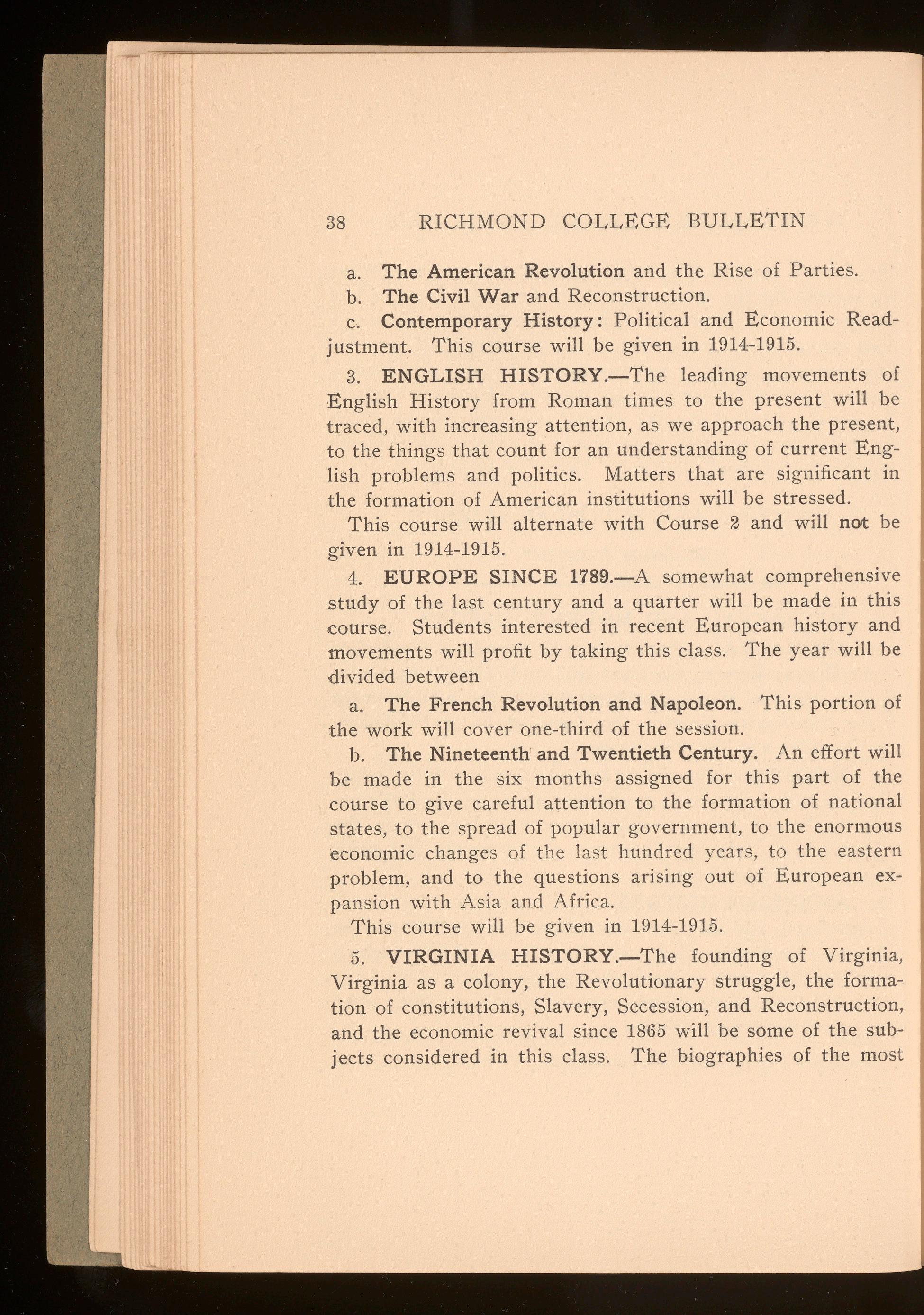
a. The American Revolution and the Rise of Parties.
b. The Civil War and Reconstruction.
c. Contemporary History: Political and Economic Readjustment. This course will be given in 1914-1915.
3. ENGLISH HISTORY.-The leading movements of English History from Roman times to the present will be traced, with increasing attention, as we approach the present, to the things that count for an understanding of current English problems and politics. Matters that are significant in the formation of American institutions will be stressed.
This course will alternate with Course 2 and will not be given in 1914-1915.
4. EUROPE SINCE 1789.-A somewhat comprehensive study of the last century and a quarter will be made in this course. Students interested in recent European history and movements will profit by taking this class. The year will be divided between
a. The French Revolution and Napoleon. This portion of the work will cover one-third of the session.
b. The Nineteenth and Twentieth Century. An effort will be made in the six months assigned for this part of the course to give careful attention to the formation of national states, to the spread of popular government, to the enormous economic changes of the last hundred years, to the eastern problem, and to the questions arising out of European expansion with Asia and Africa.
This course will be given in 1914-1915.
5. VIRGINIA HISTORY.-The founding of Virginia, Virginia as a colony, the Revolutionary struggle, the formation of constitutions, Slavery, Secession, and Reconstruction, and the economic revival since 1865 will be some of the subjects considered in this class. The biographies of the most

eminent statesmen, religious leaders, and educators will be touched upon. The objects of the course are, in the main, two: to afford students an opportunity to gain a knowledge of the History of the Old Dominion, and to encourage the development of historical scholarship among us.
This course alternates with Course 4 and will not be given in 1914-1915.
1. American Government will be discussed, National, State, and Local, both in theory and practice. Special topics are assigned for investigation, and parallel reading is required. Considerable attention will be given to current problems. Given in 1914-'15.
la. National Government. Origin, colonial experience, Federal Constitution, the President, Congress, Judiciary, Departments, Political Parties, current problems.
lb. State Government. Constitutional basis, the Executive, the Legislative, the Courts. Particular attention will be given to the institutions and problems of Virginia.
le. Municipal and Rural Government. The American city, history, organization, reform movements, such as the Commission and the City Manager plans; the town, county, village.
2. The Theory of Political Science and Comparative Government will be discussed. Such subjects as the origin of the State, the classification of States, the forms of government, the distribution of powers, the departments of government, as well as the leading features of the most important governments of the world will be briefly but carefully considered. Not given in 1914-'15.

Particular attention of students in the department of History and Political Science is called t o a medal offered by Hon. J. Taylor Ellys on, Lieutenant-Governor of Virginia and President of the Board of Trustees of Richmond College, for the best original investigation in some unworked field of Virginia History. Entrance int o the contest for this medal gives a very valuable opportunity for ambitious students to learn something of scholarly methods and to gain some conception of the attractiveness of independent work.
Associate Professor Olmsted
1. General Biology.-A study of the cell as a biological unit, and its activities , and of the structure, development and biology of invertebrate animal types from the Proto zoa to the Arthropods, selected t o illustrate general principles. A detailed study of the frog will follow as an example of a vertebrate. The student will trace the digestive, blood, nervous and muscular systems, and comparisons will be made with other vertebrates. The remainder of the year will consist in the fundamentals of Botany. At first seedlings, later typical and modified stems, roots and leaves , finally organs of reproduction, involving pollination and fertilization; plant societies and the economic relations of plants will be stuided This course is designed not only to present biological principles, but also to train the student in observation and in interpretation of biological principles.
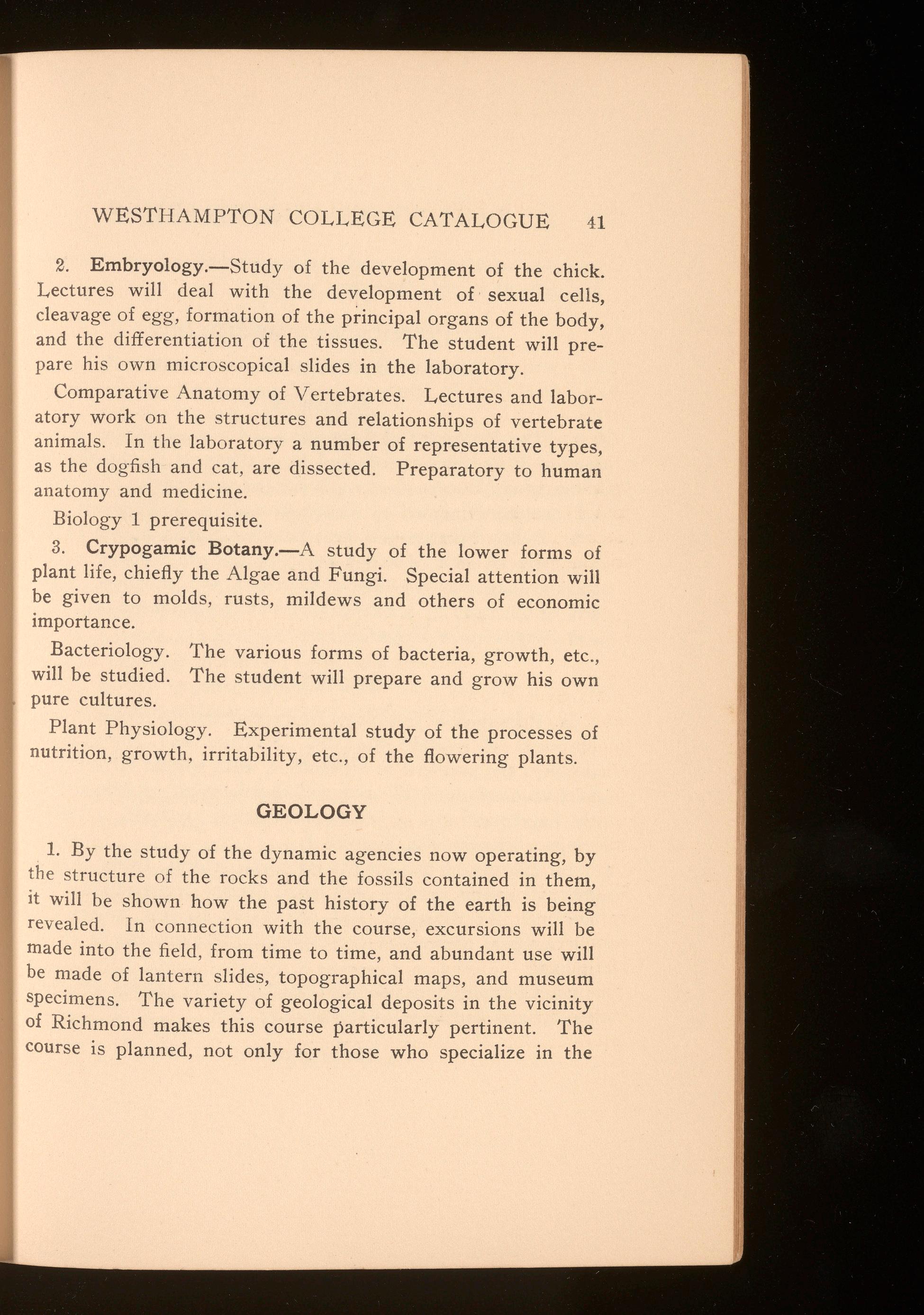
2. Embryology.-Study of the development of the chick. Lectures will deal with the development of sexual cells, cleavage of egg, formation of the principal organs of the body, and the differentiation of the tissues. The student will prepare his own microscopical slides in the laboratory.
Comparative Anatomy of Vertebrates. Lectures and laboratory work on the structures and relationships of vertebrate animals. In the laboratory a number of representative types, as the dogfish and cat, are dissected. Preparatory to human anatomy and medicine.
Biology 1 prerequisite.
3. Crypogamic Botany.-A study of the lower forms of plant life, chiefly the Algae and Fungi. Special attention will be given to molds, rusts, mildews and others of economic importance.
Bacteriology. The various forms of bacteria, growth, etc., will be studied. The student will prepare and grow his own pure cultures.
Plant Physiology. Experimental study of the processes of nutrition, growth, irritability, etc., of the flowering plants.
1. By the study of the dynamic agencies now operating, by the structure of the rocks and the fossils contained in them, it will be shown how the past history of the earth is being revealed. In connection with the course, excursions will be made into the field, from time to time, and abundant use will be made of lantern slides, topographical maps, and museum specimens. The variety of geological deposits in the vicinity of Richmond makes this course particularly pertinent. The course is planned, not only for those who specialize in the

sciences, but also for any who desire a broad cultural training . Not offered in 1914-'15.
Associate Professor *
Economics
1. The Principles of Economics.-A survey of the principles of Economics is followed by a study of the bearing of these principles on modern American conditions. Lectures will be supplemented by assigned readings and reports.
2. Public Finance.-Money, Banking, Taxation; the Labor Problem. A more detailed study of the problems of public finance than was possible in Course 1 will be given. This will be followed by a consideration of the problems of Labor and Wages in the United States.
la. Principles of Sociology; the social theory, methods, and problems of modern life; the structure and evolution of Society; the progress of civilization, with special reference to modern times, and the rise and development of democracy; the nature and end of Society. Textbook; lectures; assigned topics. Prerequisite, History l.
lb. History of movements for social reform; study of poverty, its causes, control, and cure; charity organizations; the criminal, the defective, and dependent classes; causes and character of crime and the criminal; development of criminology.
le. Christianity in its social bearings, with special reference to life and problems of the modern city.
* To be appointed.

1. The Histoiry of Education -Educati onal Systems and Ideals of the Greeks and Romans; study of Plato and Aristotle and the schools of the Empire.
la. Educational System of the Middle Ages; rise, growth, and significance of universities; study of leaders of Humanism.
lb. Historical study of the organization, systems, and ideals -0f American education; first-hand investigati o n of State and local problems assigned.
2. Theory of Education.-A study of the fundamental principles of education, with special reference to present culture, ideals, and thought.
2a. Science and practice of education, with special reference to the relations of citizen, pupil, and teacher.
2b. School organization and supervision and the treatment -0f practical problems of school administration.
The Department of Music will be under the supervision of a competent and skilled Director, who will have associated with him two or more assistant professors. Instruction, both theoretical and practical, will be given in theory and history of music, and in piano, organ, solo singing, choral and sight singing, and in methods of teaching music.
In order to take courses in this department, students must have attained some degree of technical proficiency. Since this catalogue goes to press before the Faculty list has been completed, it is not practicable to set forth in detail the cours es
* To be appointed
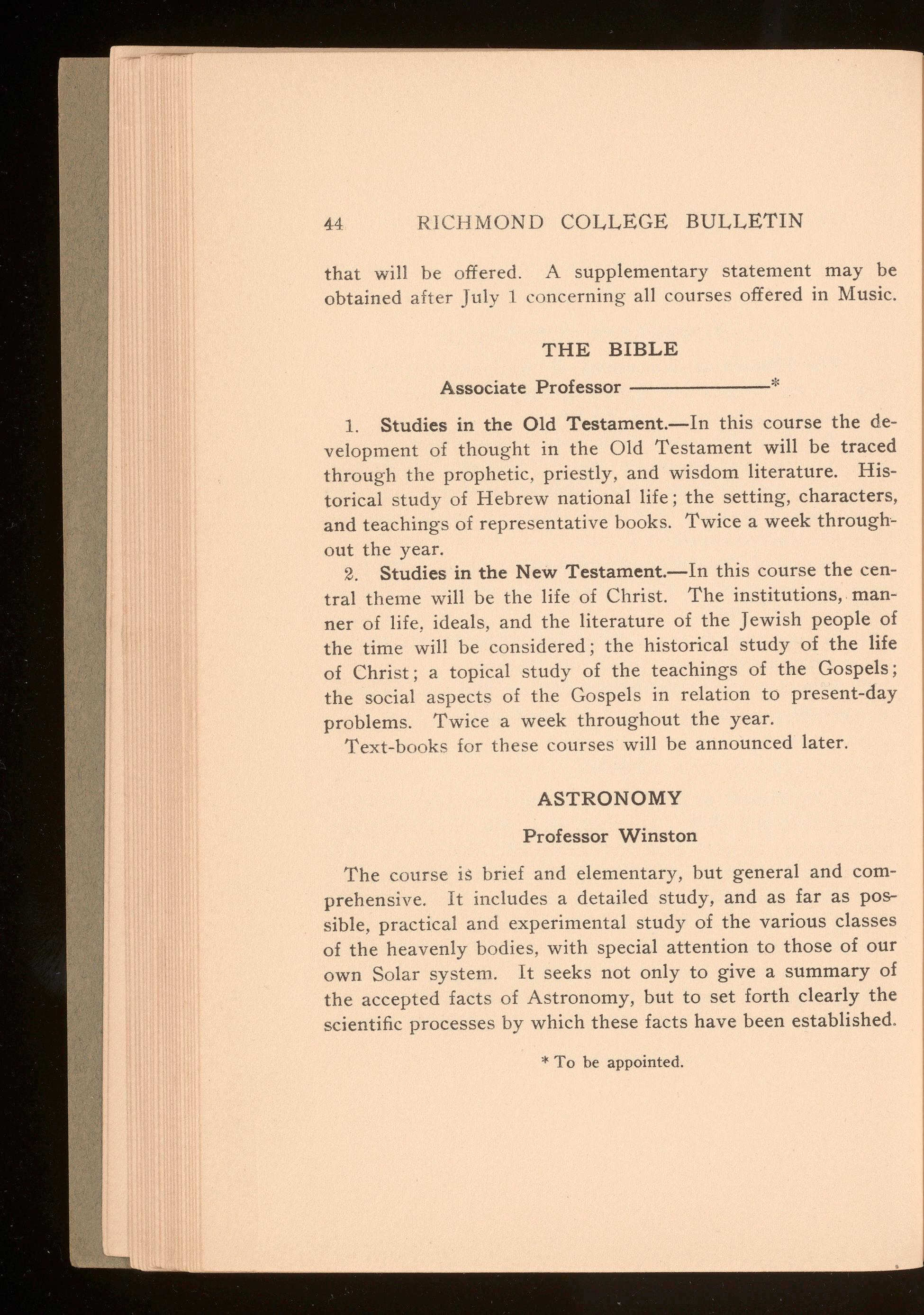
that will be offered. A supplementary statement may be obtained after July l concerning all courses offered in Music.
1. Studies in the Old Testament.-In this course the development of thought in the Old Testament will be traced through the prophetic, priestly, and wisdom literature. Historical study of Hebrew national life; the setting, characters, and teachings of representative books. Twice a week through~ out the year.
2. Studies in the New Testament.-In this course the central theme will be the life of Christ. The institutions, . manner of life, ideals, and the literature of the Jewish people of the time will be considered; the historical study of the life of Christ; a topical study of the teachings of the Gospels; the social aspects of the Gospels in relation to present-day problems. Twice a week throughout the year.
Text-books for these courses will be announced later.
The course is brief and elementary, but general and comprehensive. It includes a detailed study, and as far as possible, practical and experimental study of the various classes of the heavenly bodies, with special attention to those of our own Solar system. It seeks not only to give a summary of the accepted facts of Astronomy, but to set forth clearly the scientific processes by which these facts have been established.
* To be appointed.

consists of making Dimensional Drawings for use in practice~ good shop systems being employed. The instruction includes the making of working details, assembly drawings, and blue-prints of machinery from measurements.
Students in all courses furnish their own drawing instruments.
The work completed in this department is granted full value at all the universities and technical schools in the country.
The General Library of Richmond College occupies one wing of the Administration Building and contains over twenty thousand volumes arranged and catalogued according to the Dewey system. The latest editions of encyclopaedias, dictionaries, and other reference books are freely accessible to students. Books, except those reserved for departmental use, . may be borrowed for periods of two weeks. The Library is. open daily, except on Sundays and holidays, from 9 A. M. to 9 P. M.
Through the courtesy of the officers of the Virginia State Library, that valuable collection is available for reading and research to the students of the College.
The General Library is open to the most advanced classes of Westhampton College during certain hours of the day. Several department libraries and a small collection of general reference books and works in general literature have been placed in Westhampton College for the use of students. These, together with such books as may be ordered from the General Library, will serve the needs of most classes. Specific announcements and regulations will be made later.

These Lectures are provided for by "The Thomas Museum Lecture Endowment" of $11,000 donated by his family in memory of the late president of the corporation, James Thomas, Jr. They are delivered annually by eminent men of our own and foreign countries on Science, Philosophy, Art or Literature, and by special provision are open to the public without charge. The following distinguished scholars have delighted large audiences and greatly stimulated literary and scientific research:
Charles A. Young, Ph. D., of Princeton; H. Newell Martin, Ph. D., of Johns Hopkins University; W . T. Harris, LL. D., United States Commissioner of Education; President D. C. Gilman, LL. D., of Johns Hopkins University; Professor Robert Y. Tyrrell, M. A., University of Dublin, Ireland; Horace H. Furness, Ph. D., LL. D., of Philadelphia; Professor C. T. Winchester, A. M., of Wesleyan University; Professor Albion W. Small, Ph. D., of Chicago University; President G. Stanley Hall, Ph. D., LL. D., of Clark University; Professor J. Henry Breasted, Ph. D., of Chicago University; President Woodrow Wilson, Ph. D., LL. D., of Princeton University; President Benjamin Ide wheeler, Ph. D., LL. D., of the University of California; Hamilton Wright Mabie, LL. D., of New York; Sir Robert Ball, of Oxford; Professor Henry Van Dyke, LL. D., of Princeton; Mr. Lorado Taft, of Chicago; Professor Ario Bates, of the Massachusetts Institute of Technology; Professor John B. Clarke, LL. D., of Columbia University; Professor Josiah Royce, Ph. D., LL. D., of Harvard University; Professor W. P. Trent, LL. D., of Columbia University; Professor B. L. Gildersleeve, Ph. D., LL. D., of the Johns Hopkins University; Mr. Walter H. Page, editor of
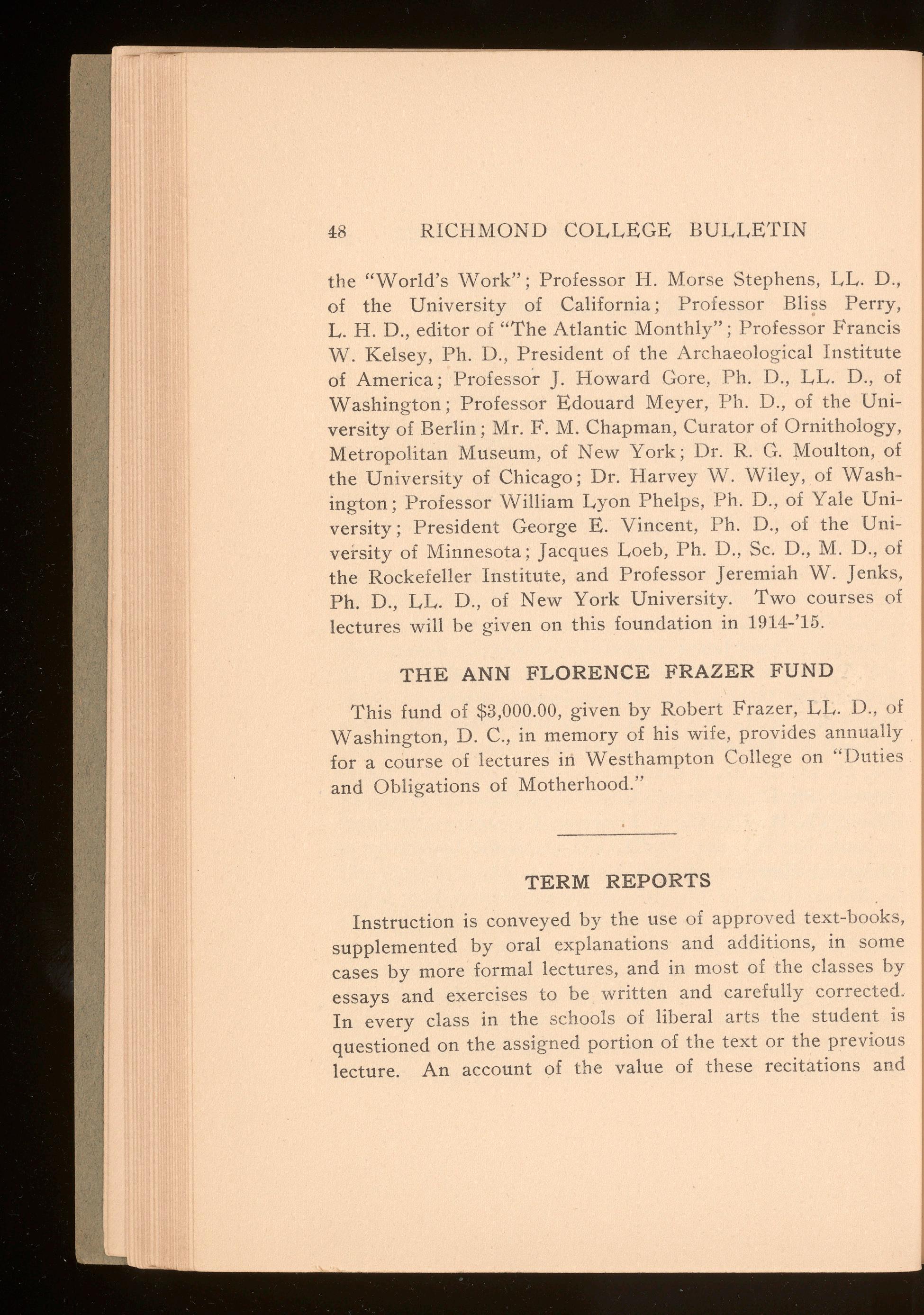
the "World's Vlork"; Professor H . Morse Stephens, LL. D., of the University of California; Professor Bliss Perry, L. H. D., editor of "The Atlantic Monthly"; Professor Francis W. Kelsey, Ph. D. , President of the Archaeological Institute of America; Professor J. Howard Gore, Ph. D., LL. D., of Washington; Professor Edouard Meyer, Ph. D., of the University of Berlin; Mr. F. M. Chapman, Curator of Ornithology, Metropolitan Museum, of New York; Dr. R. G. Moulton, of the University of Chicago; Dr. Harvey W. Wiley, of Washington; Professor William Lyon Phelps, Ph. D., of Yale University; President George E. Vincent, Ph. D., of the University of Minnesota; Jacques Loeb, Ph.D., Sc. D., M. D., of the Rockefeller Institute, and Professor Jeremiah W. Jenks, Ph. D., LL. D., of New York University. Two courses of lectures will be given on this foundation in 1914-'15.
This fund of $3,000.00, given by Robert Frazer, LL. D., of Washington, D. C., in memory of his wife, provides annually for a course of lectures in Westhampton College on "Duties and Obligations of Motherhood."
Instruction is conveyed by the use of approved text-books, supplemented by oral explanations and additions, in some cases by more formal lectures, and in most of the classes by essays and exercises to be written and carefully corrected. In every class in the schools of liberal arts the student is questioned on the assigned portion of the text or the previous lecture. An account of the value of these recitations and
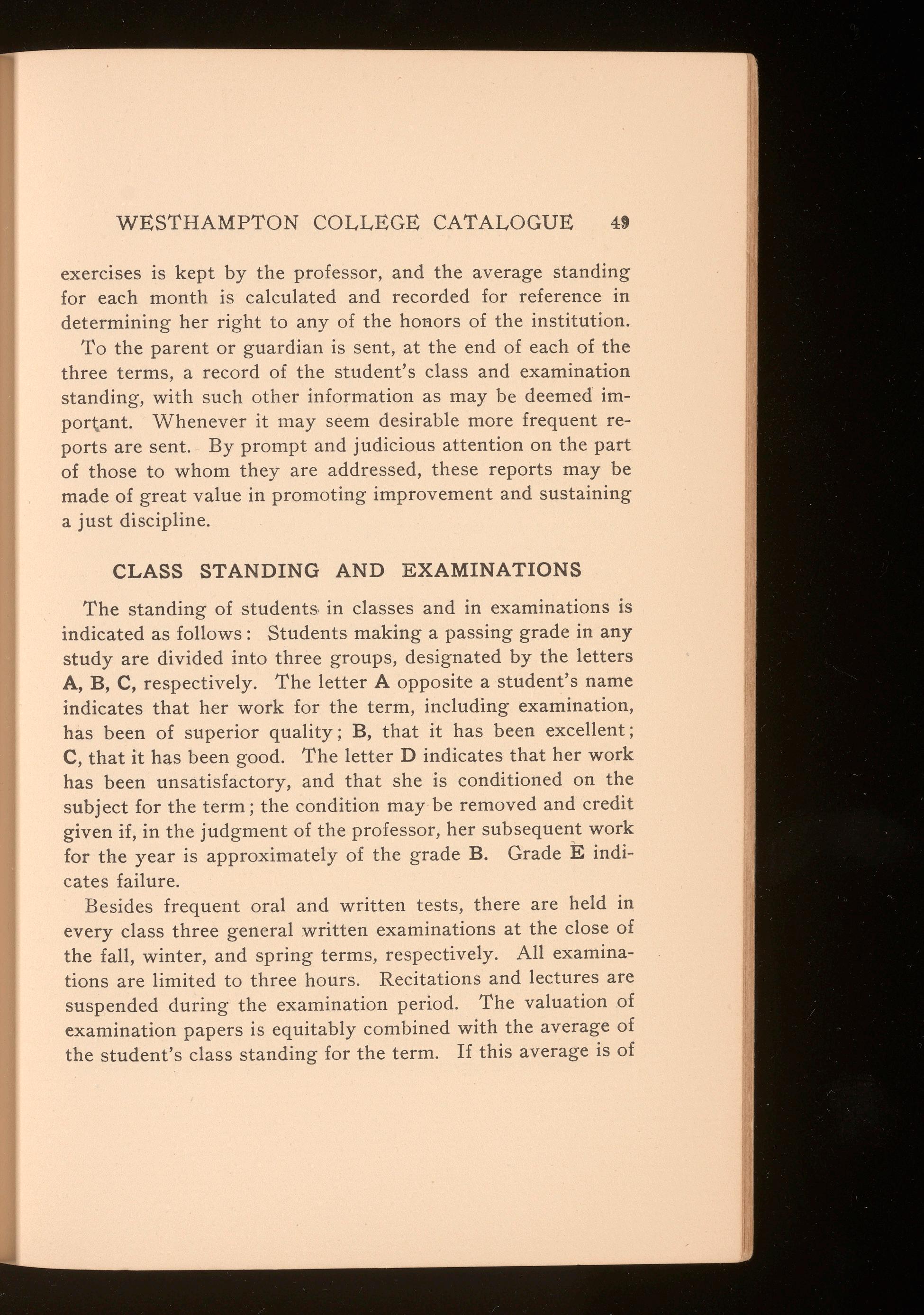
exercises is kept by the professor, and the average standing for each month is calculated and recorded for reference in determining her right to any of the honors of the institution.
To the parent or guardian is sent, at the end of each of the three terms, a record of the student's class and examination standing, with such other information as may be deemed important. Whenever it may seem desirable more frequent reports are sent . By prompt and judicious attention on the part of those to whom they are addressed, these reports may be made of great value in promoting improvement and sustaining a just discipline.
The standing of students in classes and in examinations is indicated as follows: Students making a passing grade in any study are divided into three groups, designated by the letters A, B, C, respectively. The letter A opposite a student's name indicates that her work for the term, including examination, has been of superior quality; B, that it has been excellent; C, that it has been good. The letter D indicates that her work has been unsatisfactory, and that she is conditioned on the subject for the term; the condition may be removed and credit given if, in the judgment of the professor, her subsequent work for the year is approximately of the grade B. Grade E indicates failure.
Besides frequent oral and written tests, there are held in every class three general written examinations at the close of the fall, winter, and spring terms, respectively. All examinations are limited to three hours. Recitations and lectures are suspended during the examination period. The valuation of examination papers is equitably combined with the average of the student's class standing for the term If this average is of
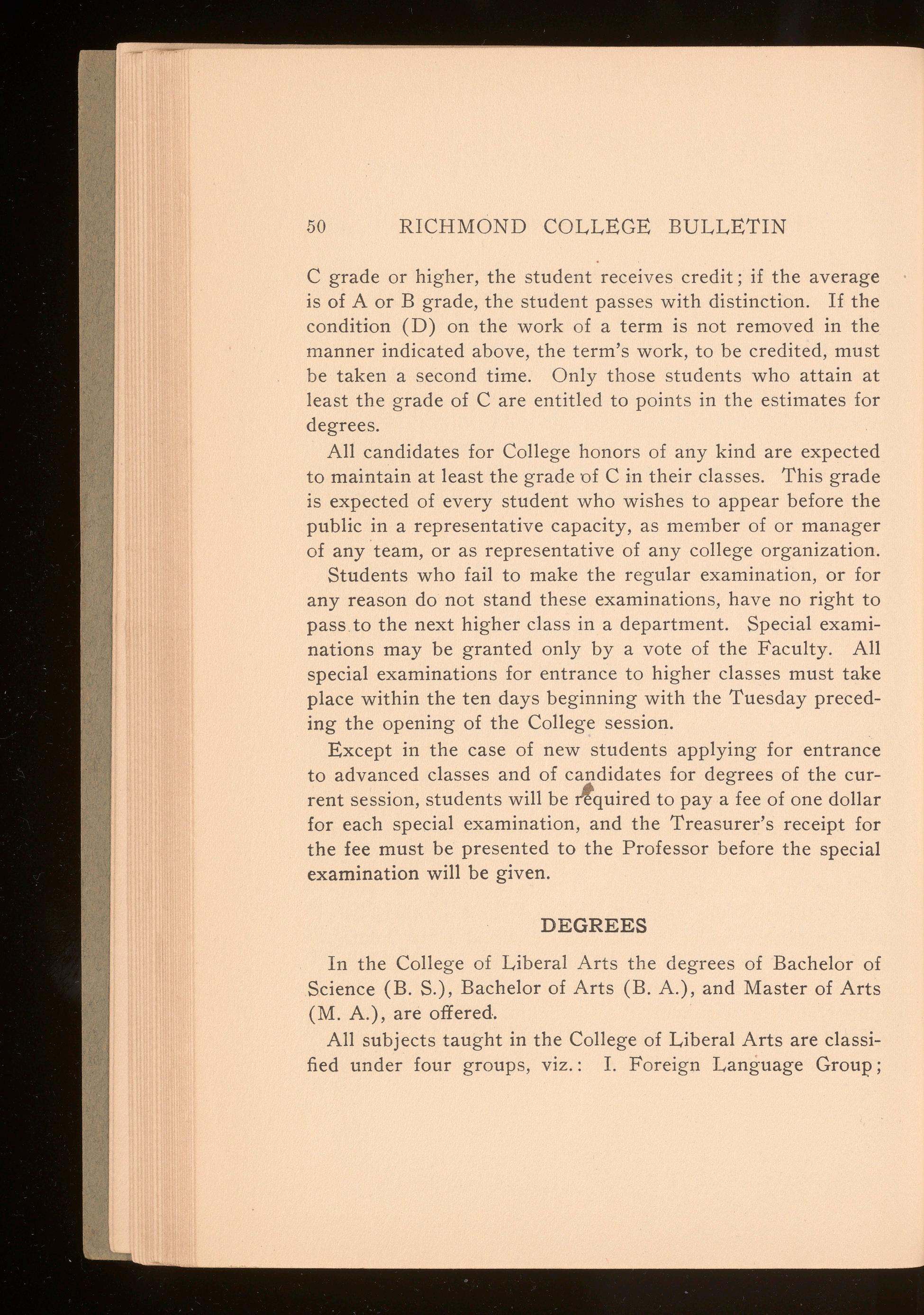
C grade or higher, the student receives credit; if the average is of A or B grade, the student passes with distinction. If the condition (D) on the work of a term is not removed in the manner indicated above, the term's work, to be credited, must be taken a second time. Only those students who attain at least the grade of C are entitled to points in the estimates for degrees.
All candidates for College honors of any kind are expected to maintain at least the grade of C in their classes. This grade is expected of every student who wishes to appear before the public in a representative capacity, as member of or manager of any team, or as representative of any college organization. Students who fail to make the regular examination, or for any reason do not stand these examinations, have no right to pass .to the next higher class in a department. Special examinations may be granted only by a vote of the Faculty. All special examinations for entrance to higher classes must take place within the ten days beginning with the Tuesday preceding the opening of the College session.
Except in the case of new students applying for entrance to advanced classes and of candidates for degrees of the current session, students will be tfquired to pay a fee of one dollar for each special examination, and the Treasurer's receipt for the fee must be presented to the Professor before the special examination will be given.
In the College of Liberal Arts the degrees of Bachelor of Science (B. S.), Bachelor of Arts (B. A.), and Master of Arts (M. A.), are offered.
All subjects taught in the College of Liberal Arts are classified under four groups, viz. : I. Foreign Language Group;

II. Scientific Group; III. English-Historical Group; IV. Social Science Group. The several groups, arranged according to departments and courses, are as follows:
Group I
Latin 1, 2, 3, 4; Greek 1, 2, 3, 4; French 1, 2, 3; Spanish 1, 2; German 1, 2, 3.
Group II
Mathematics 1, 2, 3 [or 4); Physics 1, 2 [or 3]; Chemistry 1, 2 [or 3]; Biology and Geology 1, 2, 3; Drawing 1, 2, 3, 4; Astronomy 1.
Group III
English 1, 2, 3, 4; Public Speaking 1; History 1, 2 [or 3] ; 4 [ or 5] ; Political Science 1 [ or 2].
Group IV
Philosophy 1, 2, 3 [or 4] ; Economics and Sociology 1, 2, 3; Education 1, 2; Bible 1, 2.
The candidate for a bachelor's degr~e is required to attain sixty points, a point being the value of one class-hour of work per week through the year. Each class, unless otherwise stated, counts three points. A laboratory period of two hours is equivalent to one class-hour. Fifteen hours per week are regarded as the standard amount of work, twelve hours the minimum, and eighteen hours the maximum. While considerable freedom in the choice of studies is allowed, the student will not be permitted, except for good and sufficient reasons,
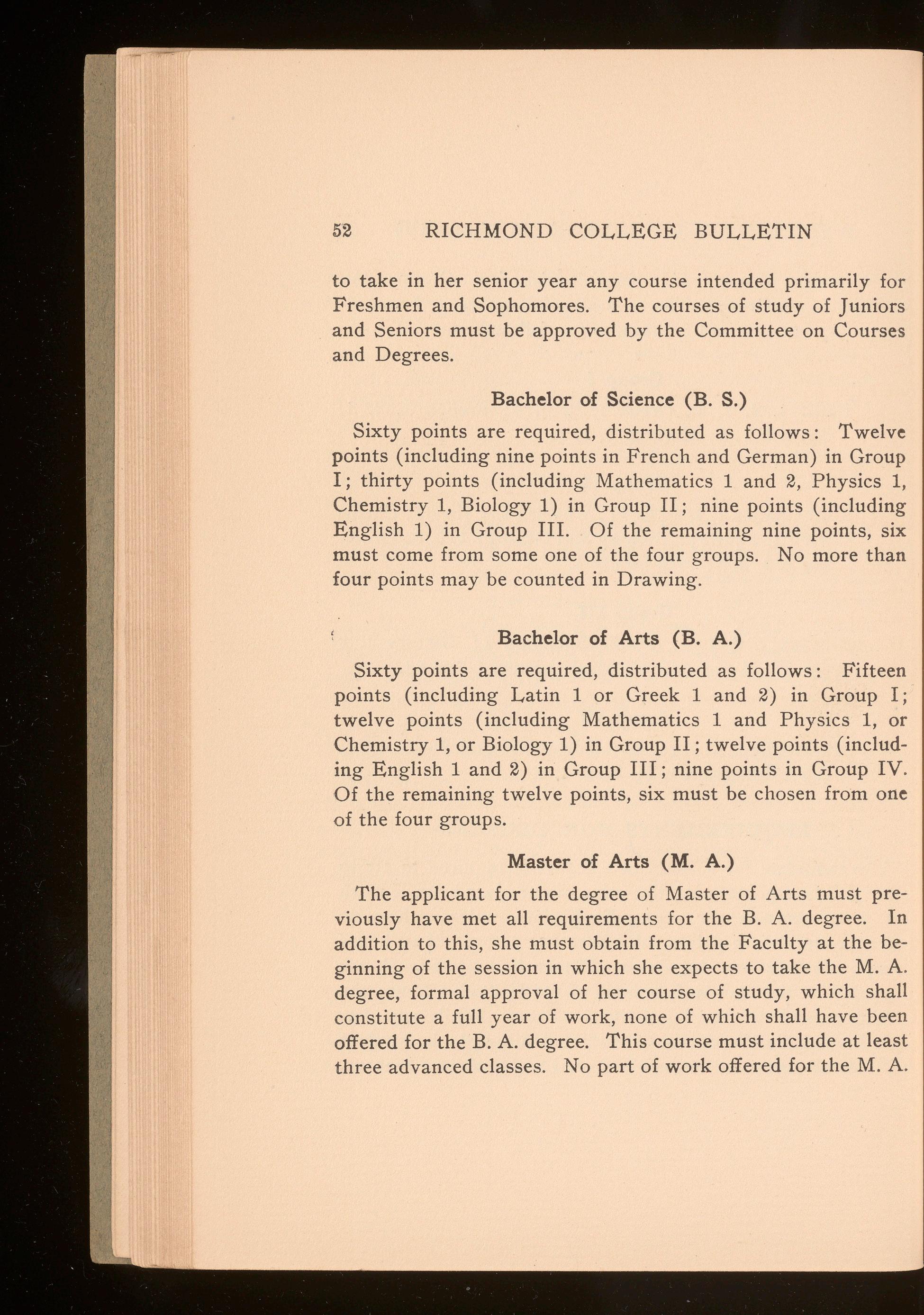
to take in her senior year any course intended primarily for Freshmen and Sophomores. The courses of study of Juniors and Seniors must be approved by the Committee on Courses and Degrees.
Sixty points are required, distributed as follows: Twelve points (including nine points in French and German) in Group I; thirty points (including Mathematics 1 and 2, Physics 1, Chemistry 1, Biology 1) in Group II; nine points (including English 1) in Group III. Of the remaining nine points, six must come from some one of the four groups. No more than four points may be counted in Drawing .
Sixty points are required, distributed as follows: Fifteen points (including Latin 1 or Greek 1 and 2) in Group I; twelve points (including Mathematics 1 and Physics 1, or Chemistry 1, or Biology 1) in Group II; twelve points (including English 1 and 2) in Group III; nine points in Group IV Of the remaining twelve points, six must be chosen from one of the four groups.
The applicant for the degree of Master of Arts must previously have met all requirements for the B. A. degree. In addition to this, she must obtain from the Faculty at the beginning of the session in which she expects to take the M. A degree, formal approval of her course of study, which shall constitute a full year of work, none of which shall have been offered for the B. A. degree. This course must include at least three advanced classes. No part of work offered for the M.A
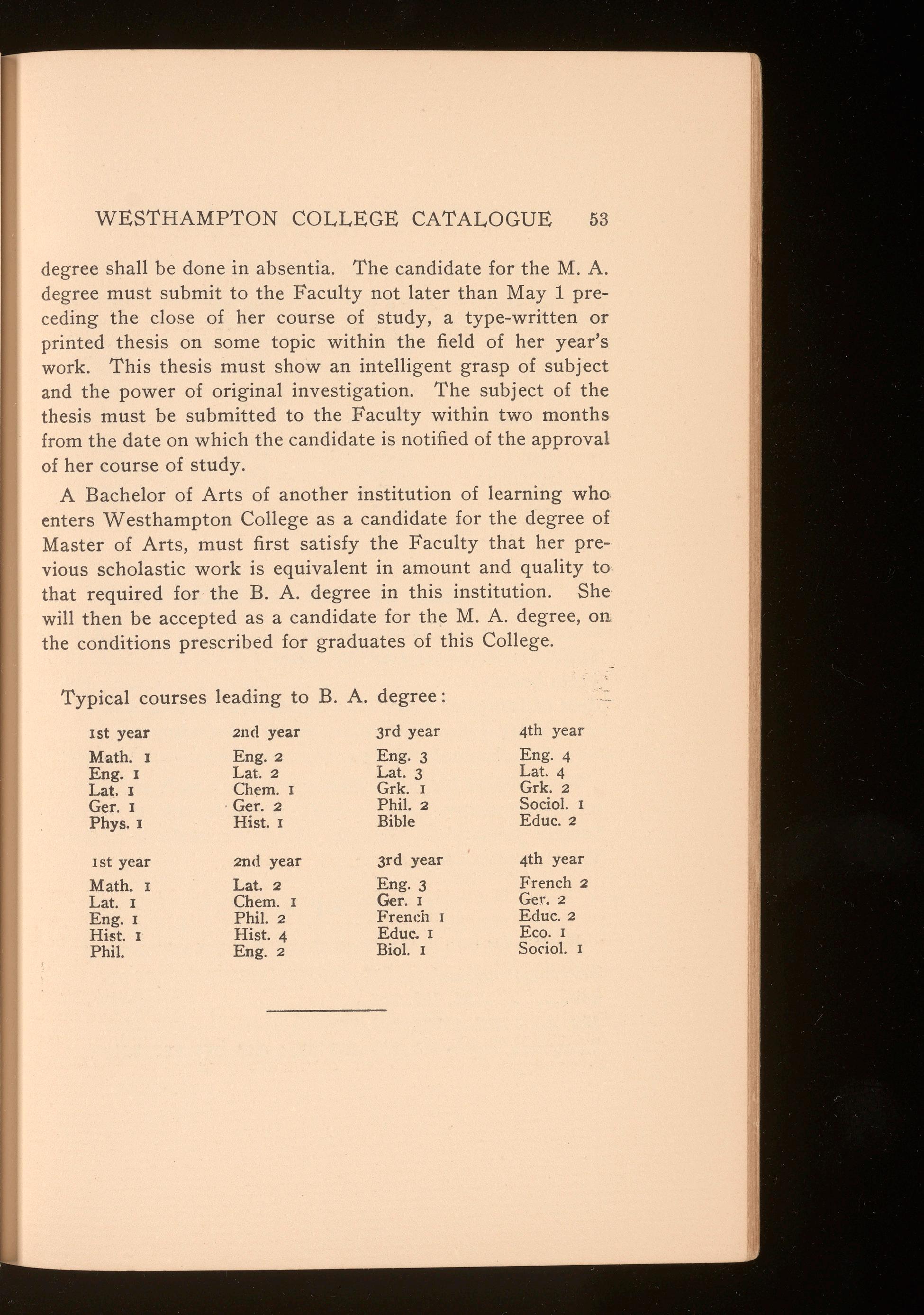
degree shall be done in absentia. The candidate for the M. A. d egree must submit to the Faculty not later than May 1 preceding the close of her course of study, a type-written or printed thesis on some topic within the field of her year's work. This thesis must show an intelligent grasp of subject and the power of original investigation. The subject of the thesis must be submitted to the Faculty within two months from the date on which the candidate is notified of the approval of her course of study.
A Bachelor of Arts of another institution of learning who enters Westhampton College as a candidate for the degree of Master of Arts, must first satisfy the Faculty that her previous scholastic work is equivalent in amount and quality to that required for the B. A . degree in this institution. She will then be accepted as a candidate for the M. A . degree , on the conditions prescribed for graduates of this College.
Typical courses leading to B. S. degree :
1st year
Math. 1
Eng. 1
French I Phil. I Phys. I
1st year
Math. I Eng. I
French I Phys. I Ger. I
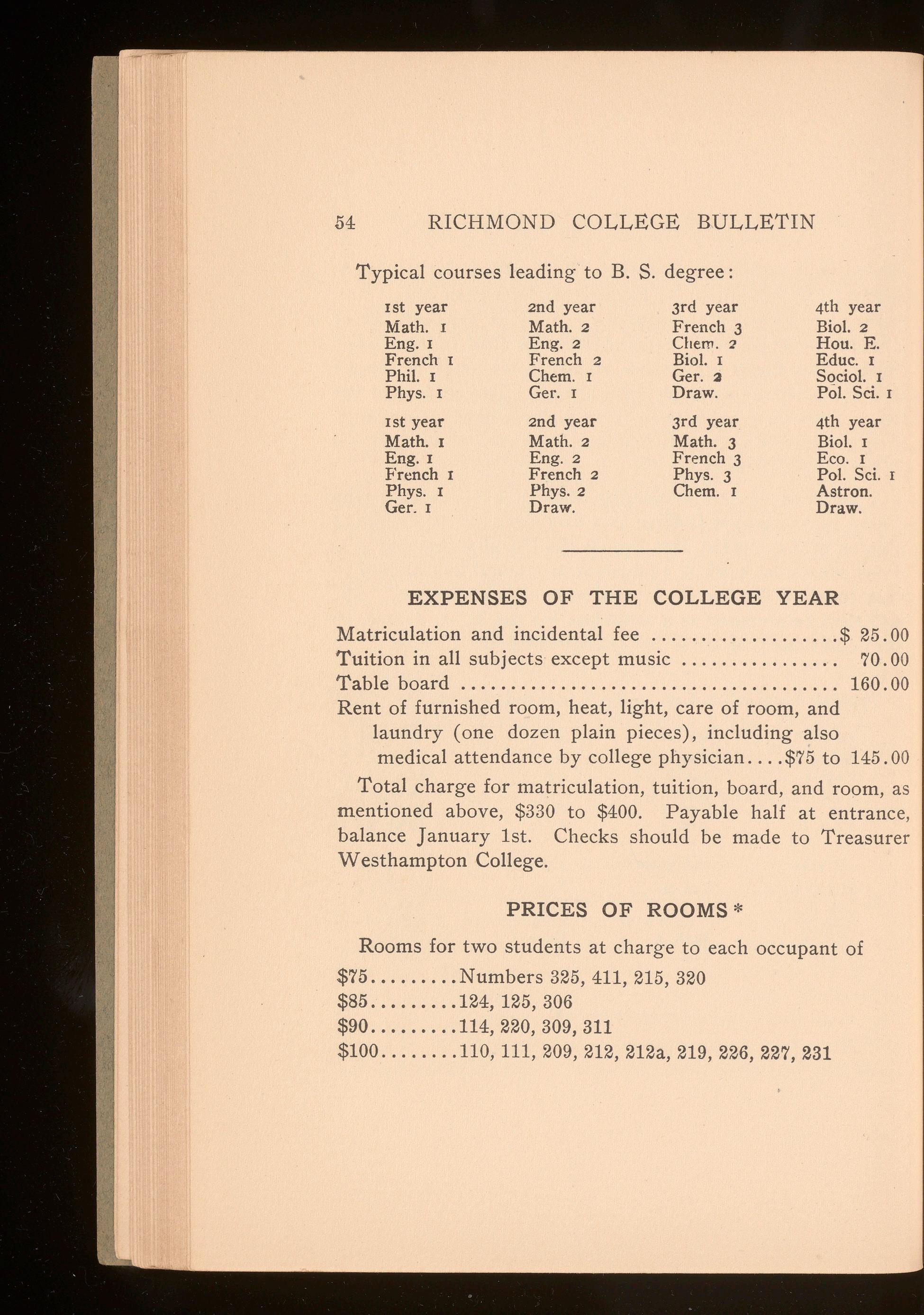
2nd year
Math. 2 Eng. 2
French 2
Chem. I Ger. I 2nd year
Math. 2 Eng. 2
French 2 Phys. 2 Draw.
3rd year
French 3
Chem. 2
Biol. I Ger. :a Draw.
3rd year
Math. 3
3
3
1
Matriculation and incidental fee ................... $
00 Tuition in all subjects except music
Table board
Rent of furnished room, heat, light, care of room, and laundry ( one dozen plain pieces), including also medical attendance by college physician .... $7 5 to 145. 00
Total charge for matriculation, tuition, board, and room, as mentioned above, $330 to $400. Payable half at entrance, balance January 1st. Checks should be made to Treasurer Westhampton College.
Rooms for two students at charge to each occupant of $75 ......... Numbers 325,411,215,320
$85 ......... 124, 125,306
$90 ......... 114, 220,309,311
$100 11~ 111,209,212, 212a, 219,226,227,231
WESTHAMPTON COLLEGE CATALOGUE 55
Rooms for one student at charge of
$75 ......... 401, 402,403,404,405,406,407,408,409,410
$85 ........ 312a, 316,317,318,319,321,323,324,325,326,411
$95 ......... 307, 310,315,322
$100 ........ 223, 224,301,302,303
$110 ........ 228, 229,217,218,221,222, 31~ 129,126
$120 ........ 109, 112, 112a, 116, 117, 118, 119, 121, 122, 123
$130 ........ 115, 120,210,214,305,314
$145 ........ 108, 216,230,304,308
Piano, Director .................................... $80 00
Piano, Associate Teachers.
Voice ............................................. 70 00
Pianos for practice one hour daily.
Laboratory fee, Chemistry, Biology, Physics, Home Economics, each
Diploma fee at graduation.
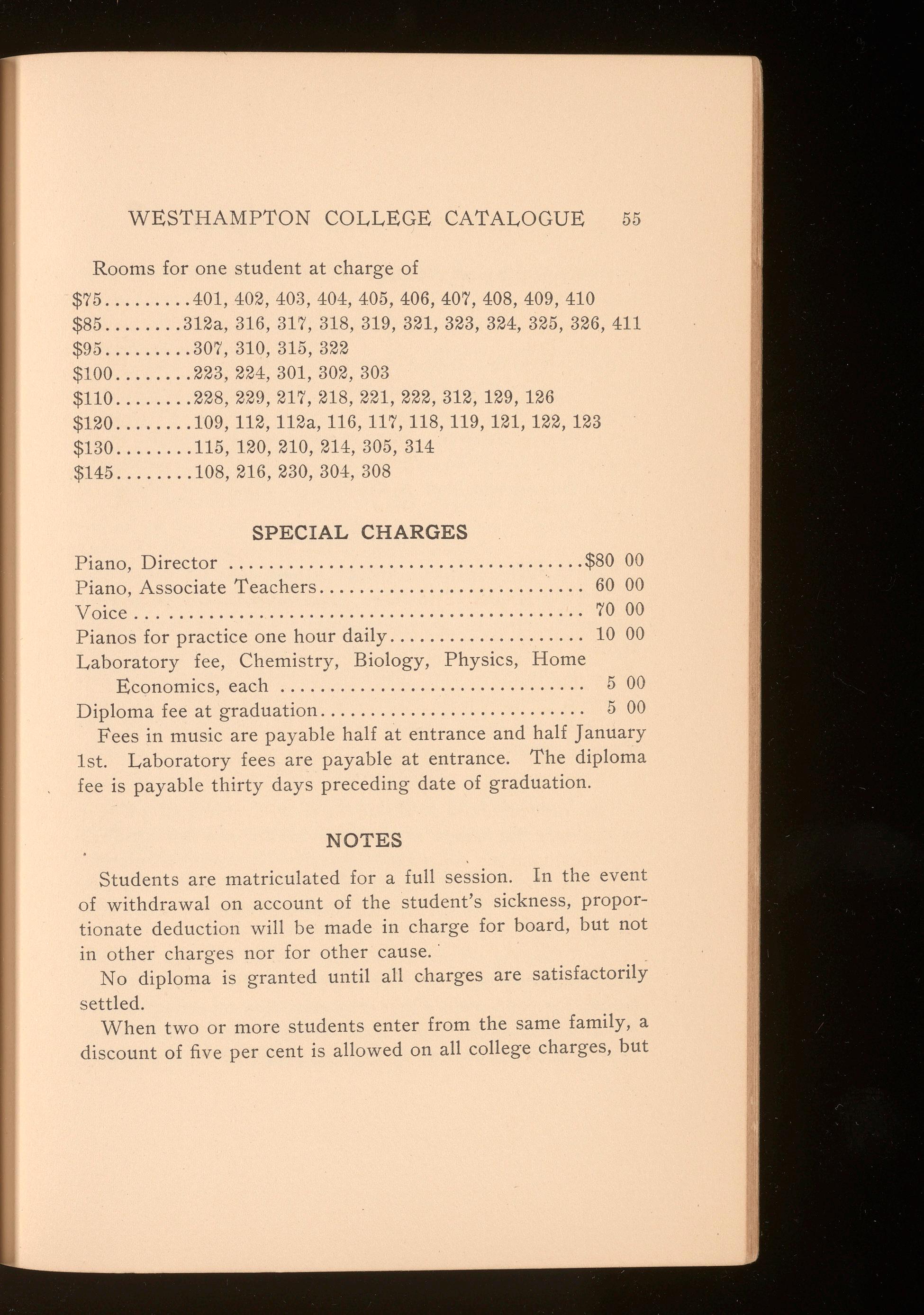
5 00
Fees in music are payable half at entrance and half January 1st. Laboratory fees are payable at entrance. The diploma fee is payable thirty days preceding date of graduation.
Students are matriculated for a full session. In the event of withdrawal on account of the student's sickness, proportionate deduction will be made in charge for board, but not in other charges nor for other cause. ·
No diploma is granted until all charges are satisfactorily settled.
When two or more students enter from the same family, a discount of five per cent is allowed on all college charges, but
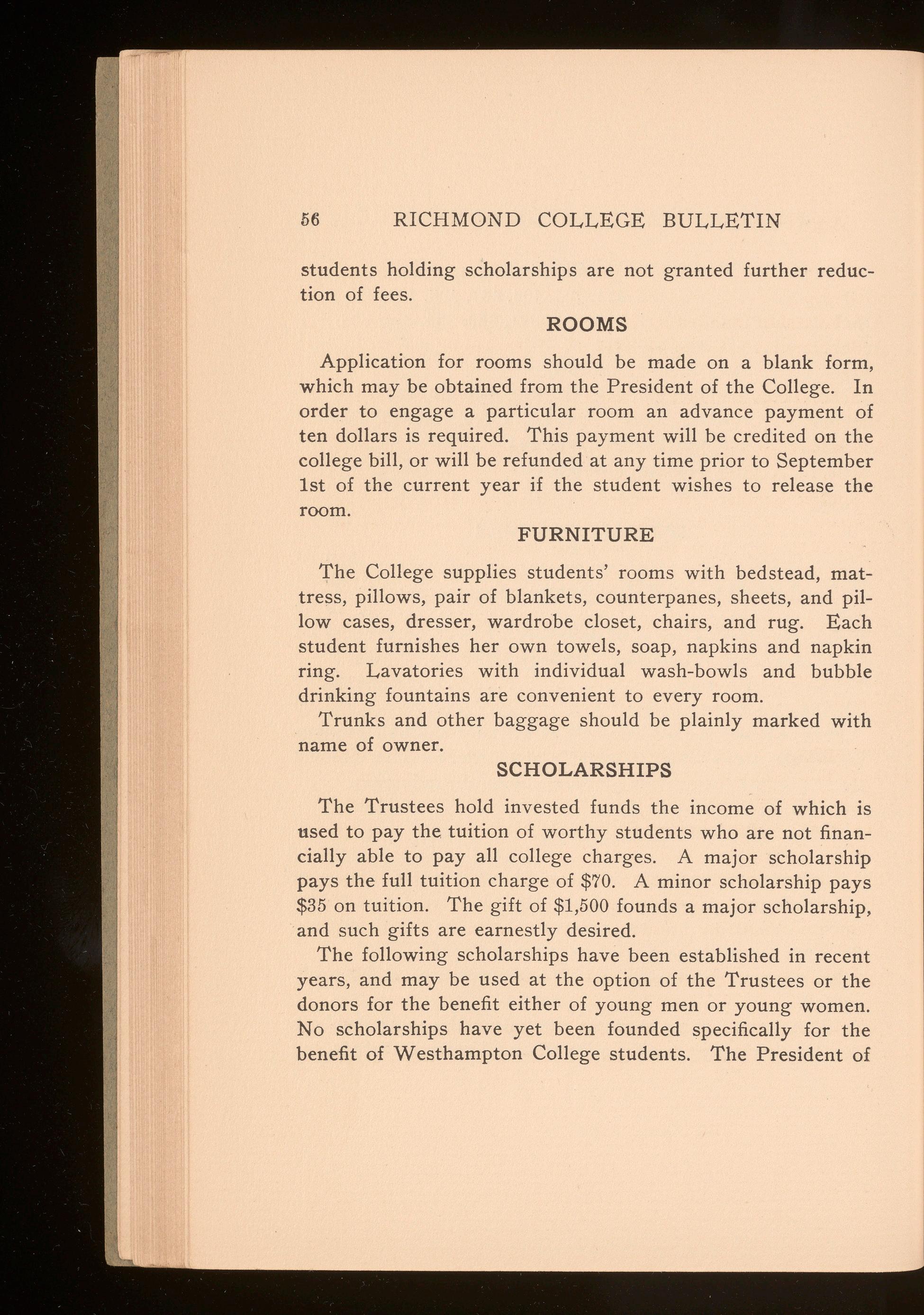
students holding scholarships are not granted further reduction of fees
Application for rooms should be made on a blank form, which may be obtained from the President of the College In order to engage a particular room an advance payment of ten dollars is required. This payment will be credited on the college bill, or will be refunded at any time prior to September 1st of the current year if the student wishes to release the room.
The College supplies students' rooms with bedstead, mattress, pillows, pair of blankets, counterpanes, sheets, and pillow cases, dresser, wardrobe closet, chairs, and rug. Each student furnishes her own towels, soap, napkins and napkin ring. Lavatories with individual wash-bowls and bubble drinking fountains are convenient to every room Trunks and other baggage should be plainly marked with name of owner.
The Trustees hold invested funds the mcome of which is used to pay the tuition of worthy students who are not financially able to pay all college charges . A major scholarship pays the full tuition charge of $70 . A minor scholarship pays $35 on tuition The gift of $1,500 founds a major scholarship , and such gifts are earnestly desired.
The following scholarships have been established in recent years, and may be used at the option of the Trustees or the donors for the benefit either of young men or young women No scholarships have yet been founded specifically for the benefit of Westhampton College students. The President of
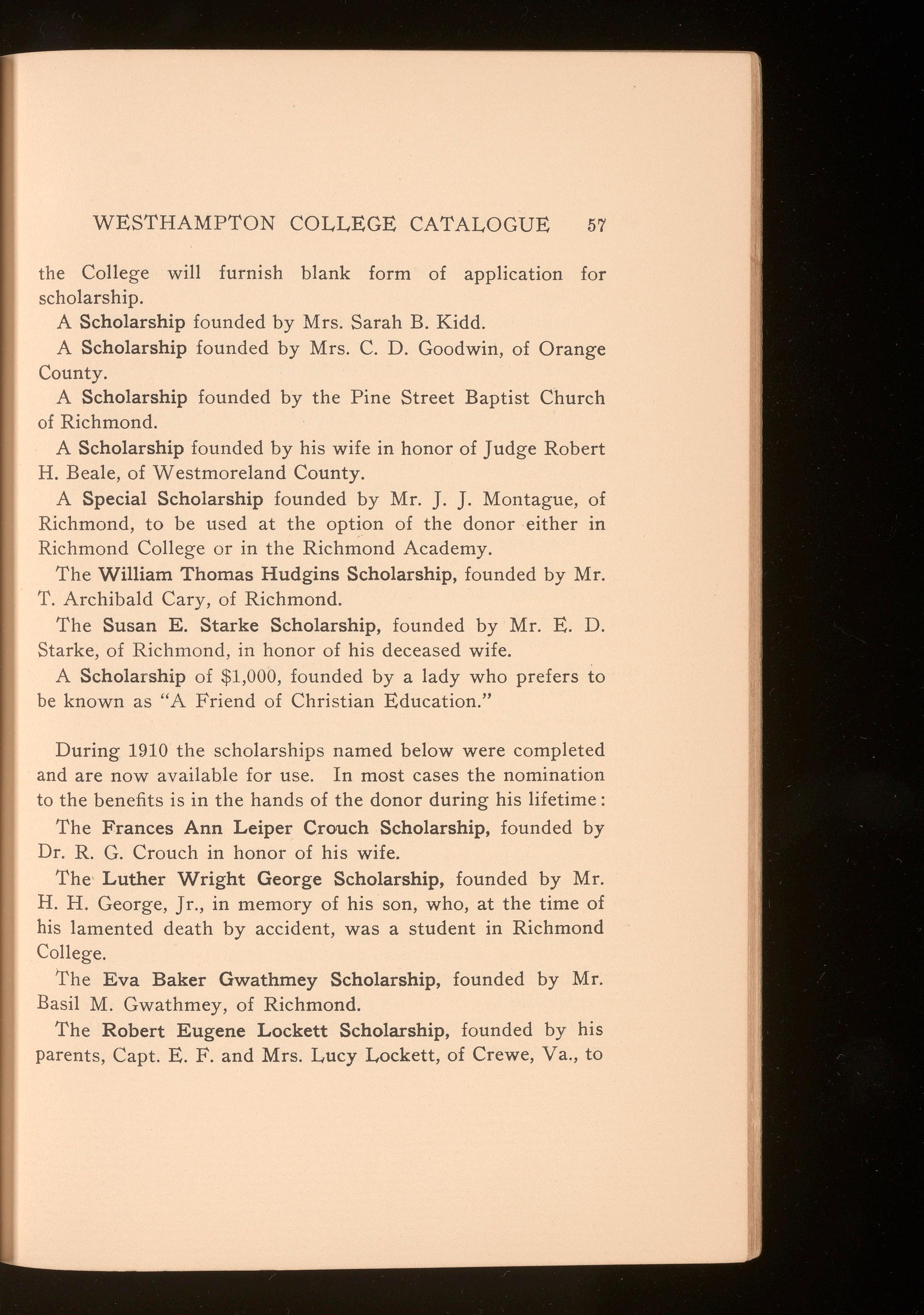
WESTHAMPTON COLLEGE CATALOGUE 57
the College will furnish blank form of application for scholarship.
A Scholarship founded by Mrs Sarah B. Kidd.
A Scholarship founded by Mrs. C. D. Goodwin, of Orange County.
A Scholarship founded by the Pine Street Baptist Church of Richmond.
A Scholarship founded by his wife in honor of Judge Robert H . Beale, of Westmoreland County.
A Special Scholarship founded by Mr. J. J. Montague, of Richmond, to be used at the option of the donor either in Richmond College or in the Richniond Academy.
The William Thomas Hudgins Scholarship, founded by Mr. T. Archibald Cary, of Richmond.
The Susan E. Starke Scholarship, founded by Mr. E. D. Starke, of Richmond , in honor of his deceased wife.
A Scholarship of $1,000, founded by a lady who prefers to be known as "A Friend of Christian Education."
During 1910 the scholarships named below were completed and are now available for use. In most cases the nomination to the benefits is in the hands of the donor during his lifetime:
The Frances Ann Leiper Crouch Scholarship, founded by Dr . R. G. Crouch in honor of his wife .
The · Luther Wright George Scholarship, founded by Mr. H. H. George, Jr., in memory of his son, who, at the time of his lamented death by accident, was a student in Richmond College .
The Eva Baker Gwathmey Scholarship, founded by Mr. Basil M. Gwathmey, of Richmond.
The Robert Eugene Lockett Scholarship, founded by his parents, Capt . E. F . and Mrs. Lucy Lockett, of Crewe, Va., to

honor the memory of their son, a former student of Richmond College.
A Scholarship established by Mrs. Mary E. Winch and Mrs. Kate R. Winch, of Richmond.
A Scholarship established by Mr. W. E. Harris, of Richmond.
A Scholarship established by Mr. P. A. Fore, of Richmond.
A Scholarship established by Mr. and Mrs. E. T. Ivey, of Newport News, Va.
A Special Scholarship founded by Mr. R. L. Barnes, of Richmond.
A Scholarship founded by Mrs. Martha P. Taylor, of Newport News, Va.
A Scholarship founded by Mr. Skye V. Straley, of Princeton, W. Va.
A Scholarship founded by Mr. John P. Branch, of Richmond, for the benefit of a student to be appointed by the stewards of Centenary Methodist Episcopal Church, Richmond, Va.
The John P. Branch Scholarship, founded by Mr. M. C. Branch, of Richmond.
The E. Carrington Cabell Scholarship, founded by Mr. H. L. Cabell, of Richmond, in honor of his brother, a distinguished alumnus of Richmond College.
The William F. Harwood Scholarship founded by Col. John S. Harwood and Mr. R. H. Harwood, in honor of their father.
The Alonzo L. Phillips Scholarship, $1,000, founded by the gentleman whose name it bears.
In 1911 the following scholarships and other aid funds were established :
The Sarah Jane Bagby Scholarship, founded by her son, Mr. Chas. T. Bagby, of Baltimore, Md.

The Appomattox Association Scholarship, established by the churches of the Appomattox Association.
The Simon Seward Scholarship, given by the gentleman whose name it bears.
The J. R. Paschall Scholarship, established by the gentleman whose name it bears.
The Mrs. E. A. Colston Scholarship, founded by her husband, and for the benefit of a woman student.
The William Fayette Fox Scholarship, established by the students and teachers of the Richmond Public Schools m honor of their beloved Superintendent.
The Milton Cayce Scholarship, founded by Mrs. Lelia G. Hutcheson in honor of her father.
The Raleigh C. Forbes Fellowship Fund of $3,000, established by Mr. and Mrs. W. S. Forbes, of Richmond, Va., in memory of their son.
In 1912 the following scholarships were completed and are now available:
The Sarah B. Watson Scholarship Fund of $2,500, founded by George B. West, of Newport News.
The Emma Lewis Bowe Memorial Scholarship of $1,000, founded by her father and mother, Mr. and Mrs. N. W. Bowe.
The Jessie Gresham Pollard Scholarship of $1,000, founded in honor of their mother by H. R. Pollard, Jr., and James J. Pollard.
The H. C. Taylor Endowment Scholarship of $1,000, founded by H. C. Taylor, of Black Ridge, Va.
The Henry Jones Memorial Scholarship, founded by his daughters, Mrs. Livius Lankford, of Norfolk, Va., and Mrs. W. C. Taylor, of Clarksburg, W. Va.
A Scholarship founded by the "Junior Aid Society," of Freemason Street Baptist Church, of Norfolk, Va.

In 1913 the following scholarships were established:
A Scholarship, founded by Miss Grace Arents, Richmond , Va .
A Scholarship, founded by R. S. Barbour, South Boston, Va.
A Scholarship, founded b y Frank B. Bell, Machipongo, Va.
A Scholarship, founded by Charles J. Billups, Richmond, Va., in memory of his father, L. W. Billups.
"The Sallie G. Bundy Memorial Scholarship," founded by J. G . Bundy, Tazewell , Va .
A Scholarship, founded by Bethel Church, Accomac Association.
A Scholarship, founded by Mrs Mattie E. Basher, Richmond, Va.
"The Mildred Bugg Scholarship," founded by her father and mother , Mr. and Mrs. B. L. Bugg , of Atlanta, Ga.
A Scholarship, founded by R. J. Camp , Franklin, Va.
The J. L. Camp Scholarship, founded by J. L. Camp, Franklin, Va.
The "Mrs. Carrie S. Camp Scholarship," founded by J. L. Camp, Franklin, Va.
The "P. D. Camp Scholarship," founded by P. D. Camp, Franklin, Va
The Mrs. P. D. Camp Scholarship, founded by P. D. Camp, Franklin, Va.
"The J. C. Carpenter Memorial Scholarship," founded by Mrs. J. C. Carpenter, Clifton Forge, Va.
Two Scholarships, founded by J. D. Carneal, Richmond, Va .
A Scholarship, founded by Chatham Church, Roanoke Association.
"The D. 0. Davis Memorial Scholarship Fund of $5,000," founded by his daughter , Miss Elizabeth Belle Davis, Richmond, Va.
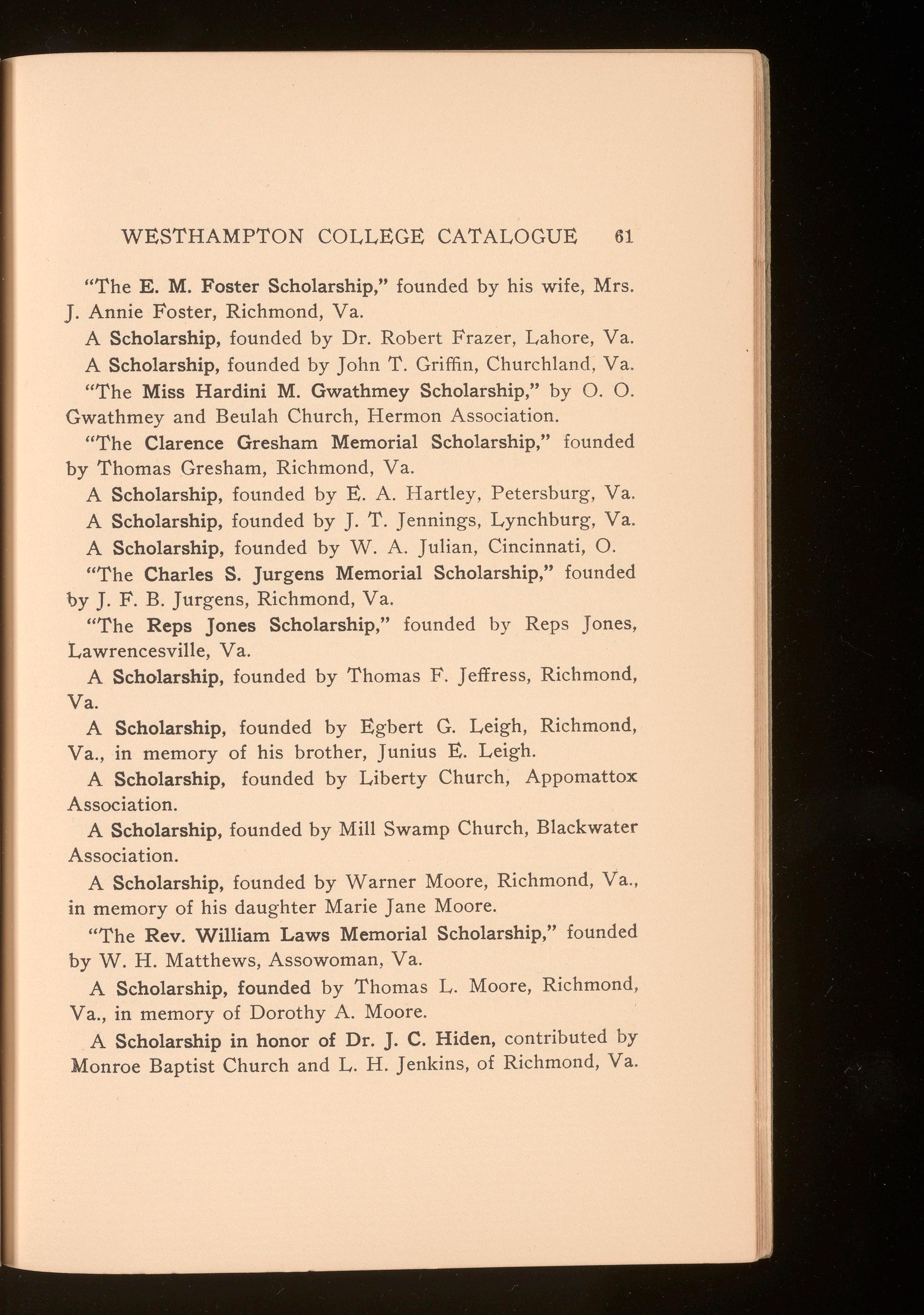
"The E. M. Foster Scholarship," founded by his wife, Mrs. J. Annie Foster, Richmond, Va.
A Scholarship, founded by Dr. Robert Frazer, Lahore, Va.
A Scholarship, founded by John T. Griffin, Churchland, Va.
"The Miss Hardini M. Gwathmey Scholarship," by 0. 0. Gwathmey and Beulah Church, Hermon Association.
"The Clarence Gresham Memorial Scholarship," founded by Thomas Gresham, Richmond, Va.
A Scholarship, founded by E. A. Hartley, Petersburg, Va.
A Scholarship, founded by J. T. Jennings, Lynchburg, Va.
A Scholarship, founded by W. A. Julian, Cincinnati, 0.
"The Charles S. Jurgens Memorial Scholarship," founded by J. F. B. Jurgens, Richmond, Va.
"The Reps Jones Scholarship," founded by Reps Jones, Lawrencesville, Va.
A Scholarship, founded by Thomas F. Jeffress, Richmond, Va.
A Scholarship, founded by Egbert G. Leigh, Richmond, Va., in memory of his brother, Junius E. Leigh.
A Scholarship, founded by Liberty Church, Appomattox Association.
A Scholarship, founded by Mill Swamp Church, Blackwater Association.
A Scholarship, founded by Warner Moore, Richmond, Va., in memory of his daughter Marie Jane Moore.
"The Rev. William Laws Memorial Scholarship," founded by W. H. Matthews, Assowoman, Va.
A Scholarship, founded by Thomas L. Moore, Richmond , Va., in memory of Dorothy A. Moore.
A Scholarship in honor of Dr. J. C. Hiden, contributed by Monroe Baptist Church and L. H. Jenkins, of Richmond, Va.

A Scholarship, established by an Alumnus of the Class of 1871.
A Scholarship in Memory of Mrs. Mary Jordan Miller, founded by John B. Miller, Sperryville, Va., and Robert E. Miller, Woodville, Va.
"The John E. Nottingham Scholarship," founded by John E. Nottingham, Franktown, Va.
A Scholarship, founded by the News-Leader of Richmond, Va.
A Scholarship, founded by A. W. Patterson, Richmond, Va., as a memorial to his daughter, Florence Dillard Patterson.
A Scholarship, founded by Red Bank Church, Accomac Association.
A Scholarship, founded by R. N. Stevens and E. A. Easley, Quinque, Va.
A Scholarship, founded by H. C. Stuart, Elk Garden, Va.
"The Hiram Smith Scholarship," founded by H. M. Smith, Jr., Richmond, Va.
A Scholarship, founded by Smithfield Church, Blackwater Association.
A Scholarship, founded by South Boston Church, Dan River Association.
A Scholarship, founded by Mrs. Annie G. Traylor, Richmond, Va.
"The Benjamin Cornelius Watkins Scholarship," founded by C. T. Watkins, Richmond, Va.
A Scholarship Fund of $5,000, founded by George B. West, of Newport News, Va., in memory of his parents, Parker and Mary West.
A Scholarship, founded by John T. Wilson, Richmond, Va.
A Scholarship, founded by John W. Wood, Linden, Va.
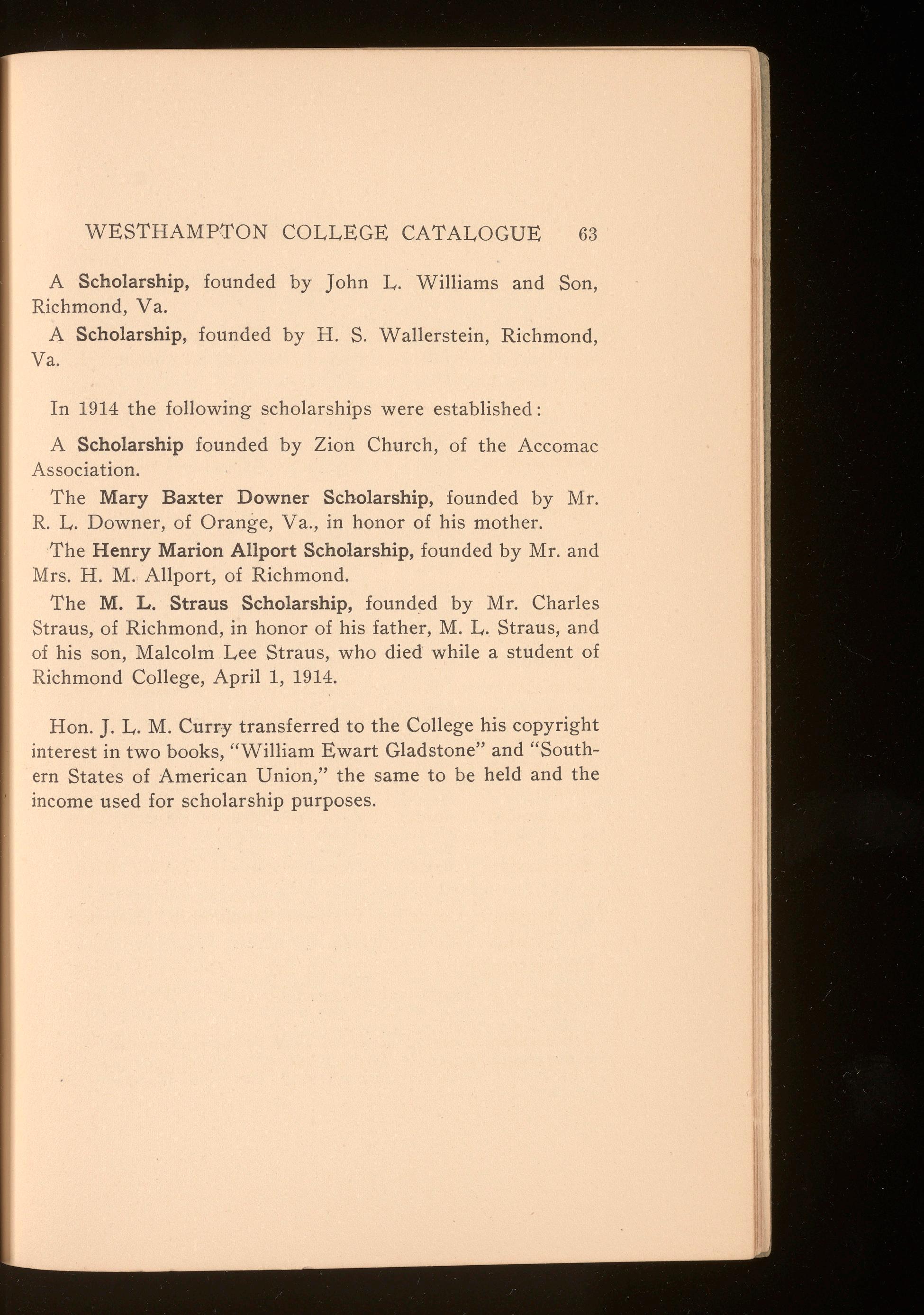
A Scholarship, founded by John L. Williams and Son, Richmond, Va.
A Scholarship, founded by H. S. Wallerstein, Richmond, Va.
In 1914 the following scholarships were established:
A Scholarship founded by Zion Church, of the Accomac Association.
The Mary Baxter Downer Scholarship, founded by Mr. R. L. Downer, of Orange, Va., in honor of his mother.
The Henry Marion Allport Scholarship, founded by Mr. and Mrs. H. M. , Allport, of Richmond.
The M. L. Straus Scholarship, founded by Mr. Charles Straus, of Richmond, in honor of his father, M. L. Straus, and of his son, Malcolm Lee Straus, who died while a student of Richmond College, April 1, 1914.
Hon. J. L. M. Curry transferred to the College his copyright interest in two books, "William Ewart Gladstone" and "Southern States of American Union," the same to be held and the income used for scholarship purposes.
Mon. Tues Wed. Thur. Fri. Sat .

9 to 9 :50
Eng. 4
Ger. 2 Phil. 2
Educ. I Math I Span. I Phil. I Ger I
Eng 4
Ger. 2 Phil. 2
Educ. I
Math. I Span. I Phil. I Ger. I
Eng 4
Ger . 2 Phil. 2
Educ. I
Math. I Span. I Phil. I Ger. I Lat. 3
ro to ro :so II :20 to I2:ro
Eng 2 Eng 3
French I Span . 2
Hist. 4 Phys. 2
Soci . I Math . I
Math. 3
Phys. I Hist. I Econ. I Grk. 2
Eng 2
French I Hist 4
Soci I
Math. 3 Phys. I Hist I Econ I Grk 2
Eng . 2
French I Hist. 4
Soci. I Math 3 Phys 1 Hist . 1
Econ. I Grk. 2
Eng. I Lat. I Chem. I French 3
Eng . 3 Span . 2 Phys. 2 Math. I
Eng. I Lat r Chem . 1 French 3
Eng. 3 Span. 2 Phvs . 2 Math I
Eng. I Lat. I Chem I Educ. 2 French 3 12:20 to 1 :ro 2 to 2 : 50
Lat. 2 Eng. I French. 2 Grk. I Chem. 2. Bid. 2
Pol. S I Hist. 2 Phil. 3
Grk. 3
Biol. 1
Math 2
Astron . I
Lat 2
French. 2 Chem 2 Pol. S. I
Grk 3
Biol. I Math. 2 Astron . I
Lat. 2
French . 2 Chem. 2. Pol. S. I
Grk. 3 Biol. I Math 2 ~tron. I Ger 3
Lat . 3 Ger . 3 Dom. S I
Eng. r Grk. r Biol. 2 Hist . 2 Phil. 3
Lat. 3 Ger. 3 Dom S. 1
Eng. I Grk. I Biol. 2 Hist. 2 Phil. 3
Lat. 3 Ger . 3 Dom. S. 1
The following classes will come at the same time in alternate year s: Pol. S. I and 2; Hist 2 and 3; Hist 4 and S ; Chem 2 and 3 ; Biol. 2 and 3; Phys. 2 and 3 ; Phil. 3 and 4.
The Regular Laboratory Hours for P hysics, Chemistry , Biology an d Psychology are as follows : Physics Ia Monday and Wednesday, 9 to II.
Chemistry Ia Monday and Wednesday, 2 to 4
Biology Ia Tuesday and Thursday, 2 to 4.
Philosophy 2a Tuesday, 2 to 4.
It is expected that all laboratory work in these courses will be don e in the assigned hours.
Laboratory Hours for more advanced courses will be assigned at the opening of the session
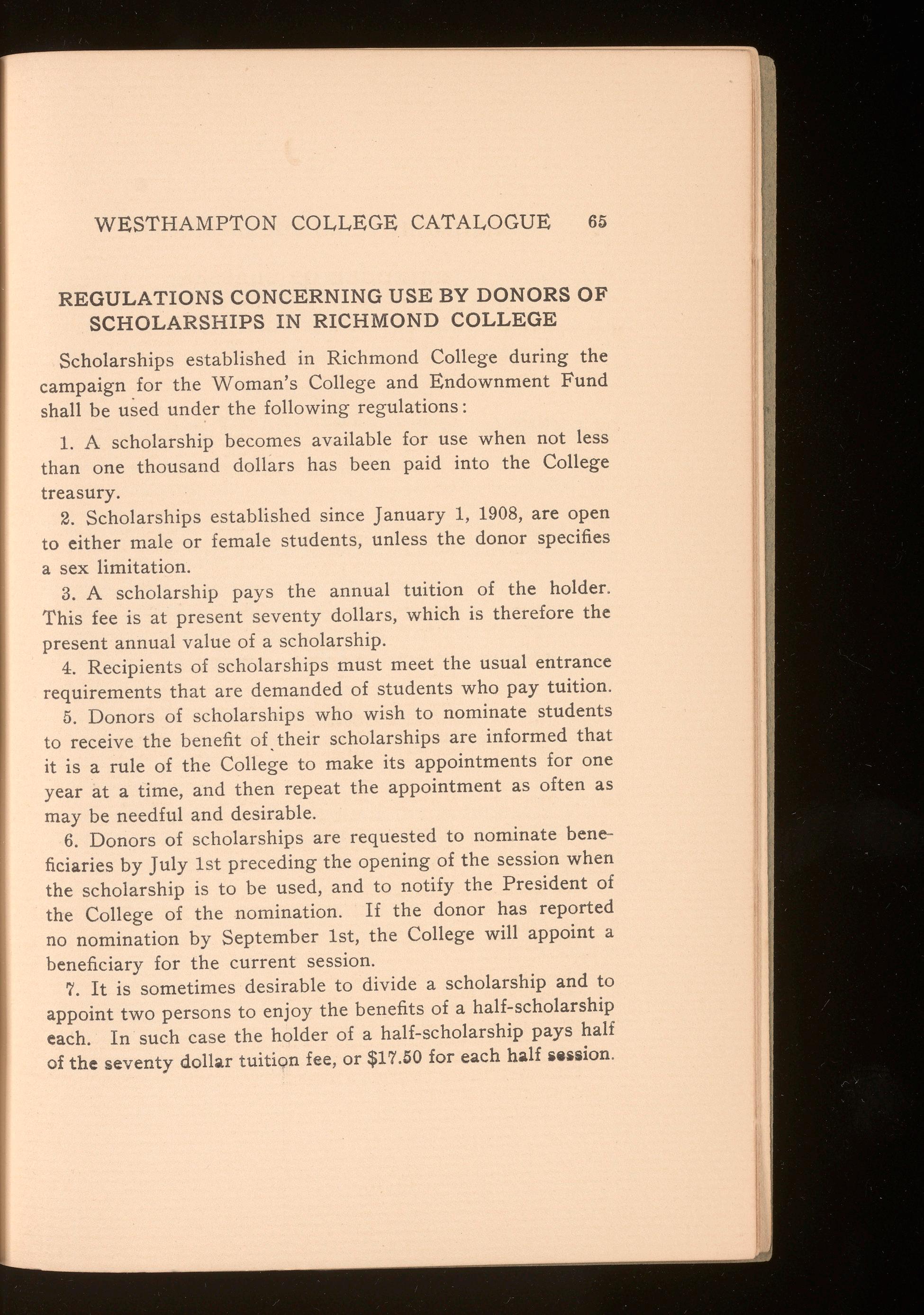
Scholarships established in Richmond College during the campaign for the Woman's College and Endownment Fund shall be used under the following regulations:
1. A scholarship becomes available for use when not less than one thousand dollars has been paid into the College treasury.
2. Scholarships established since January 1, 1908, are open to either male or female students, unless the donor specifies a sex limitation.
3. A scholarship pays the annual tuition of the holder. This fee is at present seventy dollars, which is therefore the present annual value of a scholarship.
4. Recipients of scholarships must meet the usual entrance requirements that are demanded of students who pay tuition.
5. Donors of scholarships who wish to nominate students to receive the benefit of_their scholarships are informed that it is a rule of the College to make its appointments for one year at a time, and then repeat the appointment as often as may be needful and desirable.
6. Donors of scholarships are requested to nominate beneficiaries by July 1st preceding the opening of the session when the scholarship is to be used, and to notify the President of the College of the nomination. If the donor has reported no nomination by September 1st, the College will appoint a beneficiary for the current session.
7. It is sometimes desirable to divide a scholarship and to appoint two persons to enjoy the benefits of a half-scholarship each. In such case the holder of a half-scholarship pays half of the seventy dollar tuitiQn fee, or $17.50 for each half sei.sion .

8. Reports of students' class and examination standing are mailed at regular intervals to parents or guardians, and a transcript of a beneficiary's report will be mailed to the donor of a scholarship, provided request is made at the President's office.
The committee in charge has general instructions, in making its award of all Aid Funds, to give the preference:
I. To applicants already at College, who have maintained a good standing, both in character and study.
II. To other fully prepared applicants who shall present satisfactory testimonials from the school last attended, or from other persons who have had opportunity to judge, certifying to their health , attainments, habits of study and moral character.
III. To those of either class who give reasonable assurance that they will complete a course of study leading to one of the degrees of the College.
The recipient s of aid are expected to prove, as student s , not only above censure in all respects, but actively helpful to the College by example and by earnest work.
WESTHAMPTON COLLEGE CATALOGUE 67
Anderson, Celeste .............................. Richmond
Anderson, Verna R. ........................ Newport News
Baldwin, Louise K. ............................ Richmond
Bland, Kathleen . . . . . . . . . . . . . . . .... West Point, Va.
Bryce, Jeanette ................................ Richmond
Clendon, Margaret L. . .......... , ............... Richmond
Crump, Virginia L. . ............................ Richmond
Dietz, Frieda M. . .............................. Richmond
Dillon, Audrey F. . ............................. Richmond
Du Val, Elizabeth E. ......................... Vinita, Va.
Elliott, Ruth E. . ........................ South Boston, Va.
Ford, Ruth I. .................................. Richmond
Gary, E. Hazel ................................. Richmond
Gay, Constance M ............................... Richmond
Goepfarth, Laura L. . ........................... Richmond
Gray, Elizabeth M .............................. Richmond
Gwaltney, Olivia J ..........................

Smithfield, Va.
Harding, Lillian B ............................. Richmond
Harris, Cornelia ................................ Richmond
Harris, Eloise J. . ............................... Richmond
Hart, Mildred B ..............................
Ashland, Va.
Harris, Ruth .................................. Richmond
Hawkins, Blanche T. . .......................... Richmond
Holleman, Gladys H ........................
Smithfield, Va.
James, Margaret E. . ............................ Richmond
Johnson, Gladys W ............................. Richmond
Levy, Clare M .
Martin, M. Louise ..
Michie, Margaret E
Monsell, Helen A. .....
Monteiro, Margaret K. ..
Holland, Sallie ·will s .......
Jinkins, Emily ...
Jinkins, Emma T. ..........
Johnston, Lulie G. .
Pearce, Rachel R. ..
Copenhaver, Eleanor . ..
Phipps, Nellie .....
Shine, Mary C
Sellers, Hattye G. ...
Smith, Dorothy E
Smith, Mary Delia . .........
Smith, Florence E.
Smither , Ethel L.
Spiers, Alice F. . ..
Spratley, Elizabeth P
Stiff, Irene E. . .....
Straus, Bessie ..
Sydnor, Nannie A. . .
Tanner, Louise M
Woodward, Norma 0

Richmond
.. Toano , Va .
N ewport News
Richmond
.. Richmond
W ilmington, Va
... Ashland, Va.
. ... Ashland, Va .
....... Richmond
Richmond
.. ... Marion, Va .
Clintwood, Va.
... Richmond
.. Richmond
. Bon Air, Va
... Richmond
Richmond
Richmond
.. Richmond
... Richmond
.. Richmond
. Richmond
Richmond
... Richmond
.. Richmond
